Sanders to lead Admission
By Davis Marks and Chloe Park

Chris Sanders will take over as Director of Admission and Enrollment in July, according to President Rick Commons. Sanders, who is currently the Director of Admission and Financial Assistance at Francis Parker School in San Diego, will replace Interim Head of Admission and Enrollment Greg Gonzalez. Gonzalez is temporarily filling the role after former Head of Admission and Enrollment Aaron Mieszczanski left the school to join executive search firm Spencer Stuart.
Commons said Sanders made a positive impression on the faculty he met with because of his friendly personality and expertise in his field.
“In [Sanders’] conversations with the Admission Team, the Leadership Team and many others, he struck all of us as having both the professional skills and personal qualities necessary for success in this important leadership role,” Commons said. “I think prospective families meeting Mr. Sanders will have the feeling right away that this is a place of excellence, opportunity and belonging.”
Sanders earned his bachelor’s degree from Harvard University and his master’s degree from the Wake Forest University School of Business. Before entering independent school admission, Sanders served as Director of Leadership Opportunities for a non-profit college access program for low-income and first-generation students.
Sanders said he is excited to join the community and admit future classes of students.
“It’s an honor to be welcomed into a community that cherishes excellence and provides a transformational educational experience for all students,” Sanders said. “I am fortunate to join a school that promotes students’ academic and social development, while simultaneously emphasizing one’s responsibility to care for and support others. Harvard-Westlake has a strong foundation, and I look forward to enrolling curious and kind students.”
Teachers respond to ChatGPT
By Saisha Kumar and Tate Sheehy
The History Department released an official statement prohibiting the use of artificial intelligence (AI) on assignments in response to the emergence of AI program ChatGPT on Jan. 15.

As of Feb. 4, the English, Math, Science and Language Departments have yet to publicize formal language regarding the use of AI on assignments.
STANDING UP WITH SIGNAGE: In response to the multiple antisemitic vandalism incidents this year, members of the Jewish Club posted signs around campus meant to spread awareness about antisemitism.

School searches for suspects after fifth antisemitic vandalism incident
By Natalie Cosgrove and Davis Marks
The school administration filed a police report and has increased surveillance on campus after a Nazi symbol was found poked into a bulletin in the student lounge on Jan. 23, the fifth in a series of antisemitic incidents over the past five months. The school administration said they are working to narrow down a list of possible suspects, and that once found, the perpetrator or perpetrators will receive harsh punishment, according to President Rick Commons.
The four previously reported incidents occurred in various locations across campus. In September, a swastika was found drawn onto a whiteboard; in October, the words “Hitler Rocks” and several swastikas were found carved into a desk; and in December, “swastika-like symbols” were found scratched into two desks in the same classroom, according to Commons.
Head of Upper School Beth Slattery said the school’s security team filed the police report and that she would consider pressing charges if a perpetrator is found.
“Security [filed a police report] since they are the liaison with law enforcement,” Slattery
said. “If we were to find out who is responsible for the incidents, I would certainly consider pursuing it criminally since, as far as I understand, it would be considered a crime.”
Commons said while the school does not know who is responsible for the swastikas, he believes it may be one person.
“We don’t know who [is doing this],” Commons said. “It could be that it’s multiple people, but it doesn’t seem that way. It feels like it’s one person who, either because that person is rebellious, angry or hateful, has decided to do this. [However], we don’t know what the motivation might be. As long as I’ve been in schools, kids write things on desks that are intended to provoke administrators, but when the swastika is involved, I don’t think we have any choice but to react seriously.”
Slattery said while she believes some of the incidents may have been committed by the same person, more recent incidents may be different students trying to emulate earlier vandalism.
“Given that two of them were found in the same room, I would
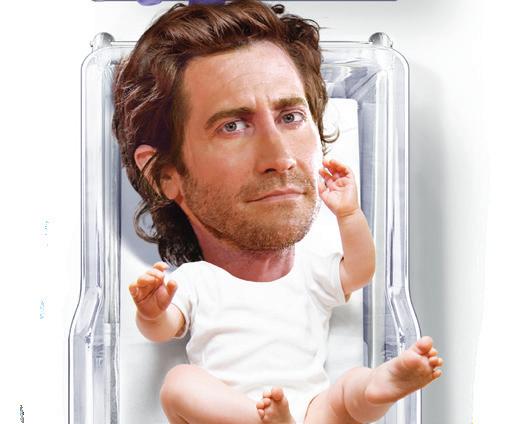
speculate that those were done by the same person, but there’s no way to be sure,” Slattery said. “It feels possible to me that the most recent ones were a copycat after the attention received by the initial carving, but again, I can’t be sure.”
Commons said because of the multiple attempts to spread awareness about the harm the swastikas cause, the punishment for the culprit will be severe and potentially include expulsion.
“I think after the first incident that we made public, it would be very hard for any student to have missed how upsetting it was to our community,” Commons said. “I then spoke to class meetings after [the third and fourth incidents], so for someone in the aftermath of that secondary explanation of how hateful this is to have continued to do it strikes me as deserving of severe consequences if we were to find that person. I think expulsion is on the table, and in certain situations, I reserve the right to bypass the Honor Board and make a decision in conjunction with my colleagues to make a more swift decision.”
• Continued on A4
ChatGPT is an AI chatbot created by Open AI in Nov. 2022 It is capable of formulating essays, writing code and answering questions when prompted to do so. ChatGPT presents a threat to conventional learning because it is able to create nearly instantaneous responses to complex questions, interfering with students’ learning, according to AP News. It may also provide users with inaccurate information, according to OpenAI.
The History Department’s statement reads, “The History/ Social Studies Department does not support the use of ChatGPT and other AI platforms for any purpose. The use of these platforms is considered unauthorized aid under the Honor Code; thus, any preparation for the course and any submitted work for the course that are generated through or are informed by ChatGPT or other AI platforms are in violation of and subject to consequences under the Honor Code.”
President Rick Commons said although he believes restricting the use of ChatGPT on assignments is currently possible, it will ultimately become a part of the curriculum.
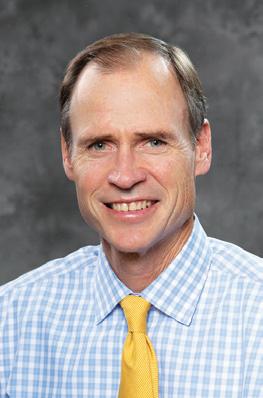
“I think that we are going to have to figure out how to use the ChatGPT and other artificial intelligence in the process of teaching,” Commons said. “I don’t think we’re going to be able to long-term avoid or ban it. I don’t blame the History Department for essentially banning it for now. I don’t think they can ban it for all time. I think they’ve got to ban it for now while they figure [it] out.”
Nap Time for Nepos: Students discuss how nepotism affects their personal lives and the school’s culture.
Art and Writing Awards.
In It To Win It: Boys basketball wins the Mission League Championship and advances to the CIF-SS playoffs.
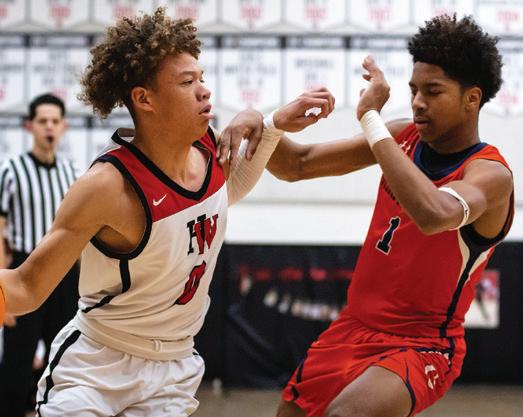
Reserve Your Ticket: “Urinetown,” the school’s winter musical, is holding performances on Thursday, Feb. 16, Friday, Feb. 17 and Saturday, Feb. 18. Reserve a free ticket using the QR code.

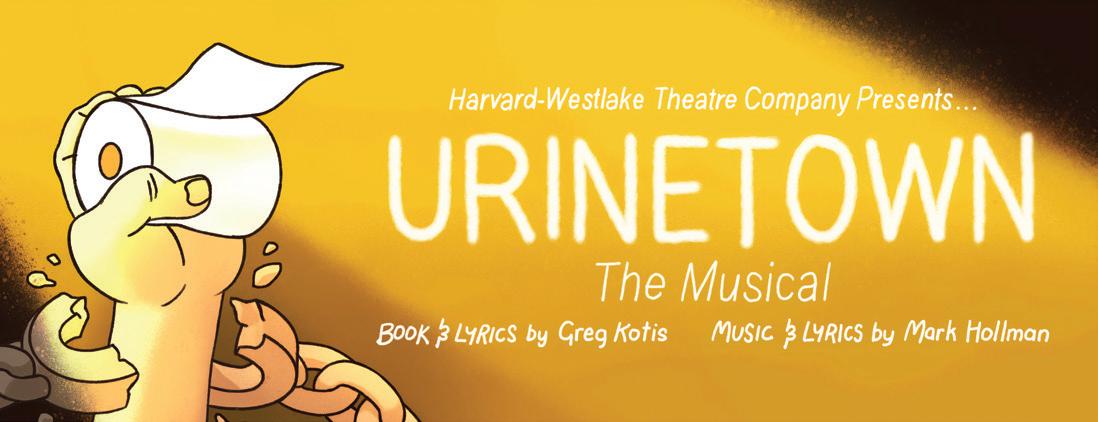 PRINTED WITH PERMISSION OF OLIVIA SUDDLESON
PRINTED WITH PERMISSION OF OLIVIA SUDDLESON
Harvard-Westlake • Studio City • Volume 32 • Issue 5 • Feb. 8, 2023 • hwchronicle.com INTHIS ISSUE
• Continued on A3 D2 Admirable Art: Students share their art that received recognition in the Scholastic
Continued on A2
•
C3 B6
L. Wood Rick Commons
Departments create ChatGPT policies
History Teacher Katherine Holmes-Chuba said using ChatGPT and AI is cheating because the program, not the student, generates ideas.
“For people in the humanities, it ultimately is plagiarism because even though an AI is doing it, it’s not your ideas, and by going to ChatGPT, you’re not thinking about the material, and you’re just taking the easy way out,” Holmes-Chuba said. “It worries me a little because I always think that one of our strengths [as teachers] is teaching students how to think for themselves.”
Head of Upper School Beth Slattery said discussions of reducing take-home assignments prior to the introduction of AI.
“There were a lot of discussions prior to ChatGPT about takehome assignments because some students were already submitting over-tutored assignments, which is both unethical and inequitable since not everyone has access to tutoring,” Slattery said. “It really doesn’t serve anyone in the long run to cheat on take home assignments, but because we know that is happening, we may reduce those kinds of assignments.”
Director of Instructional Technology Jeff Snapp hosted an informational session for faculty on Zoom to discuss the threats presented by new technology like ChatGPT on Jan. 18.
Snapp said ChatGPT could disturb a student’s ability to learn and develop important skills.

“Every teacher wants all of their students to articulate their thoughts, weigh evidence and refine critical thinking skills, so they develop assignments that give students the opportunity to practice becoming better communicators,” Snapp said. “The emergence of and ease of access to language-based AI threatens to provide students with a crutch that robs them of the opportunity to practice these skills. When students make choices to go outside the parameters established for assignments and use unauthorized aid, the consequences extend beyond just the grade they receive.”
Snapp said although some students and teachers may struggle to grapple with the new technology, they will eventually realize its importance and potential.
“New technologies have emerged throughout history and were not initially welcomed,” Snapp said. “While [AI] will be disruptive and uncomfortable for some people, new opportunities and capabilities will emerge. One day, we’ll look back and laugh in wonder at how we were able to survive without our AI tools.”
Mathematics Teacher Andrew Theiss said he thinks AI has the potential to be helpful when used in the right circumstances.
“The last thing we should do is consider it a threat to education,” Theiss said. “We have to view it as a tool that can be used to support student learning and improve their skills.”
• Continued
Ross appointed Head of School
By Davis Marks and Chloe Park
Associate Head of School Laura Ross will become Head of School in July, according to an email sent by President and Head of School Rick Commons on Jan. 3. Following the change, Commons will serve solely as President.
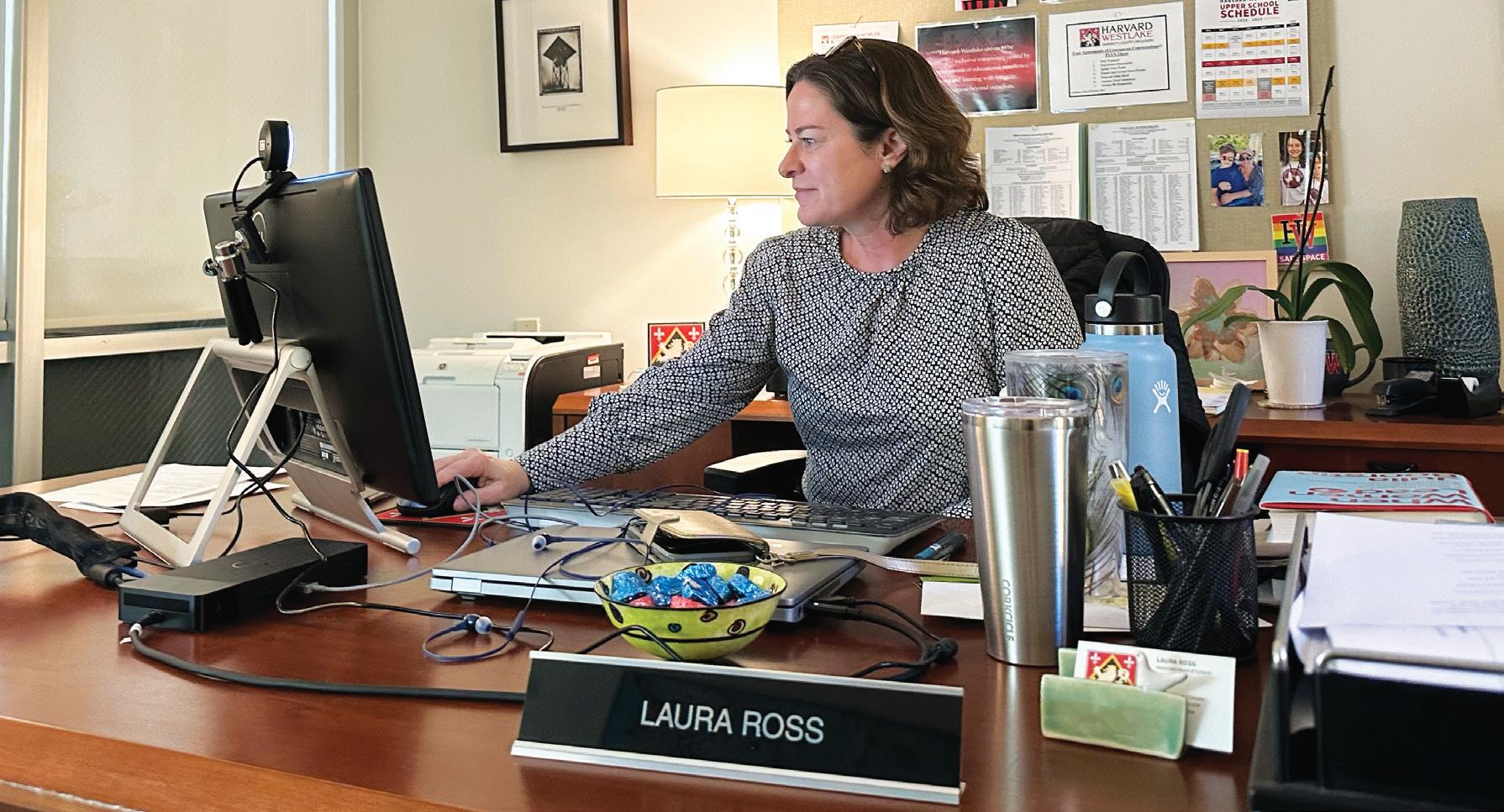
This change is a return to the school’s previous leadership structure, when Commons was hired as President during former Head of School Jeanne Huybrechts’s tenure. After Huybrechts’s retirement in 2017, Commons assumed the responsibilities of Head of School.
In the email, Commons said the adjusted leadership framework will lead to more effective school management while also allowing upper administration to be involved in the student experience.
“This two-person President [and] Head of School structure will best position us to pursue our
strategic visions, lead our school community on what will soon be three campuses and manage the complexities of one of the largest independent schools in California,” Commons said. “While the new structure will allow each of us to focus additional energy where it can be most impactful, I intend to maintain my close connection to the student experience, continuing to partner not only with Laura but also with our extraordinary division heads and showing up as always at classes, games, performances and lunch tables.”
Ross said because she and Commons currently delegate administrative work between them, her job responsibilities will generally remain the same.
“From our perspective, frankly, not much is going to change in terms of the way we’ve worked together,” Ross said. “We previously had delineated our different roles, in which I work on things
like student support, DEI [diversity, equity and inclusion], the new schedule and professional development, while Mr. Commons works on things like advancement and external relations.”
Commons said he and the Board of Trustees are confident in Ross’s skill and leadership, and he is eager for Ross to step into her new role.
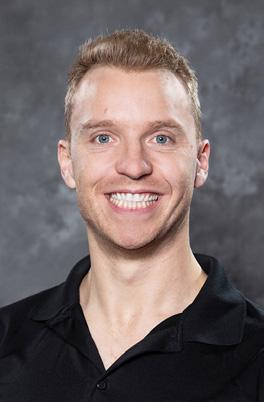
“[Ross] and I began talking about this in the fall as a way of both recognizing the work that she was already doing and giving more opportunity for her to exercise her excellent leadership in ways that will continue to transform our school,” Commons said. “The Board, recognizing [Ross’s] unique strengths, was very excited about the possibility of her not only continuing to exercise leadership here, but staying at Harvard Westlake, [as] she is highly sought after by independent schools.”
School expands upper school dean program
By Connor Tang and Justin Tang
Two new deans will be added at the start of the 2023-2024 school year, according to Head of Upper School Beth Slattery. All current students at the upper school will keep their deans, but future students will be split up among the 11 deans equally.
Unified course surveys rolled out
By Iona Lee and Hannah Shahidi
Upper school students completed surveys for each of their courses during January, the first time the administration has conducted a universal survey instead of ones created by individual teachers. Through the school’s website, students answered the same questions for each course and left written feedback about class curriculums and teacher instruction.
Director of Institutional Research Mike Barker was hired by the school in 2020 to collect data to improve various aspects of school life. Barker said while creat-
ing the surveys, the main goal was to improve course curriculums.
“The overall initiative is to use a standard survey to ask students questions about their experience in the courses,” Barker said. “I think it’s really important that students have an opportunity to express how they’re enjoying the course and how the course can be improved [and] how their teacher is teaching. The form is also helpful to the teacher in terms of trying to make the course better. The basic effort is just to help improve the learning experience with the students.”
According to Barker, the survey questions were developed
by a team of over 40 teachers. Barker said the team created the questions with certain teaching principles in mind.
“[The surveys were] created with the help of about 40 to 45 teachers who had direct input into how the questions are structured,” Barker said. “In the last year or two, teachers have been developing a set of principles that articulate what is good teaching. So the questions aren’t just a set of questions we think are important, they’re actually measuring important things that the faculty has articulated as good teaching.”
President Rick Commons said the expansion of the upper school dean program will provide students with more resources to support their mental health.
“We are acutely aware that student health and wellness is at risk,” Commons said “It’s our commitment and vision to try and make a difference by making sure that students are attended to by people at school, not just their teachers or coaches, but by deans.”
Commons said the expanded dean team would also help juniors and seniors with college admissions and sophomores with the transition to the upper school.
“One of the things that the addition of deans is intended to do is to help students and families in the college admissions process even more,” Commons said. “In the fall, the deans have a heavy load with the seniors [applying for college], and it’s hard for them to also attend to the needs of juniors, much
less sophomores. Sophomores are brand new at the Upper School, and in trying to understand the level of expectation and the academic work, we are trying to reduce the ratio [of students to deans] and make sure there is enough attention paid to all Upper School students, especially sophomores, who in the fall are left in many cases to figure it out for themselves.”
Upper School Dean Jamie Chan said the new deans will help meet the demands of students and families and ease the workload among Upper School deans.
“We’ve always been looking at how we can be better and how we can serve our students’ and families’ needs better,” Chan said. “In addition to the growing mental health concerns, the bigger classes and the college piece always looming, it can be tough. We just realized that the deans are doing a lot of things, and we want to be able to give families more time and accessibility.”
Upper School Dean Teneice Wesson said hiring two new deans will help establish stronger relationships between the deans and their students.
“Each dean currently has around 30-35 students,” Wesson said. “Having fewer caseloads means you have more time to support each student.”
L. Wood Andrew Theiss
DAVIS MARKS/CHRONICLE • Continued from A1
ROSS RISING UP: Associate Head of School Laura Ross will begin serving as Head of School in July. Prior to becoming Associate Head of School in July 2020, Ross was Head of Upper School from 2017 to 2020.
NATASHA SPEISS/CHRONICLE • Continued on hwchronicle.com • Continued on hwchronicle.com The Chronicle Feb. 8, 2023 News A2 • Continued on hwchronicle.com
SPEAKING THEIR MINDS: Jacob Massey ’25, Elliot Lichtman ’23, Hugh Cheng ’25 and Sophomore Prefect Eric Lee ’25 take the new unified course survey on their laptops, allowing them to give feedback on their teachers.
on hwchronicle.com
School hires Sanders
• Continued from A1
With the appointment of Sanders as Head of Admission and Enrollment, Gonzalez will return to his former role as Director of Financial Aid and History Teacher. Gonzalez said Sanders’ ability to connect to a school’s community will be greatly beneficial in his new role at the school.
YEAR OF THE RABBIT: ASiA honored Lunar New Year by covering the Quad in red and festive decorations and offered a variety of activities and food for those who attended the festival. They gave rewards including stuffed animals and candy to people who participated in the event.
ASiA hosts annual Lunar New Year festival
By Alex Dinh and Nathan Wang
Asian Students in Action (ASiA) hosted their annual Lunar New Year Festival on the Quad on Jan. 23. Lunar New Year is a commonly celebrated holiday in many Asian cultures and is the beginning of the Lunar calendar.
ASiA’s Lunar New Year festival featured Chinese, Hawaiian, Korean and Vietnamese food. The event also included Lunar New Year-themed games and cultural activities like calligraphy, origami, chopstick races with M&M’s,
a partner spicy ramen challenge and a photo booth. For each activity, ASiA awarded participants a stuffed rabbit for the Chinese zodiac, a stuffed cat for the Vietnamese zodiac or a red envelope with candy.
ASiA Leader Glory Ho ’24 said Lunar New Year represents a new beginning in many Asian cultures and is a very cheerful holiday.
“Lunar New Year is the biggest holiday, at least in certain cultures, I think, so it just feels natural to celebrate it just as we celebrate the regular New Year ,” Ho said. “The holiday is all about welcoming in new possibilities and starting the
year with a clean slate, so it’s a very hopeful and joyous occasion.”
Dale Kim ’25 said it was rewarding to see everyone to see the community celebrate the holiday together.
“My favorite part of the event was watching everyone have fun together,” Kim said. “I think the best part about these events is that we are allowing everyone to get together with their friends, and just have a good time. I think that’s important, especially in a time where it’s pretty easy to find negativity.”
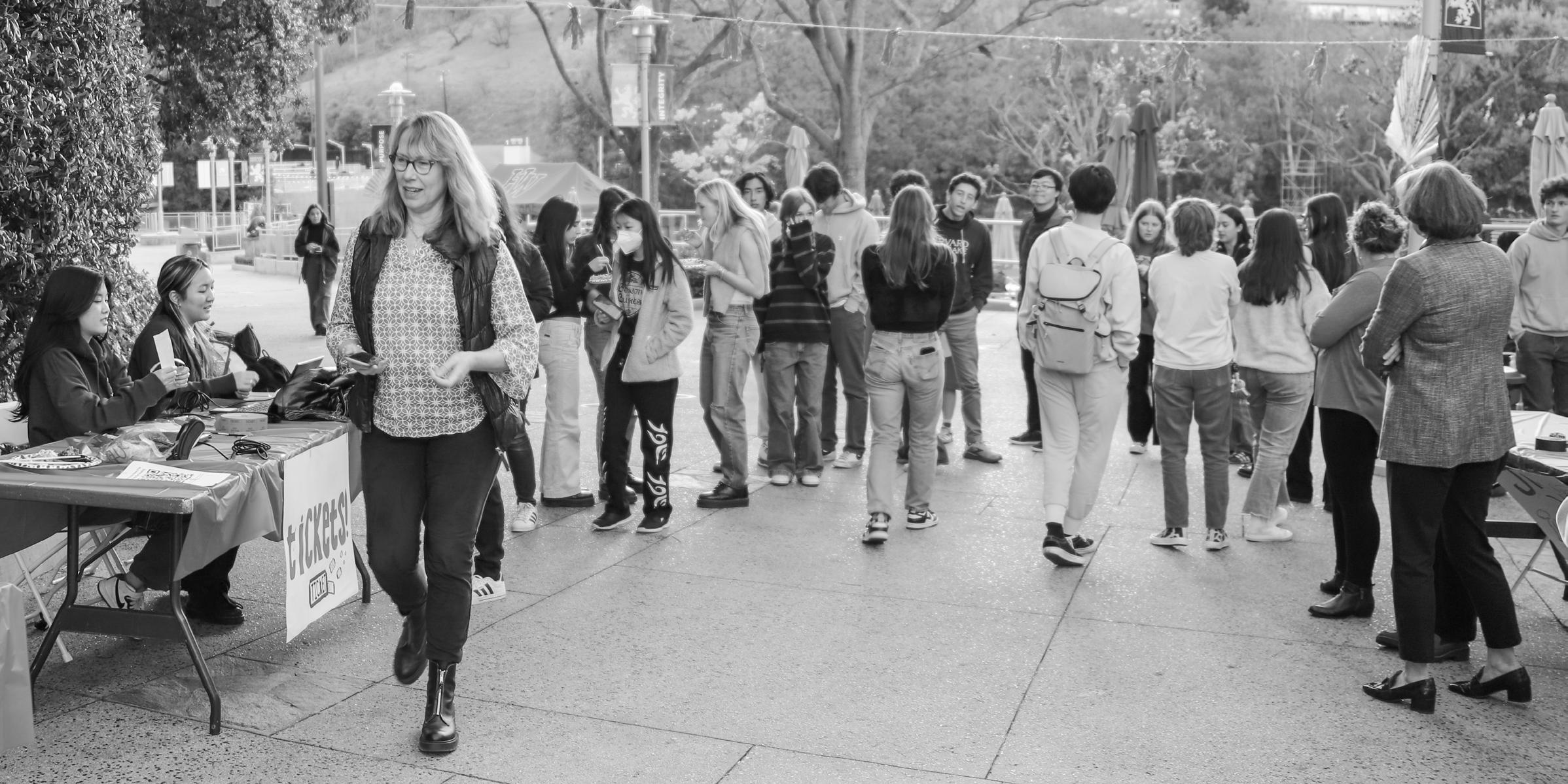
ASiA Advisor and Science De-
Robert Hur ’91 appointed to be special counsel in Biden probe
By Sara Segil
Robert Hur ’91 was appointed special counsel to the investigation of President Biden’s mishandling of confidential documents by Attorney General Merrick Garland on Jan. 12.
Earlier in January, the FBI found classified documents from Biden’s time as Vice President in a warranted 13-hour search of his personal home in Delaware. Investigators also found docu-
ments at a Washington think tank where Biden maintained an office. Critics have drawn parallels to an investigation of Former President Donald Trump, who held hundreds of classified documents in his his Mar-a-Lago estate.
After graduating from Harvard School, Hur attended Harvard College and Stanford Law School. He has served as the United States attorney for the District of Maryland and as a partner at the Washington, D.C.
law firm Gibson Dunne.
History Teacher Katherine Holmes-Chuba, who taught Hur while he was a student at Harvard School, said she has followed his career since his graduation.
“I have been following Robert’s career off and on, in part thanks to Mr. Hu who keeps me informed,” Holmes-Chuba said. “I was a little surprised to see his name in the investigation since I know the name and I had heard that he retired from government,
partment Head Melody Lee said celebrating Lunar New Year makes the school community feel like a second family to her.
“Lunar New Year is all about celebrating with your loved ones and family,” Lee said. “In a sense, the ASiA community is a family of its own, and it’s nice to see the entire school community come together to celebrate one of the biggest holidays in many Asian countries. While I cannot go back home and celebrate with my own family, it’s nice to share this experience with all the ASiA members and the larger community.”
“At Francis Parker in San Diego, [Sanders] demonstrated his ability to understand an entire school and build relationships with teachers, students, staff, administration and just to have a very good grasp of connecting to different constituencies,” Gonzalez said. “I’ve learned this year more than any other year that the Director of Admission needs to be able to connect to the entire school. And that’s the kind of thing that we saw he experienced at Francis Parker, which we think will translate very well here.”
Commons said Sanders stood out among the candidates after he made a compelling presentation demonstrating his skill and passion for the school.
“We chose a dozen candidates to interview in November and invited four finalists in December for an all-day interview,” Commons said. “As part of the visit, candidates made a presentation about the school like they were presenting to prospective parents.”
• Continued on hwchronicle.com
[I was] not surprised that he was appointed by Attorney General Garland since I remember Robert as being thoughtful and well informed as a student.”
— Katherine Holmes-Chuba
but not surprised that he was appointed by Attorney General Garland since I remember Robert as being thoughtful and well informed as a student.”
President Rick Commons said he was impressed by the fact that Hur was appointed.
“I met [Hur] a few years ago at a reception in DC. He came in part because of his time at Harvard School mattering to him, and his friend John Amato, who was also there,” Commons said. “I expect he’s going to do a great job and we’re proud of him.”
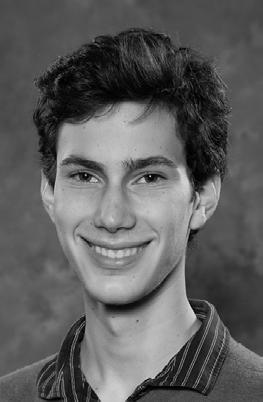
Presidential Scholars list released
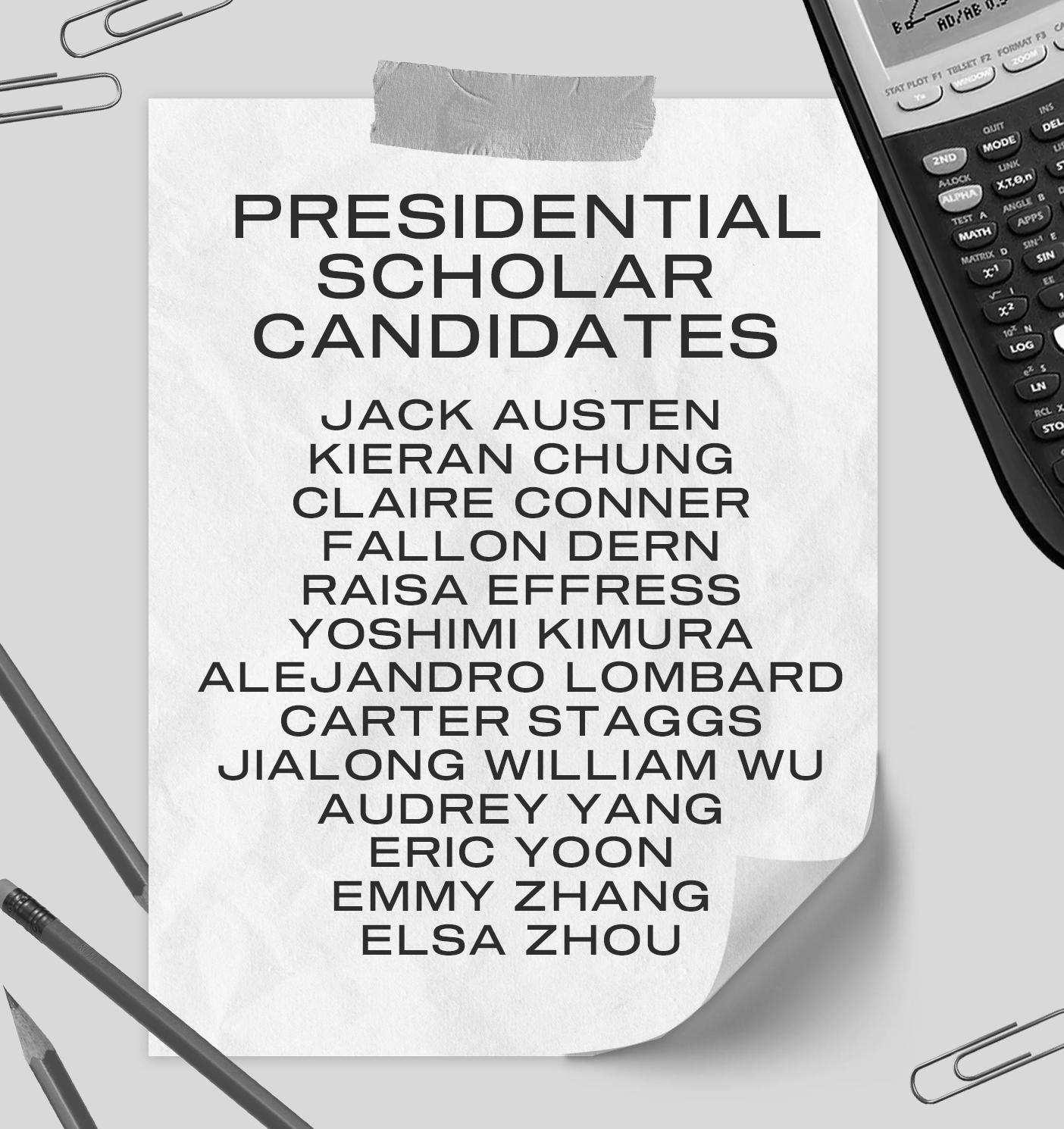 By Olivia Phillips
By Olivia Phillips
Thirteen seniors were nominated for the U.S. Presidential Scholars Program.
The nominees (all ’23) are Jack Austen, Kieran Chung, Print Managing Editor Claire Conner, Presentation Managing Editor Fallon Dern, Photo Editor Raisa Effress, Yoshimi Kimura, Alejandro Lombard, Carter Staggs, Jialong Wu, Audrey Yang, Eric Yoon, Executive Editor Emmy Zhang and Elsa Zhou. Dern, Effress and Lombard were nominated as Presidential Scholars of the Arts.
The program was established in 1964 to honor high school seniors demonstrating academic excellence and has since expanded to include the artistic and technical fields.
Seniors across the country are invited to apply for the program based on their standardized test scores, and nominees are chosen from each state. For the Presidential Scholar in the Arts designation, the national YoungArts competition nominates up to 60 of their finalists.
Previously, alumni such as Allison Park ’21 and Charlie Kogen ’19 have received the Presidential Scholar award.
Staggs said although he appreciates the recognition, the selection process concerns him.
“It’s awesome to be nominated, but it’s entirely based on standardized test scores,” Staggs said. “There’s no human component. The application is meant to flesh you out as a per-
son, but it doesn’t define my character by any means.”
Upper School Dean Nia Kilgore, a former reviewer of Presidential Scholar applications, said students are selected based on how well they would represent the country.
“My job exclusively was to read those [applications] and find who I thought could represent their state in a way that showed off their excellence in whatever they do,” Kilgore said. “I think that in the Harvard-Westlake environment, our size and the robust nature of our academics and extracurricular programs all lend itself to developing students who would be qualified for [the Presidential Scholars program].”
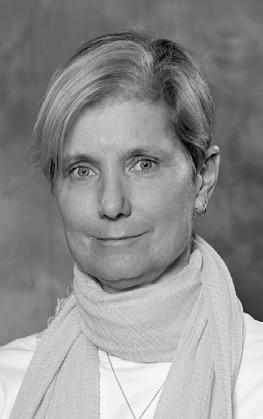
hwchronicle.com/news News A3 Feb. 8, 2023
PRINTED WITH PERMISSION OF
SHAUNA ALTIERI
Wood “
L.
L. Wood
Carter Staggs ’23
ILLUSTRATION BY TATE SHEEHY
• Continued from A1
In addition to getting law enforcement involved, Slattery said the school is adding surveillance to places on campus.
“I don’t love the idea of cameras in close proximity to students, but we are going to be adding some cameras to a couple of different locations around campus,” Slattery said. “We’ll probably add them to the back of some classrooms and the student lounge.”
In response to the incidents, Jewish Club has posted signs around campus with messages meant to support the Jewish community at the school. Jewish Club Leader Charlotte Newman ’24 said the goal of creating signs was spreading awareness to students who otherwise would not pay attention.
“Some of us felt like the people who were most paying attention to [antisemitism] were the kids who are Jewish, the kids going to Jewish clubs, or the kids involved in other affinity groups,” Newman said. “We want to make [the activism] school-wide because it isn’t just limited to the Jewish community. If one group is being targeted, it doesn’t stop there.”
In regards to the swastika drawn on a whiteboard in September, Slattery said there was little for the administration to investigate because of the lack of surveillance and ambiguity over whether the symbol was an actual swastika and when it was drawn.


“We didn’t know how long it had been there and we’re becoming aware that people do not necessarily know how to draw swastikas, so it was confusing since it was more of a swastika-like image,” Slattery said. “We don’t have cameras in our classrooms, and though we looked at the students in the classroom, there was very little way to identify it.”
Following the investigation into the whiteboard swastika, the incident went unreported to the community. A month later, Oct. 12, Commons sent a community-wide email reporting a second incident, in which the words “Hitler Rocks” and several swastikas were found carved into a Seaver Academic Center desk. Commons said each time there has been an incident, the administration has discussed whether to report it to the community.

“There was a long discussion with my colleagues about the question of whether communication potentially does harm as well as provide transparency to people who are concerned,” Commons said. “We came out on the side of transparency. We
want to make sure that our Jewish students and community members, as well as all students and community members, know how seriously we’re taking this.”
Slattery said the school tried various methods of identifying the student responsible for the vandalism but have been unsuccessful in their efforts.
“Our primary method of investigating has been to look at who had access to those locations immediately prior to their discovery,” Slattery said. “Unfortunately, there isn’t a single person who has a class in all the locations and even if there were, it would be difficult to confirm it was that person, given that our classrooms are not locked and haven’t had cameras in them.
Lots of people have had access to those rooms, even if they don’t take classes in there. We have conducted many interviews, but so far, nobody has indicated that they saw anything or has any information that could really be considered a lead.”
On Nov. 30, Sarah Brown ’24 was in her Principles of Engineering class when she noticed a swastika on the table she was completing a project on. Brown said upon finding the swastika, she was surprised and worried.
“We were working on a building project, and I moved my backpack and found [the swastika] underneath,” Brown said. “Seeing it, I was shocked and immediately told the kids at my table and the rest of the class. I then told my teacher, and the table was removed by the next time I was in class. It was really disappointing to actually see this type of hatred at school. Seeing the swastika, along with the other antisemitic acts at school, makes me think that more education on the Holo caust is necessary.”
After investigating the class room in Munger Science Center in which Brown found a swasti ka, the school discovered a sec ond one in the same classroom. The school was again unable to identify who was responsible, ac cording to Slattery.
Following the incidents in Munger, Commons spoke before the Junior and Senior classes during Junior and Se nior Seminar class assemblies. In his speech, Commons said while the school does not tol erate hate, he believes that one way to stop future incidents is to create a student culture that stands against hatred.
“The school’s tolerance for this is what you would expect it to be: zero,” Commons said. “But that’s not working. The only thing I believe that will work is when the student tolerance is zero, and when there’s nobody who could think of doing what has been done four times in this community because the student culture wouldn’t allow it. I think only your zero tolerance can make it so that our community is one we can believe in.”
Slattery said the school struggled with investigating the swastika found in the student lounge because students being interviewed do not want to speak up for fear of being involved.
“The [swastika] was essentially the size of my fingertip, and you had to remove a pin to be able to see that it was a swastika,” Slattery said. “We thought that we were getting close to identifying the person who might have done it because it seems like it should have been somebody who would have seen it [occur]. But in our investigation, it’s been difficult because nobody wants to be involved in this at all.”
Beyond responding through investigations, the school has formed an Antisemitism Working Group, led by Associate Head of School Laura Ross, Head of Communica tions and Strategic Initiatives Ari En gelberg ’89, Head of Diversity, Eq

uity and Inclusion Janine Jones and a group of parents. Ross said the group has been focused on improving Jewish education within the school’s curriculum, educational programming and student support.
“We’ve been focusing on three areas,” Ross said. “One area is curriculum and pedagogy, so we’ve been looking across all grade levels and determining if there are holes in [Jewish education] or places where our teachers need better pedagogy education in teaching particular subjects. We’ve also been focusing on what happens outside the classroom in terms of things like field trips and speakers. The third area is student support, so we’ve been working with the Jewish Club, groups of parents and all of the department chairs to determine changes we should make.”
Slattery said it is important for the school to take action by increasing Jewish education because
“It’s important for us to make the distinction that not everything needs to be about the Holocaust and that Jewish education is important on a broader scale,” Slattery said. “I think many of us, myself included, assume that people have more knowledge about the experience of Jews in America, antisemitism and the Holocaust than they actually do. I think that that is really an area where we could be better.”
Jewish Family Alliance (JFA)


Co-Chair Shana Glassman (Jessa ‘20, Gabe ’22, Sammy ’24) said she appreciates the school’s collaboration with Jewish parents to help ensure there are no future incidents that harm Jewish students.
“It’s a hate crime,” Glassman said. “That needs to be said because it is something that is extremely triggering to the Jewish people. The swastika is a symbol of violence. We don’t want to see that anywhere our children attend school, so we appreciate the partnership with the administration to make sure that does not happen again.”
French Teacher Simona Ghirlanda said she has previously incorporated Jewish history and examples of antisemitism into her French and Italian courses. Ghirlanda said while the school is not responsible for all acts of antisemitism in the world, they are responsible for ensuring students are educated about antisemitism and hatred.
“We are responsible for [Holocaust] education, and we need to do better,” Ghirlanda said.“This is a place of education, and we can’t be ignorant. If I see a swastika at Ralphs, it saddens me, but I have no power over it. If I see a swastika on campus, I am as guilty as everyone else because that means I’m not doing enough to spread awareness.”
Jones said while it is important to discipline whoever is responsible for the vandalism, she hopes the community is able to learn from the incidents.
“I hope that our community can grow and heal from this, and understand how deeply problematic this all is,” Jones said.
“It shouldn’t be happening in our community, and it’s serious. It’s not

ILLUSTRATIONS BY FALLON DERN AND LOREN PARK
L. Wood
The Chronicle Feb. 8, 2023 News A4
Beth Slattery
Community members react to the recent incidents of antisemitic vandalism on campus and discuss the best way to move forward.
“ I hope that our community can grow and heal from this, and understand how deeply problematic this is.
Janine Jones Head of DEI
Alumni Association Board holds forum
By Alden Detmer
The Alumni Association Board hosted an all-community meeting in Munger Library Jan. 25. The roundtable discussion focused primarily on student health and wellness, with speeches from Associate Head of School Laura Ross, Head of Peer Support and Psychology Teacher Tina McGraw ’01 and HW Alumni Association President Angel James Horacek ’95. Ross said the school’s ultimate goal is to equip students with the necessary skills to succeed beyond high school.
“We know that on the deepest level, what parents hope for is that their kids will come out of their educational experiences full of new senses of new things that they know, academic interests and personal interests,” Ross said. “But [we] also [want to] help [teach students about] self-efficacy, emotional health and an understanding of how to manage challenges and reach their goals.”
Ross said the school has made a number of changes to its student support, including the addition of the Learning Center and school counselors.
“When I arrived at [the school] six years ago, I came in with our first Director of Learning Support,” Ross said. “That was a person who is supposed to serve all 1,600 students on two campuses. And at that time, there were one and a half counselors at the Upper School. If you fast forward to now, we have now two full-time learn-
ing specialists on both campuses with two Learning Center spaces. It’s actually been so popular that at [the Upper School], we’re moving it into the Tech Center.”
McGraw said the prevalance of social media will continue to be a key issue in student mental health.
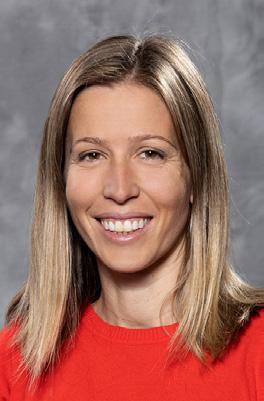
“The social media piece has been huge in terms of understanding the rising rates of depression and anxiety,” McGraw said. “We really have seen a lot of research that correlates those two things, especially that students are recognizing it but also saying they can’t stop. In a sense, it’s much like a gambling or sex addiction: something that becomes part of behavior. Our education around tech use is definitely going to escalate over the next few years as we address this head-on.”
McGraw said parents should limit the time that students spend on their devices.
“The less time they spend on screens, the better for their mental health,” McGraw said. “Having a limit on how long your students are on screens is really helpful, especially if they’re in the younger grades. Eventually, they will learn to self-manage, but also feel free to grab their cell phones, their laptops and their iPads at 8 or 11 p.m. and lock them in a drawer. Otherwise, sleep deprivation really devastates their ability to focus and concentrate. [Sleep deprivation] also changes students’ mood and attitude profoundly.”
Prefects host Chess tournament
By Alex Dinh
Prefect Council and Chess Club partnered to host a schoolwide chess tournament on the quad during the week of Jan. 17. 56 students participated in the tournament, and after the first four rounds, 16 advanced to the knockout stages. After four knockout rounds Colin Kneafsey ’23 won the tournament and received a $50 gift card.

Kneafsey said he appreciated playing the tournament where the school community could watch the competition.
“I really enjoyed the atmosphere of the games,” Kneafsey said. “Playing on the quad in front of all of my classmates added to the pressure of winning each game and ultimately
winning the tournament was really rewarding.”
Chess Club Leader Eric Vartany ’24 said the tournament helped the school community to bond.
“It was super exciting to host Harvard-Westlake’s first school-wide chess tournament in years,” Vartany said. “It was both fun and competitive, which everyone enjoyed. We hope to make this a tradition that will share the joy of chess with the school community. I anticipate even more participation in future tournaments.”
Sophomore Prefect Eric Lee ’25 said Prefect Council noticed the popularity of chess among his peers, which inspired the organization of the tournament.
“Recently, we noticed that
chess has been gaining a lot of popularity among the student body,” Lee said. “I noticed a lot of my close friends playing chess and, while the initial suggestion wasn’t mine, there [are] definitely prefects on the council who are pretty passionate about chess.”
Senior Prefect Rowen Jen ’23 said Prefect Council decided to host the tournament in person to create a sense of togetherness.
“One of the big debates we had over the chess tournament was whether we should do it online or in-person,” Jen said. “I think [the] decision to do it where it could really be a community centered thing [and] to do in-person boards was totally the right decision and contributed to the spectacle.”
Committee hopes to restructure seminars
 By Everett Lakey
By Everett Lakey
Cinema Sundays makes its return
By MeJo Liao
Cinema Sundays is returning to the school after a hiatus following the passing of its previous host, former Performing Arts Teacher Ted Walch. The events invite community members to watch films and engage in a discussions afterward.
Cinema Studies Teacher Max Baril ’06, who will be hosting the new series of Cinema Sundays, said the screenings help unite the comunity.
“Cinema Sundays is, and Mr. Walch was very aware of this, a unique way for an opportunity to experience the communal experience of watching movies together,” Baril said. “The movie industry changes a lot, and how we are used to watching movies in this day of
age changes a lot too, and that’s great. But there’s nothing quite like all being in the same room and watching a film with others. ”
Baril said the continuation of Cinema Sundays is a way of recognizing Walch and his contributions to the school.
“It’s is an opportunity to honor Mr. Walch’s legacy with Cinema Sundays,” Baril said. “We’re bringing in guests who’ve participated in the past, who were close with him and who share a taste in movies with him. I wanted to bring those who could speak in the spirit of preserving Mr. Walch’s legacy and honor his presence.”
Artist, filmmaker and former Visual Arts Teacher Cheri Gaulke said she is looking forward to showcasing two of her own films at Cinema Sunday on March 5.
“It feels great to [come back] because I love Harvard-Westlake, and it’s been a community that has been supportive of me over the years,” Gaulke said. “When I was contacted and asked to discuss a film, I was extremely honored, and I was given the option to show my own work. So I’m very excited to show two short documentaries I created after I retired in 2019.”
Eva Goldrich ’25 said she is excited for the return of Cinema Sundays.
“The ability to enjoy a movie is almost universal,” Goldrich said. “Cinema Sundays also often features classical movies that are older, which I really appreciate. So I’m really looking forward to having a place where I can watch a movie and bond with my community that way again.”
The seminar redesign committee, a new student group established to advise the administration as they restructure the sophomore, junior and senior seminar classes, held its first meeting Jan. 23. Psychology Teacher and Head of Peer Support Tina McGraw said she worked with the Upper School Dean Team to select four students from each grade of the committee. She said each member is committed to helping their fellow students and collaborating with students and faculty to make a change.
Ofek Levy ’23 said that he views the seminar courses as essential for learning about topics that extend beyond the classroom.
more social and emotional support for students, and to ensure their content reflected students’ particular needs.
“This was a really great way of creating improved, thoughtful, well-rounded human beings.”
“We want [students] to help us edit what topics are most salient for them in their daily lives,” McGraw said. “Sometimes, as adults, we have our ideas, but we always want to get student input to make sure that those ideas match what [students] want. We have to work within the confines of what’s available in the schedule and what’s available in terms of faculty and staff who are going to be running those classes, but we’re extremely open to new ideas, fresh ideas [and] even new ways to deliver content.”
“There are many things like sex, alcohol and drug education, learning about social skills and more difficult topics like human sex trafficking awareness, or suicide awareness, that don’t really have a class in themselves to talk about already, but are very important to talk about in our modern-day society,” Levy said.
McGraw said the administration opted to make changes to the seminars to incorporate
Upper School Dean Nia Kilgore said students are able to offer a valuable perspective on the seminars.
“The deans don’t experience classrooms the way academic teachers do because we do not see our cohorts of students as often,” Kilgore said. “There is no one more uniquely qualified to give us the feedback and insight we need to improve the Sophomore Seminar Program than the students who are living it now.”
Feb. 8, 2023 News A5
MATE MADNESS: The chess tournament featured 56 students. Colin Kneafsy ’23 advanced through four rounds and ultimately defeated Jake Wiczyk in the tournamnent’s final match, securing the $50 gift card grand prize.
hwchronicle.com/news ALEX DINH/CHRONICLE
L. Wood Tina McGraw
FILM FRENZY: Cinema Sundays take place in Ahmanson Lecture Hall. Participants watch films together and discuss them with invited guests. The tradition was paused due to the passing of Performing Arts TeacherTed Walch.
TATE SHEEHY/CHRONICLE
• Continued on hwchronicle.com
Ofek Levy ’23
Second Semester Clubs




Over 10 new clubs were approved by Prefect Council for the second semester. Here is an inside look at four of them.
Ho said Anthropology Club will in corporate innovative ways to learn about human, cultural and social evolution and will also allow students to explore their own interests.
“Anthropology Club will bring students opportunities to talk about their unique hobbies, engage in various subjects and discover more about their interests and identities,” Ho said. “We watch films and [eat themed snakcs] while sharing opinions and personal experiences. We explore various categories, such as the anthropology of wine, body language and more. We hope for everybody to feel welcome to express theories and thoughts without judgment or fear.”
Ho said she created Anthropology Club out of her own interest in the field
in linguistic anthropology because lan guages and social life are so intertwined. Linguistic anthropology has grown into exploring how social and cultural formations are grounded in linguistics practices. Even though I transferred to another program, this branch of anthropology always fascinates me.”
Avery Kim ’25, who plans on joining the club, said he is thrilled to learn about a new and important topic he is mostly unfamiliar with.
“I don’t have any true experience with anthropology but I am excited to try out something new,” Kim said. “I think human culture and evolution is fascinating, and it’ll be really interesting learning why humans developed certain features or act in certain ways.”
Ho said she is eager to plan meetings on unique topics, including the origins
Cinephiles Club
by Interdisciplinary Studies and In dependent Research Teacher Max Baril ’06 and will meet on Day 2 during lunch.
Chamas said that the club will include viewing, discussing and seeing films in theaters.
“Our club will focus on watching movies and discussing them afterwards to share our thoughts and opinions on them,” Chamas said. “Also, we may take field trips to theaters to see films, which is still an idea we are working on.”
Markman said that besides watching the films, the club is also working on opportunities to meet and talk to workers in the film industry.
“We are planning on bringing some guests who work in the film industry to talk about their jobs and do
British Politics Club
Anthropology Club Table Tennis Club
Markman said the goal of the club is to expose students to movies they either haven’t seen before or that have had a large influence on the film industry.
“Our goal with this film club was for the movies to be quality, or more artistic or older films so we could show people things they had never seen before, while also showing them the movies that largely impacted film itself,” Markman said, “We can’t really just go around telling people to watch things, so we decided we should start a club for it.”
Chamas said that in addition to providing a place for students to experience films, she also hopes that the club will provide a safe community for everyone who comes to enjoy the movies and learn more about the film industry.
Craig said he is fascinated by the political decisions that caused the country’s fall from power.
“Britain has been a global power for centuries,” Craig said. “You’d be hard pressed to find any time in the last 400 years when anyone doubted Britain’s place as one of the most powerful nations on the global stage, until the last five years or so. It’s hard to believe that Britain controlled one-fourth of the world’s land area just 100 years ago, when now many believe it to be a shell of its once formidable self.”
The club also aims to explore more modern policy, drama and famous figures in British politics such as Liz Truss, Boris Johnson and Rishi Sunak.
“From the craziness of Brexit, Boris Johnson and most recently livestreams of lettuce outlasting recent prime minister Liz Truss, UK politics is in a very strange and frankly hilarious place,” Michaelson said. “Overall, British Politics Club will be a great time for people to learn more about British politics and also to get away
typically been more confrontational than in the US—vividly demonstrated by the Prime Minister enduring very pointed and often withering questioning at the end of every week,” Goedde said. “ I think that the British political system faces many of the same challenges as our U.S. system, so that is another point of interest.”
Craig said that British politics in the modern age contain a certain appeal because of the influence they will have on Britain’s future. After a series of political and economic crises, he said he believes the next few years of policy-making in Britain will solidify its future path.
“After learning about Britain’s modern politics in my [AP Euro] class last year, I’ve been fascinated by the trajectory the nation’s been set on,” Craig said. “The crises of Brexit and Liz Truss’s premiership reinforced my belief that Britain’s currently at a turning point in its history, and I want to explore that in this club.”
nized as a sport by the California Interscholastic Federation (CIF), the club intends to compete against other amateur Los Angeles (LA) teams in a table tennis tournament this spring.
Though the school had a table tennis club last year, Esrailian said that team did not play competitively outside of school.
“Much of [the competition aspect] is new,” Esrailian said. “We’re taking this to a high level that goes beyond the Harvard-Westlake universe. [Right now,] we get our friends to get together and play ping pong. But to get the fiery competition, we’ll be competing at these tournaments.”
Pinsker, who is the club’s primary manager, said he is working to coordinate the club’s competitions.
“My role is to formulate the [logistics] for the team we’re planning and communicating with officials and organizing practices,” Pinsker said. “There’s a website called lapingpong.com where you can register teams on the website with a bunch of other club teams based out of Los
our free time and have fun playing at school,” Esrailian said. “I’ve been going with some of our team members to the Westside [Table Tennis] Center to play. It’s been a lot of fun and motivated us to bring this team to fruition.”
Vartany said he is excited for the new opportunities ping pong club will bring, both inside and outside of school.
“We’ll be playing in competitive tournaments with other schools and hosting more school wide events like tournaments,” Vartany said. “Also, we will be inviting professional players to play against students to raise money for charity.”
Deshong said although table tennis is different from other sports, he hopes it fosters the same exciting atmosphere.
“[Table tennis] isn’t an official school sport, but we hope we can show the school the fun of an especially competitive game of table tennis,” Deshong said. “If even one person plays a little more because of what we’re doing, we count that as a success. We’d love to see the school tables in use.”
A6 News Feb. 8, 2023 The Chronicle
Annual Tapout begins
By Eden Conner
Prefect Council announced the beginning of Tapout on Jan. 23. Tapout is an annual all-school competition in which students eliminate their intended targets by tapping them on the back.
Scholastic’s Art and
Writing Program announces 2022-2023 contest winners
By Jade Harris
The 2022-2023 Scholastic Art and Writing Awards recognized 62 students Jan. 26. Students were awarded either a Gold Key, Silver Key or Honorable Mention award, and all applicants that received a regional Gold Key from the jurors will move on to the National Awards.
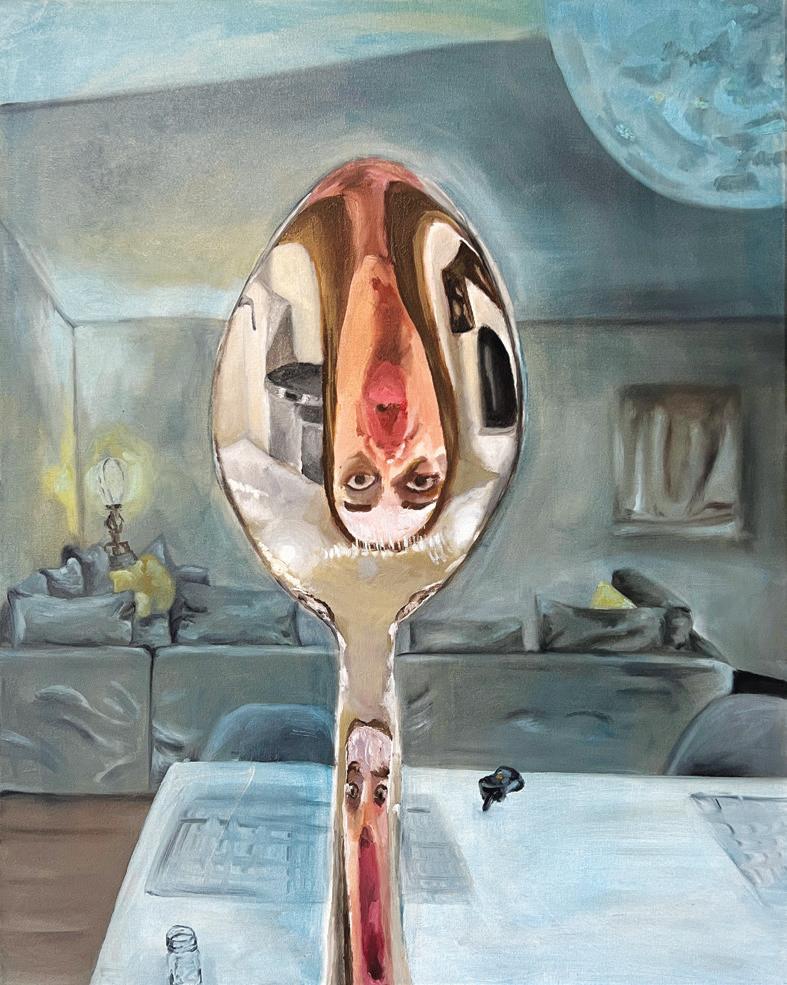
The Scholastic Art and Writing Awards was established in 1923, making it the oldest and most prestigious recognition

program for teens in 7th to 12th grade across the United States, according to its website.
Visual Arts Department Head Gustavo Godoy said the Scholastic Awards are exciting for students because they present many opportunities for them, but that awards depend on the judges’ personal preferences.
“[The competition] is a big deal,” Godoy said. “If you win certain levels, you’re invited to go to Washington D.C. or New York to receive an award at Car-
negie Hall, and sometimes kids can win scholarships and decent cash prizes. It’s a nice honor, but I also think that some kids win with pieces that aren’t as sophisticated as some of our more advanced students at times, and it’s just a matter of who was judging and what they’re interested in.”
Nicole Choen ’24, who won a Gold Key in the Critical Essay category, said creating her piece about properly naming Korean historical events was gratifying and allowed her to connect to her
Senior creates new wellness app
By Amber Zhang
Claire Paul ’23 launched HWell, an app that helps students monitor their mental health, Jan. 30. The app includes features like a mood tracker and a database containing mental health resources.
Paul said she came up with the idea for the app when returning to school following the COVID-19 pandemic.
“Last fall, I struggled a bit with my mental health, and one of the things that really helped me was daily mindfulness and being aware of my emotions,” Paul said. “HWell helps you be in touch with your emotions and understand how you’re feeling. The app will actually alert stu-
dents if they’ve reported feeling not great for 14 consecutive days, which I think is a great tool.”
Paul said she hopes the app will be a medium for students to connect with each other and seek help if needed.
“Students can actually share resources with other students, which was important to me,”
Paul said. “My favorite feature of the app is the ‘Asking for Help’ feature. You can just put in your name and email address, and you’ll be contacted by someone from the Harvard-Westlake counseling team. It serves as a preliminary step towards recognizing your emotions.”
Bracken said HWell allows users to recognize patterns in their mental health and understand
how to find support.
“It’s hard to know where to go for help, which is where the app comes in,” Bracken said. “It allows you just to say, ‘Oh, yeah, for a whole week, I was kind of just feeling okay, wonder if that means anything?’ Hopefully, it allows some people to notice this trend and guide them.”
Laura McNary ’25 said the app will help students become more self-aware.
“HWell is a step in the right direction to address the mental health problems that I and other students, especially at Harvard-Westlake, face,” McNary said. “I don’t think that the app alone will solve the problem, but it might help students that are hesitant about seeking support.”

culture. She also said the award meant a great deal and the experience was rewarding.
“I started this piece last-minute when I remembered a conversation I had with a Korean War veteran at a performance, and this [experience] set me off into a journey that helped me understand my culture’s history and pain,” Choen said. “I am incredibly honored to have had the opportunity to both learn about my culture and be rewarded for the results of this journey.”
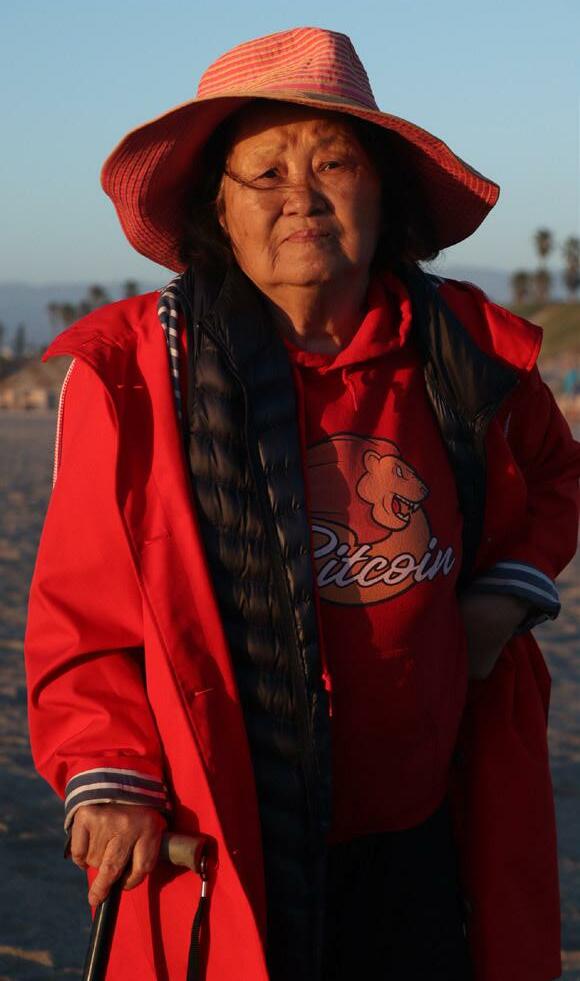
The Tapout Constitution, created by Prefect Council, explains that each participant will receive a target they must find and tap as they yell “out.” A recording of the interaction must be sent to the Tapout Facebook group.
Junior Prefect Isiuwa Odiase ’24 said she is excited for this year’s Tapout and looks forward to seeing how members of campus react to the challenge.
“Tapout creates an interactive environment and allows you to know more students since you get a random person,” Odiase said. “It’s fun and heightens your senses.”
Idalis McZeal ’23 said Tapout is intense, and participants must strategize to ensure the best chances of winning.
“You have to make sure that you don’t spread who have to anyone because news gets out quick,” McZeal said. “Lay low. Either keep a close circle of people around you, or camp out in silent study.”
•Continued on hwchronicle.com
Upper School Science Olympiad team participates in invitational
By Mejo Liao
The Science Olympiad (SciOly) team competed in its first tournament at Temple City High School Jan. 28. SciOly is a team of over 30 members who train throughout the year to compete against other schools in various science-related topics.
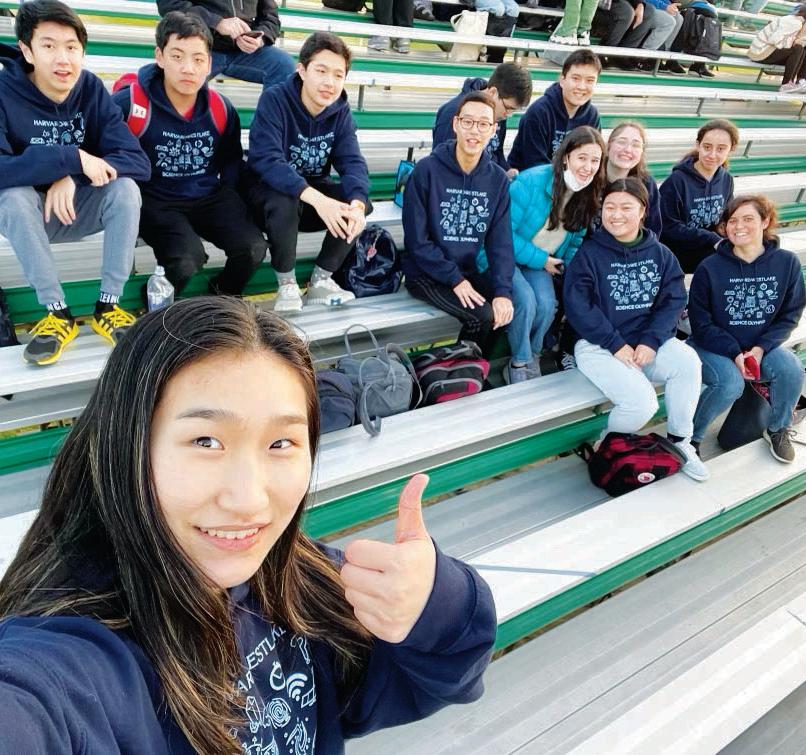
The SciOly Team A placed 35th out of 77 schools, and Team B placed 46th out of 77. Markenever Dai ’26 and Frank Zhang ’24 medaled for first in the Bridge event, Luke Collins ’24 and Oren Hartstein ’24 medaled for seventh place in “Write It CAD It,” Collins and Chris Robertson ’24 medaled for fourth place in cybersecurity and Kath-
erine Shen ’25 and Sky Stubbeman ’25 medaled for ninth in the “Write It Do It” event.
SciOly co-leader and co-founder Helena Wu ’23 the said she and Wang started the club sophomore year after participating in SciOly at their previous school. Wu said she is impressed with the growth of the team.
“We started with one team of around 15 members on Zoom in my sophomore year,” Wu said. “In my junior year, [our team] grew to two teams of over 30 members and even qualified for the States tournament. Science Olympiad has seen massive improvement, and I could not be prouder of our progress.”
Because of COVID-19 re-
strictions, Science Olympiad tournaments were moved online until the end of last year. Wu said the return of in-person events enhanced the experience of competitions, allowing for a more engaging learning experience.
“Last year, Olivia and I helped plan the San Marino Invitationals, which was the only in-person competition of the year,” Wu said. “This season, we’re doing all competitions in person now, so transitioning to being able to go to the event is very exciting. We were also able to see the other schools’ teams, so I hope being in an environment with other dedicated scientists our age can be inspiring and a learning experience for all of us.”
hwchronicle.com/news News A7 Feb. 8, 2023
RECOGNIZING THE REMARKABLE: 62 students were selected as award recipients of the 2022-2023 Scholastic Art and Writing Program competition. Three of the winning artworks are shown above, produced by Aerin Duke ’23, Ashley Hahn ’24 and Ian Kim ’24, from left to right.
PRINTED WITH PERMISSION OF AERIN DUKE, ASHLEY HAHN AND IAN KIM
OF CLAIRE PAUL
PRINTED
WITH PERMISSION
PRINTED WITH PERMISSION OF OLIVIA WANG
SCIENCE ALLIANCE: Olivia Wang ’23, leader of the school’s Science Olympiad team, poses with members who took part in the invitational.
Crazy for Crosswords
Science teacher Nathan Cardin, once again, created this issue’s crossword. Keep your ion the prize as you try to find the solutions.
DOWN:
1. 3-letter deli sandwich: Abbr.
2. Propel a canoe
3. “4 score and 7 years ___ ...”
4. Give up amateur status for the big leagues: 2 words
5. Comic strip with Snoopy
6. Summer cooling appliances
7. “___ anything later?”
8. Retrieved, as bags at the airport
9. Plant responsible for syrup
10. Spanish bears
11. Homer Simpson’s neighbor
16. Simplicity
17. Indian flatbread
21. Makes a mistake
22. Went back in
23. State home to Bowdoin
27. Confident
29. “Gosh, that’s amazing!”
31. Easily swayed types
33. Yoga surface
35. Headphone brand
37. Act as an excessive fan
40. Place for boutonniere
41. Fold-out dorm furniture
5 wds.
30. Bro’s sibling
sigma and upsilon
1. Boast
18. Competed at a cross country meet
25. Plane arrival time: Abbr.
32. Percussion instrument
34. Elitist
36. Not yeses
38. Historical period

39. Awful dancer’s problem:
3 wds.
42. Marvel movie actress Thompson
43. Greek letter between
44. Basketball goals made from beyond the arc: 2 wds.
49: Crystal ball gazer
50. Female sheep
51. Racetrack shape
52. “No ifs, __, or buts!”
53. “__ MisÈrables”
54. Pixar clownfish
42. Now, but in the past
44. Airport screening organization: Abbr.
45. Be in debt to
46. Night before a holiday
47. LA football player
48. ___-mo replay
Feb. 8, 2023 A8 News The Chronicle
ACROSS:
5. Tampon alternative
8. “Oh, gimme a break!”
12. McDonald’s arches or NBC’s Peacock
13. Earth-friendly prefix
14. Zap with a surgical beam
15. Some identical twins or best friends, idiomatically,
19. Focus of a manicure
20. Event where gains are balanced by losses: 3 wds.
24. “__ we there yet?”
26. Butterfly catchers
28. Matured
Answers on C4 1 2 3 4 5 6 7 8 9 10 11 12 13 14 15 16 17 18 19 20 21 22 23 24 25 26 27 28 29 30 31 32 33 34 35 36 37 38 39 40 41 42 43 44 45 46 47 48 49 50 51 52 53 54 4 3 2 1 5 6 7 8 9 10 11 12 13 14 16 17 19 18 24 28 29 25 34 35 30 36 31 23 26 37 32 41 43 51 54 46 47 48 45 50 53 49 52 40 42 27 38 33 15 20 21 22 39 44
•
Editors-in-Chief: Natalie Cosgrove, Will Sherwood
Print Managing Editors: Lucas Cohen-d'Arbeloff, Claire Conner, Daphne Davies, Charlie Seymour
Presentation Managing Editors: Fallon Dern, Allegra Drago, Jina Jeon, Leo Saperstein
Digital Managing Editors: Alex Hahn, Lily Lee
Executive Editors: James Hess, Emmy Zhang
News Editor: Natasha Speiss
Assistant News Editors: Davis Marks, Chloe Park, Grant Park, Tate Sheehy
Opinion Editor: Georgia Goldberg
Assistant Opinion Editors: Jade Harris, Jackson Tanner
Features Editor: Harry Tarses
Assistant Features Editors: Dylan Graff, Iona Lee, Averie Perrin, Ella Yadegar
A&E Editors: Becca Berlin, Vasilia Yordanova
Assistant A&E Editor: Kriste An
Sports Editors: Jaden Bobb, Paul Kurgan
Assistant Sports Editors: Jackson Mayer, Christopher Mo
Satire Editor: Georgia Goldberg
Multimedia Editor: Danny Johnson
Business Manager: Andrew Park
Art Director: Sophia Evans
Photography Editor: Raisa Effress
Executive Broadcast Producer: Jake Lancer
Assistant Broadcast Producers: Rohan Amin, Alexa Benitez, Hunter Bridgett, Eric Chang, Hudson Chen, Grace Coleman, William Coleman, Jack Limor, Aaron Milburn
Freelance Writers: Kate Goldberg, Jack Moreland, Carter Staggs
Layout Assistants and Staff
Writers: Sasha Aghnatios, Hailey Cho, Karsten Cole, Eden Conner, Alden Detmer, Alexander Dinh, MacArthur Galavitz, Samuel Glassman, Zoe Goor, Georgia Grad, Justine Gustman, Sabrina Hamideh, Jayan Kandavel, Crista Kim, Katelyn Kim, Saisha Kumar, Everett Lakey, Alex Lee, MeJo Liao, William Liu, Daniel Mittleman, Olivia Phillips, Madeline Pimstone, Caroline Plunkett, Fiona Ryan, Sara Segil, Hannah Shahidi, Olivia So, Connor Tang, Justin Tang, Arielle Trakhtenberg, Max Turetzky, Mason Walline, Nathan Wang, Tiffany Wang, Amber Zhang
Advisors: Billy Montgomery, Max Tash
Layout Assistants: Jen Bladen, Lilian Suarez
Publication Information:
Founded in 1990, The Chronicle is the Harvard-Westlake Upper School’s student-led newspaper. Now in its 32nd year, The Chronicle strives to report stories accurately and to uphold its legacy of journalistic integrity. The newspaper is published eight times per year and distributed to students, parents, faculty and staff. The paper is affiliated with two school magazines, Big Red and Panorama. We are members of the California Newspaper Publishers Association and the Private School Journalism Association.
Transforming the Ticketing System
The boys basketball team defeated Sierra Canyon in a twenty-point blowout that would help them to a Mission League Title and number two seed in the CIF Open Division Tournament on Jan. 20. It was one of the most anticipated games in all of high school basketball, and if you were in Taper Gynmasium that evening, you would know it: On one side of the gym, black shirts and white signs were plastered all over the bleachers — the school’s Fanatics were out en masse to rally their team. From the very beginning, when they read issues of The Chronicle during Sierra Canyon’s starting lineup announcement to indicate their indifference, the student section did not let up: Chants of “Harvard-Westlake” endured throughout all 32 minutes of the game, and cheers for made threes and putback dunks drowned out any possible conversation. It was the student body at its best: a red and black blur of spirit, support and encouragement.
What may have gone unnoticed was exactly how those Fanatics got there in the first place. On Thursday, Jan. 19, Athletic Director for Communications and Student Services Jason Kelly sent an all-school email in which he clearly described the process for securing a ticket: Middle and upper school students would go to the Athletics Office at the start of lunch and scan a code on their phone, where a ticket would be redeemed. Kelly said spaces for the game were extremely limited, and students were instructed to leave once tickets sold out.
At the Upper School, chaos ensued.
Students begged their teachers to be let out of Block Two early, often with success, and rushed to the Athletics Office with the front of the line in their sights. There, they packed in shoulder to shoulder; the elbowing and jostling for position made the crowd look more like a concert moshpit than an organized, single-file line. A failed start-and-stop effort eventually turned into
about us
DIVERSITY, EQUITY AND INCLUSION:
The Chronicle strives to be a diverse and inclusive community that welcomes all who wish to contribute. Our Diversity, Equity, and Inclusion committee works to ensure that every member of the Harvard-Westlake community is recognized, included and given a voice.
The Chronicle's publications will aim to represent this diverse community and provide a variety of perspectives on the topics that they cover.
intense yelling from coaches, and the vast majority of students were turned away by the later part of the lunch period.
The entire debacle was not only an enormous waste of time for many students but also a legitimate and rational safety concern for them, one which the school completely failed to address or stop.
Worse still, the situation was entirely avoidable: If the process was done online — for example, in an email link where tickets could only be renewed for the first two hundred or so people––these consequences would have been bypassed. And yet, the school still chose to give out tickets in person, risking injuries and cutting into many students’ class time.
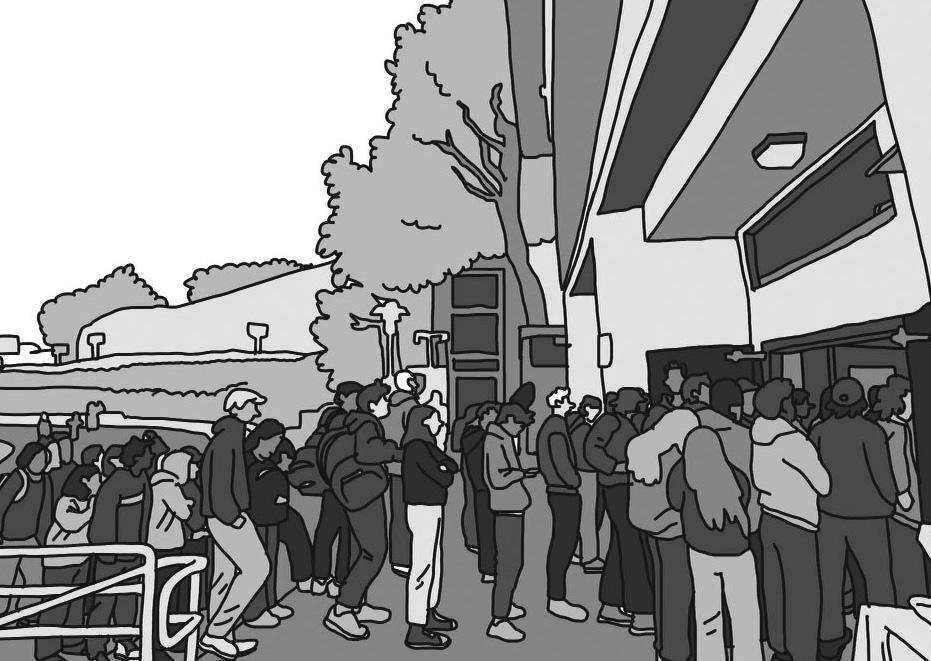
The rationale for the first-come-first-serve basis, if any, must be that students have a mostly equal chance to secure a ticket, but even this falls through. Seniors should be more likely to get one because they will have fewer chances than underclassmen to watch their high school teams play; there are simply more games for younger students to go to, and this should be factored in when the administration decides how tickets are sold. There is no ethical or pragmatic reason for the tickets to have been given out in the way they were.
As CIF Open Division boys basketball playoffs approach, the potential of a home game with massive demand for attendance is real. The school administration must devise a more streamlined, efficient and safe plan for students to secure a space. Making this process simpler and more equitable is not only a fact of convenience but is also a necessary and integralpart of the school’s promise to keep students safe.
We know from the last few years how organized our school can be when our health is involved, and it should extend this approach to everything it does––ticket sale lines included.
EDITORIALS:
Unsigned editorials represent the majority opinion of staffers and are written by the Editorial Board, which is composed of the Editors-in-Chief, Managing Editors and Section Editors.
ADVERTISING:
Looking to place an advertisement in our paper? Questions pertaining to advertisements may be directed to The Chronicle's Business Manager Andrew Park at apark5@hwemail.com. Publication of an advertisement does not imply endorsement of the product or service by the newspaper or school.
LETTERS TO THE EDITOR:
Letters may be submitted to chronicle@ hw.com or mailed to 3700 Coldwater Canyon Ave., Studio City, CA 91604. Letters must be signed and may be edited to conform to Chronicle style, space and format. We are committed to uplifting the voices of marginalized or underrepresented individuals and groups in accordance with our efforts to promote diversity, equity and inclusion.
PUBLICATION
AWARDS:
- NSPA Pacemaker Winner
- CSPA Gold Crown Winner
UPDATES AND CORRECTIONS:
Though we always strive to be as accurate as possible, staff members identify inaccuracies and receive feedback from readers.
The Chronicle publishes corrections when we discover a factual error within a piece. We will continue to uphold transparency even in the face of mistakes following the publication of each issue.
MEMBERSHIPS:
- Columbia Scholastic Press Association
- National Scholastic Press Association
- Quill and Scroll Honor Society
Opinion The Chronicle • Feb. 8, 2023 Studio City • Vol. 32 • Issue 5 • Feb. 8, 2023 • hwchronicle.com
editorial
ILLUSTRATION BY SOPHIA EVANS
Addressing campus antisemitism Making the best LA Metro plans
By Jack Moreland
In2026, LA Metro, Los Angeles County's transit authority, will begin construction on a rapid transit line from Van Nuys to West Los Angeles through Sherman Oaks. The city has depended on cars for decades, but the region cannot sustain the endless expansion of car infrastructure. We need something more compact and scalable: rapid transit.
Although Valley transit is only part of this county-wide equation, the decisions made for this line will affect the 1.8 million people who call the region home, in addition to the thousands who commute across it every day. And the mode of transit — heavy rail or monorail — will impact city planning for decades, as whatever line is built will be extended to Los Angeles International Airport in the 2040s.
Two contractors have bid to construct the line. The first is Build Your Dreams Auto (BYD), which has proposed a monorail that would run in the middle of the 405 Freeway. BYD, a Chinese firm, has a poor track record; they built a low-quality bus rapid transit system in Albuquerque and provided Los Angeles with faulty electric buses.
Moreover, a mid-freeway monorail—besides requiring extensive, traffic-interrupting and practically impossible construction on the 405—would be horrible, noisy and difficult for commuters. A similar line in South LA in the middle of the 105 Freeway is poorly used for this exact reason. The lower estimated cost, $6 billion, contrasted with the subway's $10 billion price tag, buys an unreliable contractor, a longer trip time, years-long construction chaos and worse stop placement for the completed line.
The second company bidding for the job, however, is a much more promising option. Bechtel, an American engineering company, proposed an underground or partially elevated rail along Sepulveda Blvd. or Van Nuys Blvd.
The Sepulveda Blvd. route, with heavy rail above the street leading to a subway under the mountains and with a station directly under the University of California, Los Angeles, would be the best option. This would have the highest estimated ridership and provide an 18-minute endto-end trip, according to an LA Metro report. The route would also allow easy extension to the airport and not overlap with the soon-to-be-built light rail on Van Nuys Boulevard.
If Metro chooses to hire BYD to build a monorail, it will be stuck with an unreliable headache for decades—one that will need to be extended south in a few years, costing more in maintenance in the long run. Don't spare the expense, Metro. Just build the subway.
By Claire Conner
“Harry Styles loves Jews, and so should you.” “Without Jews, you wouldn’t have Borat!”
“Anti-Zionism is antisemitism.”
As a Jew, I know that each of these sentences, written on posters that Jewish Club members hung throughout the school’s hallways last week, is true.
Harry Styles regularly tweets about his appreciation for Jewish traditions, and every gentile should learn about their importance to our culture. Sacha Baron Cohen (Olive ’26), the creator of “Borat,” is Jewish and fluent in Hebrew. And anti-Zionism, while often misrepresented as mere criticism of the Israeli government, is the belief that the state of Israel should not exist — an opinion rooted in destruction and not applied to any other country on Earth, including genocidal Russia and totalitarian North Korea.

Despite their accuracy, these messages dramatically vary in tone and content — they are an abject failure in communication, and they diminish both the seriousness and efficacy of the Jewish community’s ultimate mission. The signs were a response to the sud-
den appearance of Nazi vandalism on campus, with swastikas and a pro-Hitler message found on desks, whiteboards and walls four times during the fall and winter of this year.
Amid these incidents on campus — and a global rise in antisemitic violence documented by the Anti Defamation League — the school administration took firm and immediate action in addressing antisemitism. They launched an investigation into Nazi vandalism at the Upper School, formed an Antisemitism Working Group to review the curriculum and invited two speakers to discuss antisemitism in mandatory assemblies.
"This is not a minor issue of mischievous graffiti,” President Rick Commons said in a recent email. “This is the repeated, deliberate presentation of a symbol of hate, a symbol of the historic scourge of antisemitism, a symbol of the murder of six million Jews in the Holocaust.” Commons is absolutely right: Nazism, in our school community and in the world, should be a matter of grave concern. It is not
Clarifying community service
a joke, and no matter the intent of those who spread its symbols, these images represent an endorsement of persecution and genocide.
Members and leaders of Jewish Club undoubtedly agree with this principle. That’s why it’s so baffling that they would dilute and shroud our fight against Nazism with cutesy, pop-culture-oriented, and even Zionist messages. This tonally inconsistent and unfocused response to Nazism chips away at the school’s hard work to confront it.
You don’t respond to Nazism with Harry Styles. You don’t respond to Nazism with Borat. You don’t respond to Nazism with Zionism, either — not because Jewish statehood isn’t a protection against persecution but because the people you’re confronting said nothing about Zionism.
They are engraving symbols of six million Jewish deaths into our place of education and endorsing a continuation of that violence. We must respond with dignity and a unified focus.
China has failed its citizens
By Jade Harris
Whenmy grandfather contracted COVID-19 at 92 years old in China, his one fear was being hospitalized in the notoriously cramped, overwhelmed clinics. My aunt, a doctor, moved in with my grandparents to care for them as hospitals quickly became overwhelmed with the massive COVID-19 boom—a result of Chinese President Xi JinPing suddenly lifting the zero-COVID policy with no precautions taken.
While economists finally cheered for the revival of businesses, families and elders contracted COVID at alarming rates until the streets were flooded with burning bodies, as funeral homes were no longer able to meet the demands. During this apocalyptic time, the Chinese government hid death and case counts from scientists as they were forced to use social media to garner estimates of how terrible the conditions truly became—a sign of the failure of the Chinese government and its international response.
When the COVID-19 pandemic hit, China was notorious for its strict policies that have since been dubbed the “zero-COVID” policies, aimed to eradicate COVID-19 in the country before reopening its borders. While the Chinese population initially supported such strict government measures, citing the lack of COVID-19 cases as proof of its success, years passed with lockdowns becoming increasingly strict and oppressive. Protests finally broke
out all across China, criticizing both Xi Jinping’s policies and totalitarian leadership. While initially shocked by
While initally shocked by the sudden protests, the Chinese government decided to fully open the country.
the sudden protests, the Chinese government decided to fully open up the country despite after years of shutdown. This imprudent decision was set up for failure, given the country's incredibly low vaccination rates; according to the New Yorker only forty-two percent of people over 80 were vaccinated by mid-December, making them the most vulnerable population. In fact, the majority of China's vaccinated population isn't protected; and the Sinovac Biotech Ltd. COVID-19 vaccine is not nearly as effective with cases spread faster and an increased death rate, according to Bloomberg.
According to Yale Law Professor Taisu Zhang, China’s sudden reversal of the zero-COVID policy aimed to lessen the blame on the government by scapegoating rising case counts onto the citizens because they demanded more freedoms. Such actions are incredibly deadly and brash upon all of China, selfishly making a point of the government’s strength at the expense of the citizens and
 By Alden Detmer
By Alden Detmer
Withthe administration reinstating the handson component of the school's 12-hour community service requirement, volunteering is as important as ever. Community service can provide students with opportunities to give back to the LA community.
As a child, I remember going every winter to a local church and packing supplies for the homeless—even Former Mayor Eric Garcetti ’88 was there once. That experience helped instill a sense of empathy, responsibility and teamwork at a time when I was still figuring out the world. Volunteering has immense value and is a win-win situation for both the recipient and the participant.
Schools, especially elite independent institutions like ours, play a vital role in shaping the future leaders of society. While the school’s mission of “joyful pursuit of educational excellence” is commonly cited and of critical importance, “purpose beyond ourselves” is often forgotten. Equipping students with the experience and skills necessary to be selfless citizens and leaders is just as important.
ILLUSTRATION BY EVA PARK
striking fear among the general population. Instead of granting citizens more freedom, the government chose to suddenly drop all protection requirements in a vindictive policy to punish any dissent.
The irresponsibility of the Chinese government only grew as they continued to deny the COVID cases and deaths, leaving scientists and the World Health Organization to simply make guesses about the spread of COVID. China stopped counting cases and abandoned a new criteria for counting deaths that will not accurately track reported fatalities, according to the British Medical Journal. This situation has left scientists completely in the dark and their models predict a million deaths or more.
China needs to integrate the people’s concerns into their country and also stop using citizens' lives to prove a point about their overwhelming power. Such actions should be heavily frowned upon by the international community, and it is the job of Chinese Americans to be aware of the situation that has gravely affected many of their relatives. This is especially true as discussions surrounding China's abusive actions quickly dwindle from the media, despite the constant everworsening conditions.
One might argue that the school’s requirement community service is sufficient. The problem is solved, right? Not necessarily. Roughly 11% of students openly admitted to submitting community service hours they did not actually complete, according to a Chronicle poll of 108 students. Submitting fabricated hours is just too easy for the average student.
While verifying all students’ service hours would be impossible, the solution lies in plain sight. In addition to the required parental signature, students should be required to receive a signature from the organization verifying what they have done. Forging a nonprofit employee’s signature would be on a different level of misrepresentation than simply fabricating fake volunteer hours.

The school also needs to alter its definition of hands-on community service. Helping plant trees or pack lunches for the homeless is not considered submittable community service because students aren’t directly interacting with an underserved population. A narrow definition of community service is only going to discourage students from doing meaningful work that they are passionate about. While playing with your dog should not be considered, volunteering as an election poll worker and supporting a civic process that is vital to your local and national community should receive credit.
An alternate solution could be organizing one or two schoolwide events every year. With hundreds of staff, 1,600 students and thousands of parents, the school has the ability to host a meaningful, team-building community service event. If it becomes easier to genuinely volunteer than navigate lying about hours, the school can easily enable students to fulfill the original purpose of the community service requirement.
Feb. 8, 2023 A10 Opinion The Chronicle
Equipping students with the skills to be selfless citizens is just as important.
• Continued on hwchronicle.com
The second company bidding for the job, however, is a much more promising option.
Implement oral exams
By Jade Harris
As departments struggle to find a solution to ChatGPT’s threats to student integrity, the school’s curriculum continues to pull students toward written, in-class exams. Even though in-class exams have assessed students' capabilities for years at the school and remain a crucial pedagogical tool, other efficient methods are better suited to modern times. The school needs to shift toward a method that better addresses the increasingly growing concern of Artificial Intelligence (AI) and better prepares students for their future: oral exams.
Oral exams already have a successful track record, especially in European schools: Countries like Italy, Germany and France have long had oral exams as a part of their schooling curriculum. Oral exams have also become prevalent in the U.S., with the Ivy League and a variety of other top colleges
like the University of Chicago implementing presentations and discussion-based exams.
Oral exams are more valuable to students because of their application to a variety of jobs. They prepare students for future interviews, presentations and public speaking, requiring them to draw from a multitude of ideas and sources; these are all critical skills that remain underdeveloped when using the generic examination structure. Students may never take finals in the gym, but they will always need the ability to communicate with people and host meetings.
A massive benefit of oral exams comes with the recent development of ChatGPT. Fearful that students will use it to cheat on take-home assignments, the school is trying to compensate for any Honor Code violations by using more in-class essays. While that can be a viable solution, shifting to oral exams will make it nearly impossible to cheat while ensuring diversity in
while in a room of proctors, and vary the questions regarding the topics, students must have broad conceptual knowledge of their readings and assignments in order to properly prepare. Oral exams therefore maintain

difficult for students to slack off on homework
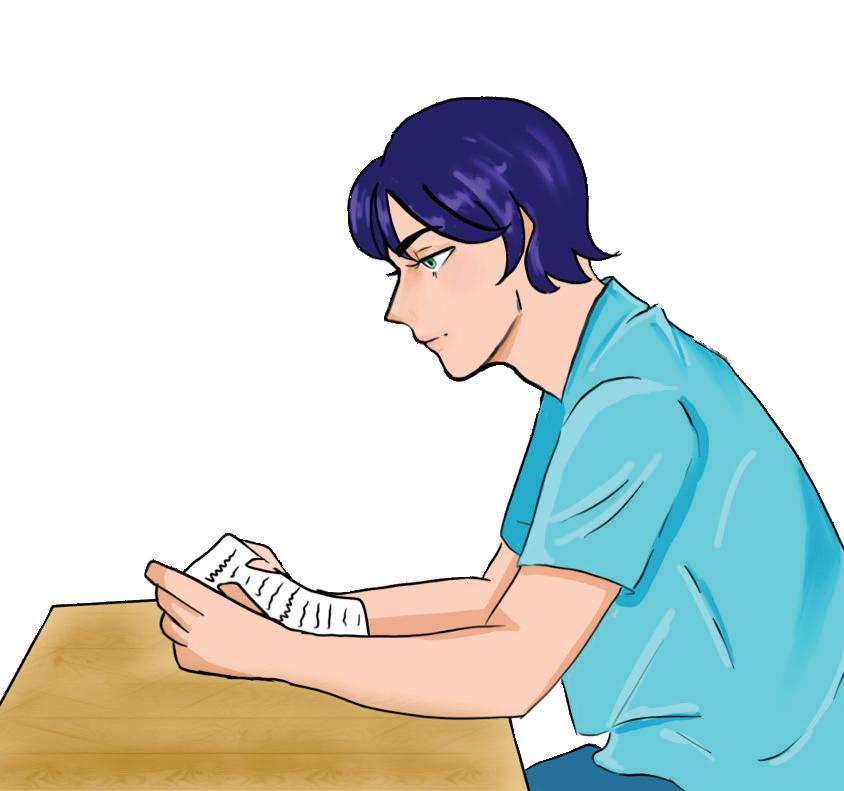
use ChatGPT when
A Chronicle Assistant Opinions Editor argues that with the rise of ChatGPT, the school should implement oral exams alongside the current in-class paper exams.
exams, the nature of this testing forces all students to come up with answers on the spot, prompting more critical thinking and scholarly conversation. Students must have a full grasp of the topic in order to respond beyond what an AI can produce, so those using ChatGPT to prepare will be far more disadvantaged than students using AI
In-class written assignments are not our only option.
on essays. Some college professors have advocated for impromptu oral exams to catch students off guard, where they cannot utilize pre-written AI responses, according to the New York Times. While this could solve the cheating issue with AI, it could also cause significantly more anxiety among the student body. One could argue that even announced oral exams would create more anxiety than an in-class essay; however, many of the school’s classes already have an existing built-in participation requirement. Additionally, it’s
They have already been incredibly successful in preparing students for Advanced Placement (AP) Language classes and for boosting student confidence. According to the school's 20222023 profile, the majority of students get 5's and 4's on their foreign language AP exams, and most exams require multiple oral presentations.

For other classes, however, the implementation would be more difficult, such as in literary analysis in English classes and coding projects in computer science. Even though oral exams cannot replace the value of written exams in these classes, they still serve as useful tools. For students who aspire to be software engineers, one notorious obstacle during job interviews is that applicants must solve a problem in front of the interviewer. Oral exams would offer students the ability to practice these skills in a lower-stakes environment.
Although oral exams are not perfect, we shouldn’t be locked into believing that in-class written assignments are our only options — instead, we should acknowledge the merits that
STATS AND FACTS
62.3% of students polled think the school should replace some written exams with oral exams.
Plan more field trips
By Hannah Shahidi
Classes at the school cover a wide range of topics in core subjects and additional areas of study. While some classes and programs take field trips, much of the content students learn often stays in the classroom, even though increasing the regularity of field trips could greatly benefit many students.
Field trips can help students in many different ways — they can bring students closer to their teachers and classmates, increase retention and understanding of different topics and give students real-world experience. The need for engaging field trips becomes increasingly relevant when students get to the Upper School, as these outings would allow them to better understand the nuance in topics that we learn.

With students being in an academically rigorous environment, it’s easy for us to get caught up in various assignments — memorizing facts
and strategies in preparation for assessments instead of fully absorbing content.
But it’s important that we recognize and establish the importance of real learning as opposed to idly consuming information in exchange for a good grade. The school is preparing its students for their futures in the real world, and an essential part of this mission is creating meaningful and long-lasting educational foundations.
Having field trips on a more regular basis can ensure that students are retaining the knowledge that they receive, rather than just forgetting that information after an exam. In addition, field trips can provide a much-needed break to students in the midst of constant schoolwork. By allowing students to get out of the classroom, students will feel more motivated to learn, which will provide them with longterm motivation and prevent constant burnout.
"Oral exams are an effective way to demonstrate understanding of a topic, however, I don't believe that they should be implemented as the singular method."
- Daniella Goldrich '23
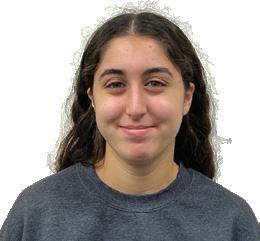
18.9% of students polled think that oral exams could be implemented in all subjects.
"Thinking out loud is an easier way to gather your thoughts and I have an easier time connecting ideas."
- Hannah Carbunaru '24
108 students polled
A Chronicle Staff Writer argues that the school needs to integrate more field trips into the curiculum to help students actively engage with the content they are learning while getting to know their peers and teachers.
Some classes at the school already hold field trips for students during the day, such as Advanced Placement Environmental Science (APES) and Honors Art History. In APES classes, students have visited the Franklin Canyon Reservoir and several beaches in the Los Angeles area to learn more about the content they study in the course.
For many History and World Language classes, students can choose to attend trips with their classes over spring or summer break and visit both domestic and international destinations with their teachers and classmates.
It is this kind of reinforcement that ensures students will be able to remember what they’ve learned. However, students shouldn’t have to sacrifice their spring or summer vacation in order to have these experiences, and the trips should be a more integrated part of the curriculum.
Of course, there are subjects that this can’t be applied to — having field trips wouldn’t have the same benefits in a math class as it would in a history class. History classes can visit museums like the Getty or the Hammer Museum, science classes can visit reservoirs or professional lab spaces and English classes could visit libraries to see original manuscripts of books in curricula.
While there is definitely value in visiting other cities and countries around the world, it is not the only way that students can get exposure to real-world experiences. We attend school in one of the largest and most diverse
cities in the world, and we should be taking advantage of what is available to us.
LA has over 1,200 historical landmarks and museums, and we should utilize them to improve our curricula and provide new experiences to students. We should be using LA to our advantage and explore our surroundings frequently.
If the school implements more day-long field trips in a larger variety of classes, we will be able to get out of the classroom more and gain real-world knowledge, providing the student body with tremendous long-term benefits.
hwchronicle.com/opinion Opinion A11 Feb. 8, 2023
ILLUSTRATIONS BY JADE HARRIS
Road work begins on Coldwater
By William Liu
Williams Pipeline Contractors will begin a year of construction to replace an aging pipeline on Coldwater Canyon Drive on Feb. 13. The street will only have one lane open in each direction from Rexford Drive to Monte Cielo Drive, and work is expected to finish in April 2024.
Upper School Student Discipline and Attendance Coordinator Gabriel Preciado emailed all upper school students regarding the change and possible traffic flow disruption Feb. 3. Preciado said he is unsure of how the project will impact commutes to the school.
“I’m not sure how broad the impact of this project would be,” Preciado said. “The construction project begins at 8 a.m., so my hope is that before that time, drivers are open to freely move through. But it could be that construction rushes to be there before then, which could mean more traffic.”
Lila Daoudi ’24, who drives herself to school, said the new commute will probably lead to more traffic.
“[The construction project] is definitely going to delay my route to school,” Daoudi said. “I take Laurel Canyon, but there’s probably going to be an increase in traffic. The left-hand turn on Ventura already takes me upwards of 10 minutes. The fact that it’s only going to get worse kind of sucks. People are also going to be stressed about being late, which will lead to worse driving.”
Preciado said the school will make adjustments based on how the project impacts student routes.
“Our sense is that we should always make adjustments, including teachers, faculty and staff,” Preciado said.
School holds event to thank community
By Alex Dinh and Olivia So
The school hosted an event to thank community members for supporting the River Park project Jan. 25. Participants spoke with the school’s faculty, administration and prefects about River Park, and President Rick Commons addressed the crowd in a speech. Community partners at the event included the Tataviam Band of Mission Indians, Special Olympics, Angel City Sports and Friends of the LA River.
The city government examined the River Park project’s Draft Environmental Impact Report (EIR) last spring and determined the project will have no significant negative environmental impacts, according to Head of Communications & Strategic Initiatives Ari Engelberg ’89. The school is finishing the final EIR in the coming months, and upon its completion, there will be a series of meetings between
the school and the city to determine if the project is approved to start construction.
Sophomore Prefect Eric Lee ’25, who attended the event, said he valued talking to community members who hold different perspectives about River Park. He said they provided valuable insight into the development of the facility as a whole.
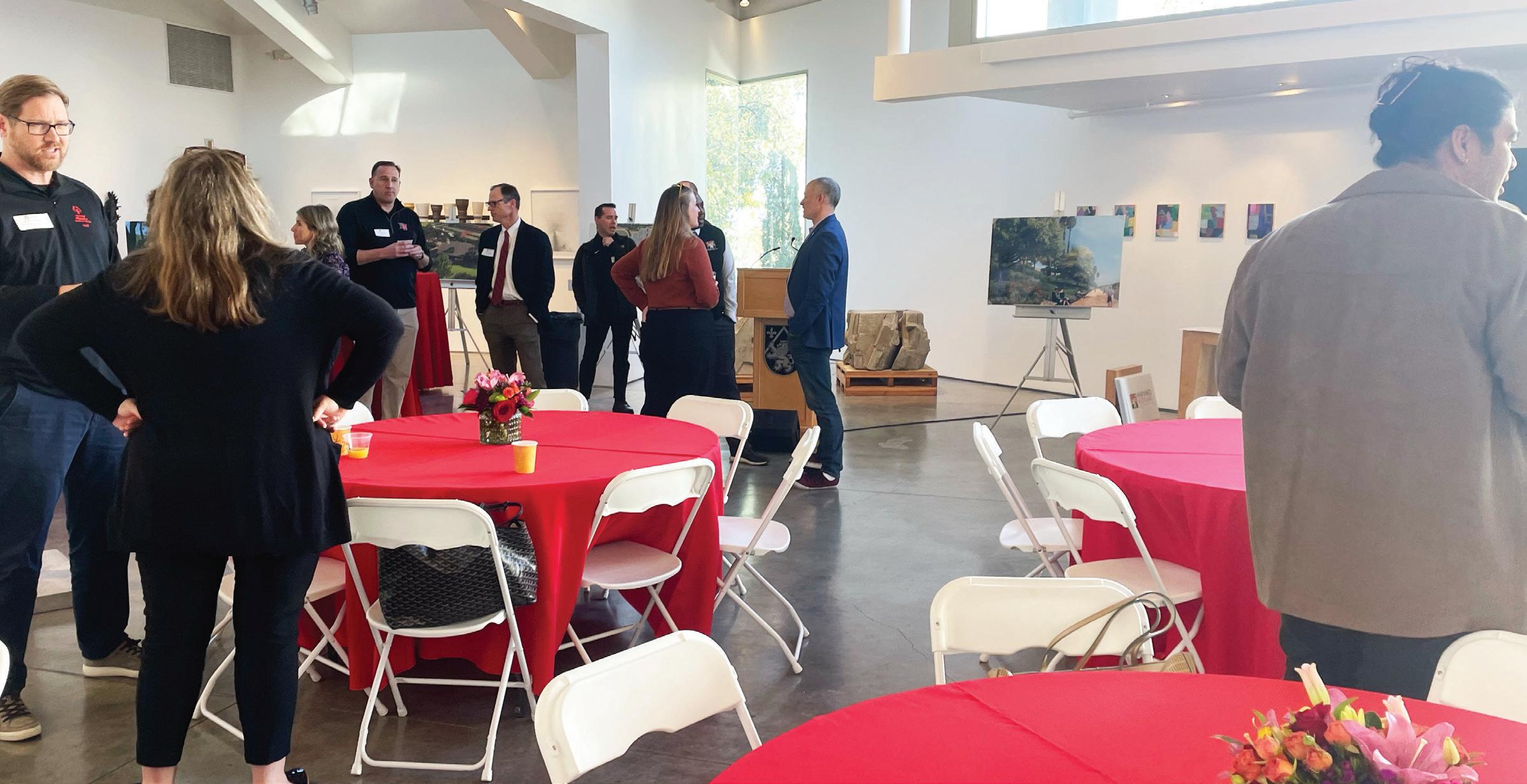

“It felt really good to interact with the whole community because you get a lot of different perspectives,” Lee said. “The Friends of the LA River look at things from the perspective of how it impacts the LA River, whereas the Native American tribe might view it from a cultural perspective. It was really great getting to see how different people viewed River Park because it allowed me to better understand what the communi-
ty’s overall opinion might be on the development of the facility.”
Lee also said once the project is completed, it will greatly benefit the school community by providing convenience to students, especially athletes.
“[River Park will] be a great benefit to future athletes,” Lee said. “[The athletes] will be able to get better practice times and be able to get home earlier. I feel that [the project] will be a great benefit to the HarvardWestlake community.”
Engelberg said it was a refreshing experience to be able to talk to neighbors who are in favor of the project.
“It’s been very gratifying to hear members of the community voice their support about River Park,” Engelberg said. “We’ve all seen the yard signs and the social media posts from the project’s opponents, and we’re fully aware
that there are those who oppose River Park, but there have been lots of neighbors and community partners who were previously unaffiliated with Harvard-Westlake who have come out to support what we’re planning to build, and those expressions of support are certainly helpful to the project.”
Director of Community and Public Affairs Stacy Marble said the River Park project fulfills the school’s mission statement. Marble connected the project to the mission of purpose beyond ourselves at the school and expressed optimism in having a home for not just students but also organizations as well.
“[This project] is a testament to our mission of purpose beyond ourselves,” Marble said. “We are able to create 16 acres of land to be used not just by our students but by some wonderful community organizations that will call the River Park home.”
LA’s heavy rain creates mudslides
Over 20 inches and eight atmospheric rivers of heavy rain across California caused mudslides throughout January, leaving Mulholland Drive between Laurel Canyon Boulevard and Coldwater Canyon Drive closed until further notice, according to the City of Los Angeles. Mudslides are often caused when water rapidly fills on top of a steep slope and places excess pressure on the rock, according to the U.S. Geological Survey.

Science Teacher Nancy Chen, who has a Master of Science in Geology from California State University-Fullerton, said the drought that came before the heavy rain made mudslides more likely to occur.
“The drought we’ve been experiencing has made our ground a lot drier,” Chen said.
“That means that the soil is not adapted to a sudden influx of
rain. A couple of sprinkles here and there won’t cause much damage because the water will get absorbed. But because of the record-setting rain [on dry land], the ground is unable to absorb water fast enough.”
Mudslides generally occur where wildfires or human modification have destroyed vegetation, according to the California Department of Public Health.
Science Teacher Ryan Ellingson said the increased rainfall is also an effect of climate change.
“The tropics are always warm, whether it’s El Niño or not,” Ellingson said. “Atmospheric rivers on the West Coast are not unusual, but it’s also [because of] climate change. Climate change is making [the rain] stronger and more frequent.”
Chen said that although she wasn’t directly affected by mudslides, she understands the effects they could have on homes and infrastructure.
“I can imagine for people who live in the mountains, or live [at] the bottom of mountains where most of the accumulation of mudslides occurs, it’s going to affect them,” Chen said. “The large amount of precipitation also does affect our electricity, especially the power supply to certain communities.”
Sasha Gadalov ’25 said the mudslides are still negatively impacting her commute to school, since she has to take detours to avoid the mudslides.
“I used to take Mulholland [Drive], but now it’s closed halfway to Coldwater Canyon,” Gadalov said. “Instead, I have to go down Beverly Glen, but now I’m stuck in over 10 minutes of traffic every day, taking away from the time I used to have to eat breakfast and interact with my friends. I always looked forward to that breakfast, but now I have to be stressed about barely making it to school on time.”
Community The Chronicle • Feb. 8, 2023
ALEX DINH/CHRONICLE
RECOGNIZING RIVER PARK’S PARTNERS: The school’s administration hosted an event for River Park’s partners to thank them for their support on Jan. 25. Attendees included the Tatviam Band of Mission Indians, Special Olympics, Angel City Sports and Friends of the LA River.
• Continued on hwchronicle.com Accumulated Precipitation - LOS ANGELES DOWNTOWN/USC, CA WEATHER.GOV
L. Wood Eric Lee ’25

Features The Chronicle • Feb. 8, 2023 BLACK HISTORY MONTH PRINTED WITH PERMISSION OF RYANN CASTANON-HILL • Continued on B2
Lessons in Representation
By Averie Perrin
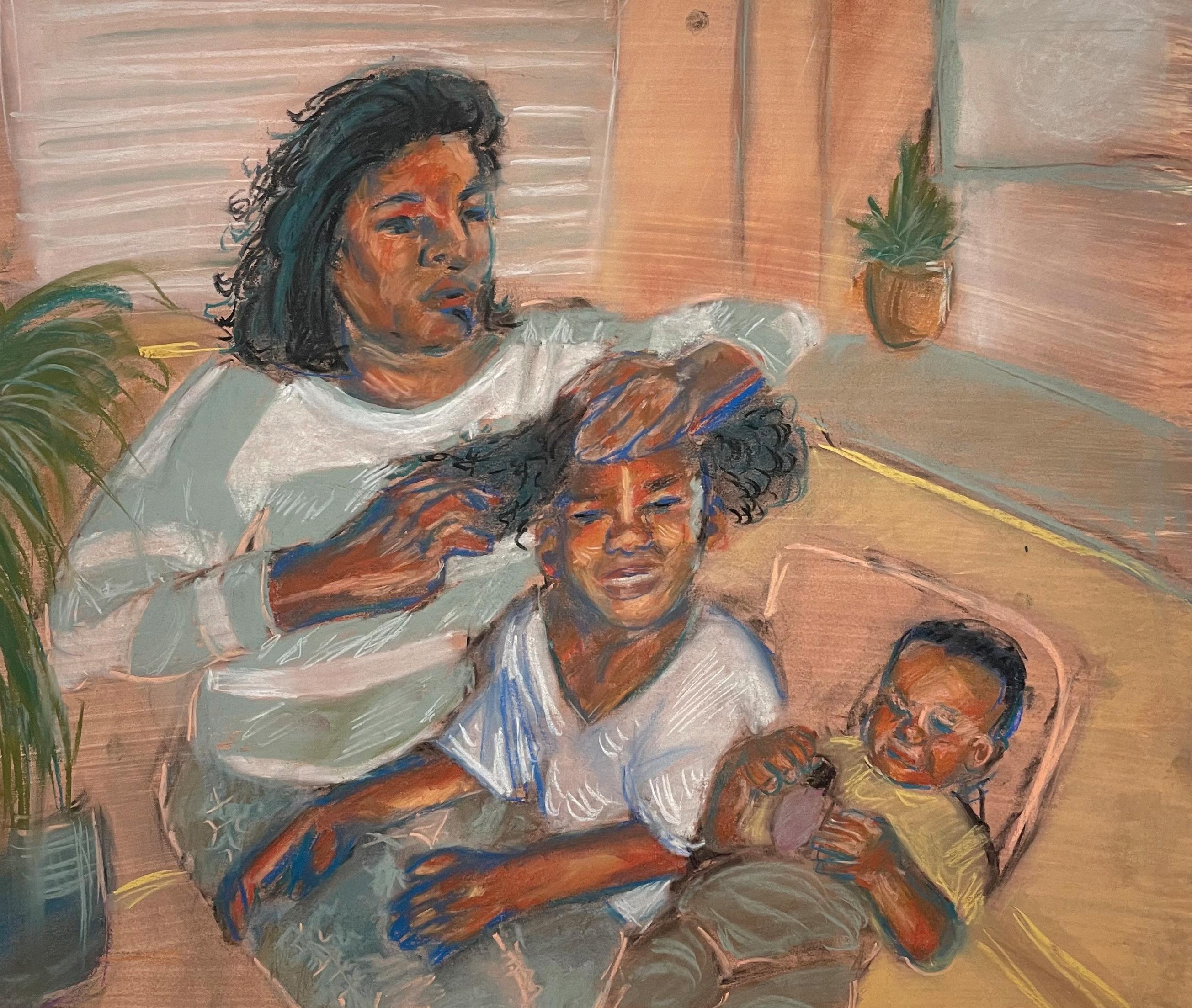
The school’s celebration of Black History Month in 2023 marks almost four years since the administration adopted its Anti-Racism Plan in response to student demand for anti-racist action in the 2019 school year. The plan was devised to bolster diversity, equity and inclusion (DEI) work, reevaluate curriculum and create more educational opportunities, according to the administration’s 2020 announcement. Since then, DEI has become a priority iniative for the school. It now has a Diversity Council made up of Department Heads and 14 student affinity groups that hold “lunch and learn” discussions and mandatory DEI curriculum planning for each department.
Black Leadership Awareness and Culture Club (BLACC) Communications Leader Hunter Bridgett ’24 said she recognizes administrative efforts to incorporate more diversity in schoolwork but believes there needs to be a shift in the school community’s perception of these initiatives.
“This school is so diverse, and there are so many perspectives we need to highlight,” Bridgett said. “Of course, we want more representation across the board, but right now, [with] what the school has done, there’s obviously a lot of progress that has been made. It’s not that the curriculum needs to change right now, it’s the attitude of the student body and the teachers when confronting that curriculum. It’s not just something that everyone needs to ‘get done’ and just move on [from], it’s realizing the importance of Black perspectives and any other perspectives.”
Bridgett said efforts of teachers to stick to this plan of representation often seem forced and would be more impactful if the reasoning for more inclusivity was explained.
“It’s obvious that the school has implemented some sort of plan, because in every subject you can definitely see at the very minimum forced diversity that they have to incorporate in their lesson plan,” Bridgett said. “It works best for the teacher when we understand the importance of sharing a diverse curriculum
we teach why it’s important. Kids may not understand why we’re highlighting these experiences, and the Black authors we address in English and History classes, but it’s important for the teachers to make a point of saying that [students] need to learn from diverse perspectives. That’s how they are going to be best accepted by the student body, when [students] realize there’s a ‘why’ behind it, and it’s not just more busy work.”
Bridgett said she sees work being done to make the school community more inclusive but also feels there are things that still seem exclusionary.
“[People] are always trying, but there are aspects of school that don’t feel inclusive,” Bridgett said. “That can be just like socially, it could be in your mind, it can be passive aggressive, but that’s harder to point out. There’s a large progress push by the faculty for [inclusivity], at least in the schoolwork aspect.”

Student Leaders for Inclusion, Diversity, and Equity (SLIDE) member and BLACC Leader Hannah Messaye ’23 said she would like to see more diversity in faculty and staff to help students of color adjust and feel more at ease.
“It’s important that students find someone that at face value can connect with them, whether that’s having a Black teacher or having an Asian teacher, or whatever else, in any class,” Messaye said. “Having that connection in general can make it easier for students, especially those who are struggling and those who are minorities, to often times feel more comfortable. There’s just this perception around teachers and minority students,
and these students feeling some sort of way about going to teachers, and that can be mitigated just by having more diverse staffing.”
Messaye said that having a teacher of color helped her build relationships that improved her academic experience.
“It’s really cool to see how having teachers of color can be really beneficial, because in ninth grade, I had [History Teacher Lauryn Nichols] as my history teacher, my first year here, and to this day, she’s one of my favorite teachers,” Messaye said. “I took two of her elective classes in 11th grade, and she wrote my college recommendation. That immediate connection that you can feel with teachers is really important and can really be emphasized even more when you have those teachers of color and minorities in general.”
Head of Diversity, Equity and Inclusion Janine Jones said that she has seen growth in Black representation in the school’s faculty.
“We’ve grown substantially in the number of Black teachers that we’ve had here at Harvard-Westlake,” Jones said. “Since I have a daughter who graduated in 2018, I know when she was here in 2012, we may have had one Black teacher. Now, we are well above just one Black teacher on staff.”
Jones said that the hiring process now also includes an evaluation of a candidate’s interest in including DEI with-
in their teaching.
“For teachers that come into Harvard-Westlake, it used to be that people would be hired and we wouldn’t ask them questions about curriculum about DEI specifically,” Jones said. “Now we ask every single person who’s hired by Harvard-Westlake some sort of DEI question as part of their process, and we’re really looking for people who, at least at a bare minimum, have a willingness to understand it’s important.”
Jones said the school makes many efforts to specifically better understand the Black experience.
“We try to have broad initiatives in the DEI office that will be applicable to numerous members of our community, but we also know groups can get ignored and lost if we are also not having specific attention paid to particular groups and trying to meet their unique needs,” Jones said. “So [there’s] a lot of surveying and understanding how different members of the community are feeling by each demographic, because that’s not something that we’ve always done, not only by putting a survey out there, but then disaggregating the survey results by demographic is critically important for us and having people on staff who understand the Black experience and who have the skill set to support Black students.”
In 2021, almost a year after the implementation of the school’s Anti-Racism Plan, former New York Times Journalist Bari Weiss released an article in City Journal called “The Miseducation of America’s Elites,” criticizing the school’s DEI activism in curriculum and “Wokeism.” The piece detailed a group of school parents under pseudonyms who disapproved of the school’s ways of teaching about race and generally sought to fight these changes. The article referenced an anonymous Instagram account, @ wokeathw, allegedly led by these parents, along with students and faculty, with the purpose of “documenting the self-destruction of an elite private school,” according to their account bio.
Since then, Jones said the DEI office has found ways to assess biases in the community. She said she has seen changes in community members’ approaches to diversity. “I see more of a willingness to appreciate and understand difference and to not see difference as a deficit but to see difference as something to be celebrated, acknowledged and recognized,” Jones said.
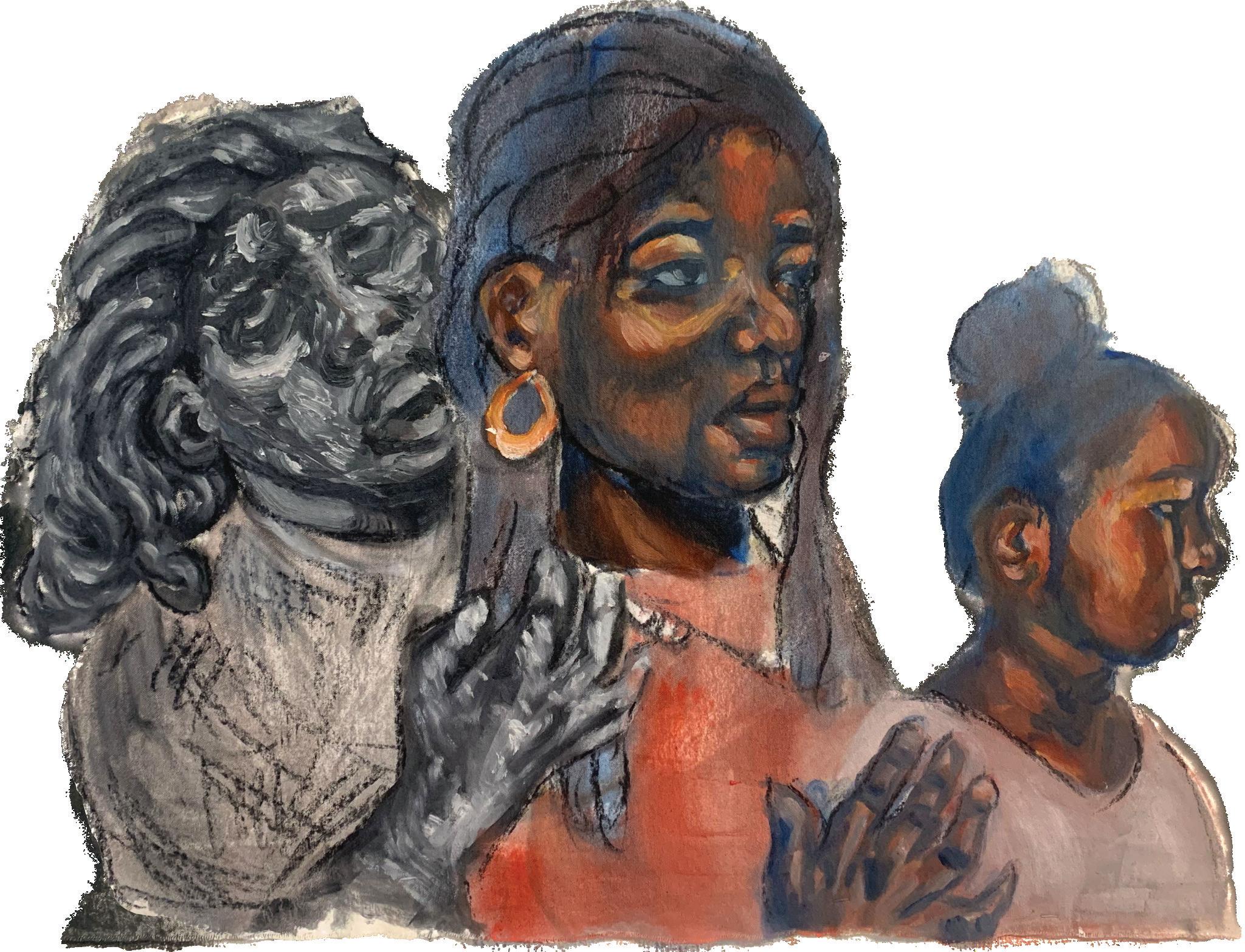
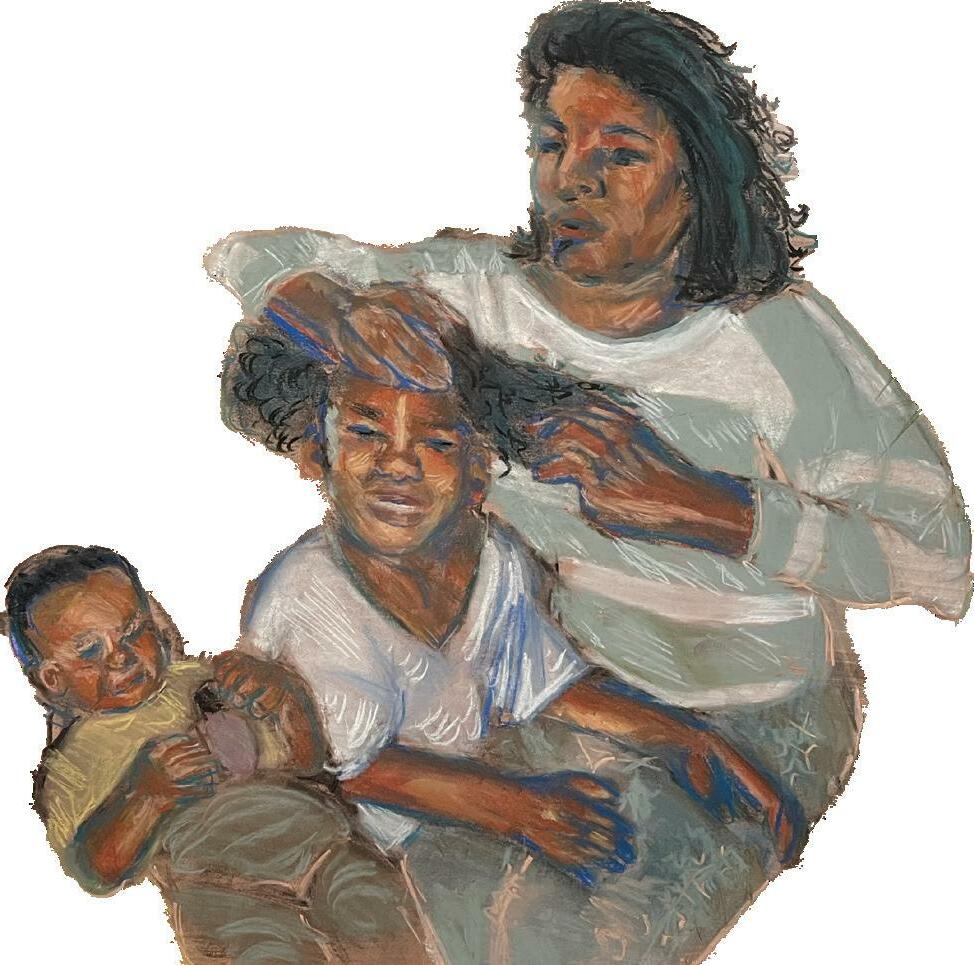
Feb. 8, 2023 B2 Features The Chronicle
PRINTED WITH PERMISSION OF RYANN CASTANON-HILL
During Black History Month, students and faculty discuss the importance of highlighting the Black experience in the school curriculum.
Continued on hwchronicle.com
•
a cause
For college
the school, Kim and his friends raised nearly three thousand dollars, which they used to help build a kitchen for an orphanage in Guatemala. Kim said he found out about the issues in Guatemala through his dog groomer.
“My dog groomer was using all his tips to donate to this orphanage, which was pretty inspiring,” Kim said. “He didn’t have much, it’s not like he makes a bunch of money, but he’s still willing to donate to this organization. After the art sale, I also did a cloth-
throughout the admissions process.
“It’s not an issue with the people making charities but one with the colleges themselves accepting it as a reason to let them into the school,” East said. “If that is an opportunity for you to get a leg up, then I don’t see an issue with people with more money doing it. I just think it’s a problem that it can give you a better chance at getting into college, and I think colleges should make it more even, regardless of how much money you have.”
Despite the common belief among students that creating a nonprofit organization will help in the college admissions process, Upper School Dean Teneice Wesson said there can also be drawbacks.
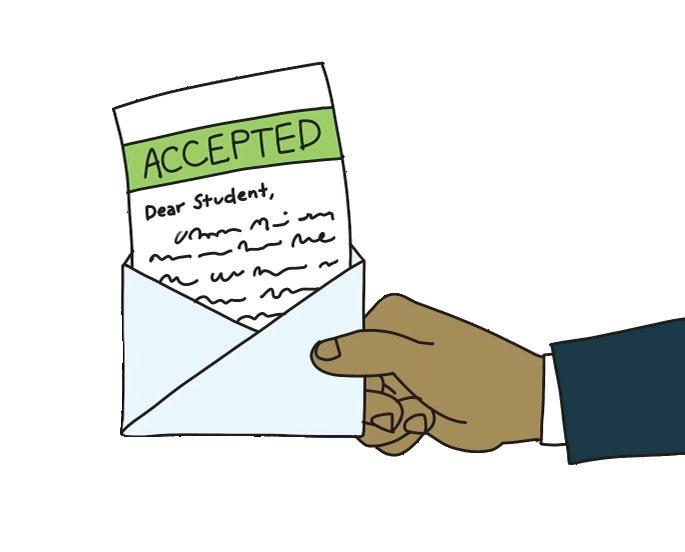
ence of giving back was gratifying.
“When I was there, I was taking Polaroids for the children,” Kim said. “And I remember all of the kids being super appreciative. There was this one little girl who gave me her favorite rock, and that was a pretty cool moment.”
While Kim said he cares deeply
“It’s not always the case that making a nonprofit will immediately make a student more competitive in the college admission process,” Wesson said. “If a student is heavily involved in something that they’re using as a part of their overarching narrative when applying for school, and they create an organization to expand whatever their focus is to other people, then that’s going to be received by college admission offi-
wanted to have a platform of my own. I was asked to speak at the United Nations, and that’s when I decided it was time to launch my own nonprofit.”
Almost five years later, Griswold is the founder and President of Future Generations Now, an Internal Revenue Service-recognized 501(c)(3) nonprofit organization with the stated goal of raising funds and awareness for issues surrounding education, equity and the environment.
For her work over the past few years, Griswold received the honor of 2022 United Nations Global Youth Humanitarian, something she said she couldn’t have done without support.
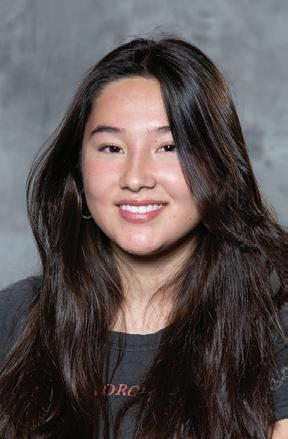
“I’ve worked with the UN relatively closely,” Griswold said. “I’ve spoken there one or two times in the past. They sent an official letter asking me to come to New York to speak and accept the award, and it was very surreal. It’s great to be recognized for all the work that I’ve done over the years, and I’m very appreciative of everybody who helped me get to this point.”
Throughout her involvement in community service at the school, Gris wold said she has seen many other students develop charitable or ganizations only to later abandon them, some thing she said can be attributed to the orga nization’s founder hav ing different priorities. While some of these organizations do valu able work when they exist, Griswold said a lack of true passion can make any organi zation unsuccessful.
“The way I see [it is] if it’s helping anybody or creating some sort of good change, I have noth ing against it,” Griswold said. “But a lot of the time, they have ulterior mo tives. It kind of ticks me off when I see people that aren’t putting in the work, or sometimes it’s wealthy people that are funding it themselves and it fizzles out, because they can’t fund it forever. It also does give a bad rap to people who are trying to do legitimate work.”
While Griswold has been participating in charity work from a young age, other students, like Ryan Kim ’23, have become involved more recently. Through a spring art sale at
doing charity itself is altruistic no matter what the intentions are behind it, so I would consider it neutral.”

Cutter East ’24 said colleges should reexamine their priorities regarding charity and take equity into greater consideration
leadership roles within organizations might be a reflection of certain personality traits that that student has, and I think colleges are now trying to make the process more equitable by finding ways to focus on ways that students might even lead from behind.”
Feb. 8, 2023 B3 Features The Chronicle
“
Members of the school community discuss motives for student founded charitable organizations and their effects on the college admissions process.
“If you’re faking charity work or making things up, that’s not okay, but the bottom line for me is whether or not you’re actually making a positive impact on someone.”
— Ryan Kim ’23
ILLUSTRATIONS BY SOPHIA EVANS
L. Wood Skyler Griswold ’24
By Ella Yadegar and Davis M arks
Sixty anxious sixth-graders sat in a crowded boardroom facing a PowerPoint presentation at the Center for Early Education (CEE) in the fall of 2022. Greg Gonzalez, Interim Head of Admission and Enrollment at the school, paced in front of a picture of the lower school campus, describing the school’s academic, athletic and performing arts centers of achievement and excellence.
Gabby McHale, Director of Student Placement at CEE, oversees the admissions process of the sixth-grade class as they apply to middle schools. McHale said because CEE is a feeder school, students there might experience advantages when applying to a school with which CEE has a close relationship.
“We now invite the schools to come and make presentations to our sixth-grade students,” McHale said. “We do that with maybe 15 or 16 schools so that students have an opportunity to learn about a lot of di erent schools and have a special opportunity to connect with the admission department from each of the schools.”
McHale said in the past year, she has noticed an e ort by Gonzalez to expand the school’s reach to more elementary schools across L.A. and form strong relationships with them as the school has done with CEE.
“Gonzalez has done a really good job of visiting schools that
HIGHWAY TO
Administration, sta and students discuss the impact of developments in the school’s admissions process in recent years.
maybe weren’t visited before, and sort of creating new relationships,” McHale said. “And I think that’s always really important. One of the reasons [CEE] has been able to send so many students is because we have a great relationship with the school and it’s a really good next step for so many of our students.”
According to the admissions page on the school’s website, the school admits students from over 240 di erent schools, including public, religious, independent and international institutions. Gonzalez said during the fall and winter, he visited elementary schools and organizations across Los Angeles.
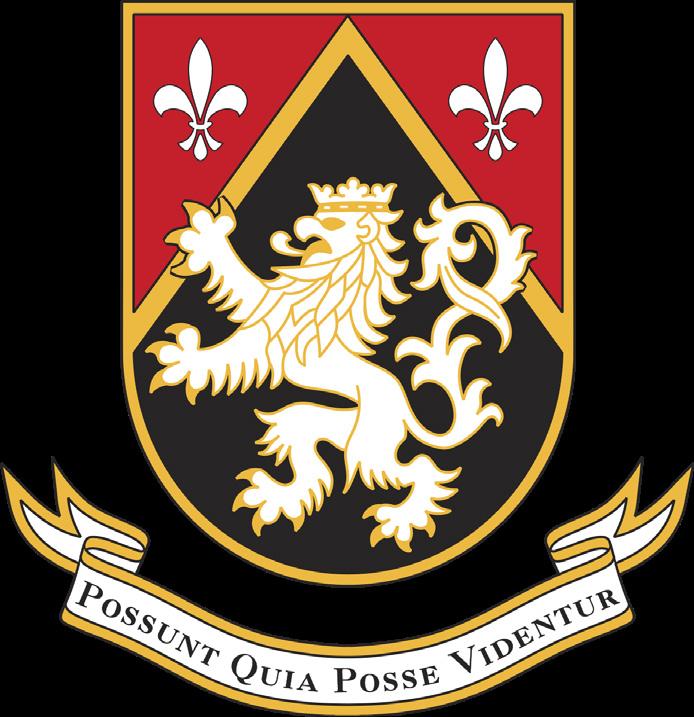
“I tried to see schools that traditionally send us lots of applicants and then perhaps go to a school that doesn’t send us as many applicants just to broaden our reach,” Gonzalez said. “We’re really invested in reaching the whole city and drawing the best applicants to our school.”
Traditionally, one part of the school’s application process has been an on-campus interview with a member of the Admission O ce, administrator, coach or faculty member. As a result of the COVID-19 pandemic, the school began to conduct interviews over Zoom. Gonzalez said the Admissions O ce decided in June of 2022 to make interviews online for the foreseeable future.
“We made that decision only because we just weren’t sure what was going to happen with COVID,” Gonzalez said. “Zoom just gave us exibility. It would have been very hard to ensure physical space and physical safety this year unless we had online interviews.”
Upper School Dean Sharon Cuseo interviews prospective students throughout the admission process. Cuseo said because of the age of applicants, applications typically reveal less about the student, so interviews are a carefully considered part of the admissions process.
“ e interview at Harvard-Westlake probably has more weight than the interview for college,” Cuseo said. “Part of that has to do with the fact that we

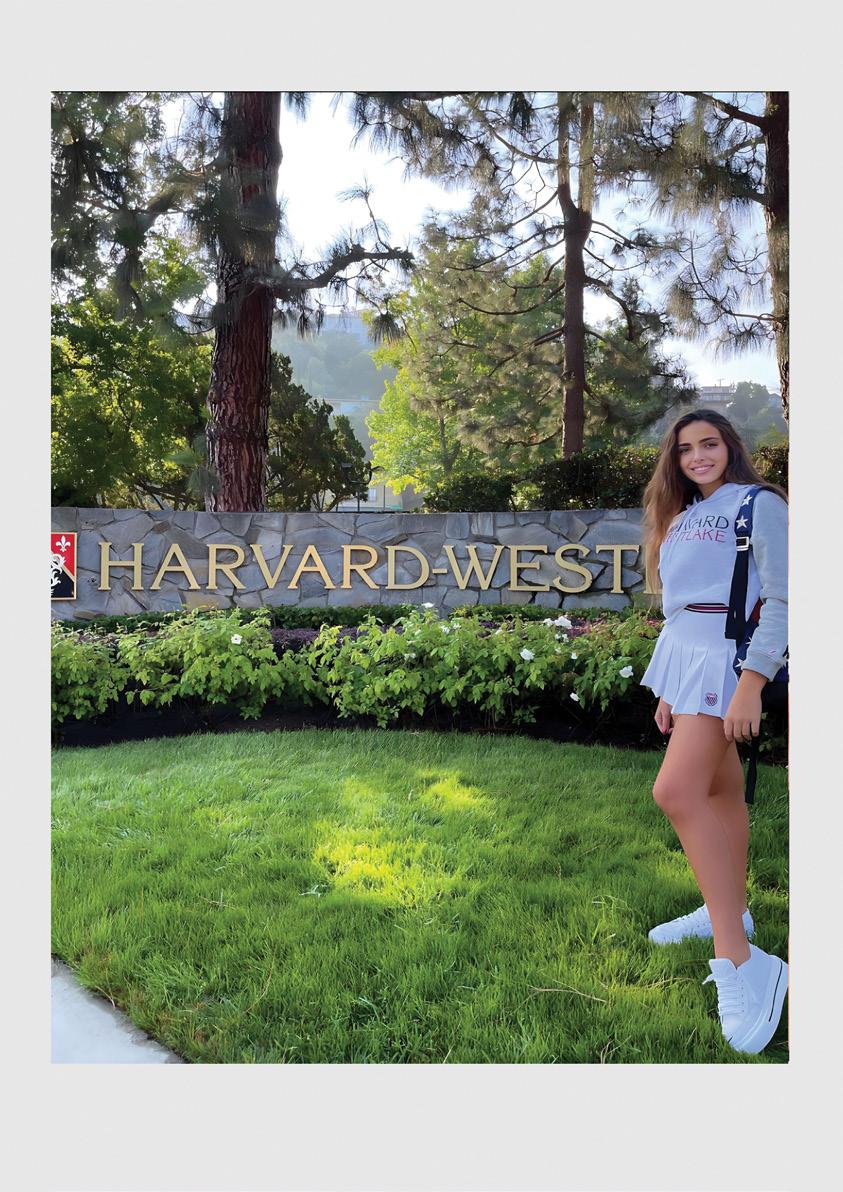

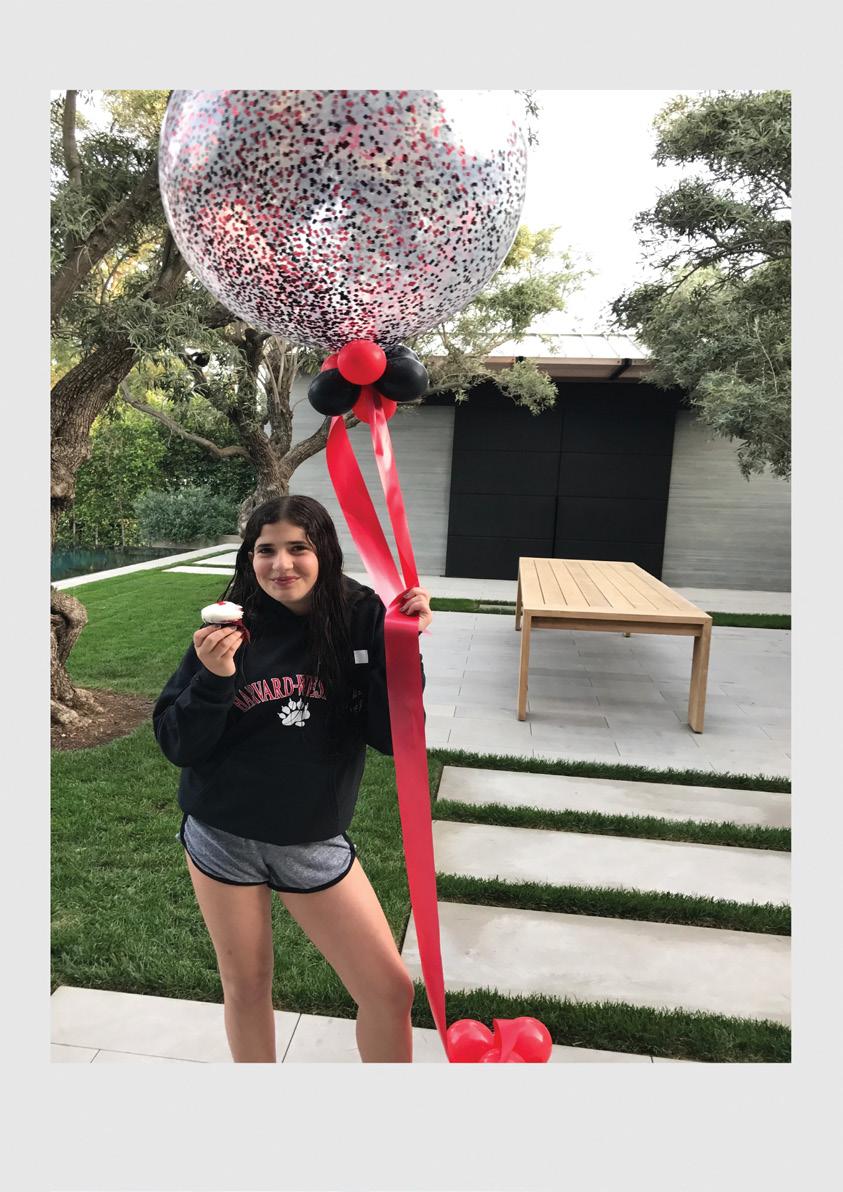
have less information [about applicants] because they are 11 or 12 years old. Most of their grades are good, what their parents write is glowing and their recommendations are good, so [the interview] is one of the di erentiating factors.”

Cuseo said the goal of the interview is to have a conversation and learn more about the applicant beyond their transcripts and extracurricular activities.
“I’ve interviewed for both Harvard-Westlake and colleges, and [interviews themselves] are remarkably similar,” Cuseo said. “ e best interviews are just really great conver sations, and the more con versational it can be, the more at ease the student will be and the better the interview goes. In interviews, we just try to gure out questions that provide deep er insight into their lives and personality.”
President Rick Commons said the school received a record number of applications for the 2023-2024 school year.
“This year our total number of applications was 1,378,” Commons said. “It’s our highest ever, and it’s higher than our previous [record] by almost 100. It’s around six or seven percent higher than we’ve been in the past, which is great. It’s great that our school is highly sought after, as we are a place that is built for students who are excited about school, what they can learn and opportunities to try new things.”
B4 Features The Chronicle Feb.
3/17/2017 8/24/2022
Printed with permission of Claire Paul Printed with permission of Tonya Hoodyakova
Printed with permission of Mia Morgan
HARVARD-WESTLAKE
e school admits 25%-33% of its applicants, according to the admissions website. Commons said because the applicant pool is so competitive, the school often has to reject students who would succeed.
“We have lots and lots of talented kids applying, which we hope continues, but that puts us in a position of having to say no to kids who would probably do very well here,” Commons said. “It’s a privileged position to be selective, and I think it’s important to the future of our school. We want to continue selecting not only for talent but also character and kindness.”
Gonzalez said there is no formula or perfect application that will lead to acceptance into the school.
“I hear a lot about a ‘Harvard-Westlake’ student,” Gonzalez said. “One of the best things about our school is that there isn’t a singular ‘Harvard-Westlake’ student. ere are many types of Harvard-Westlake students.”


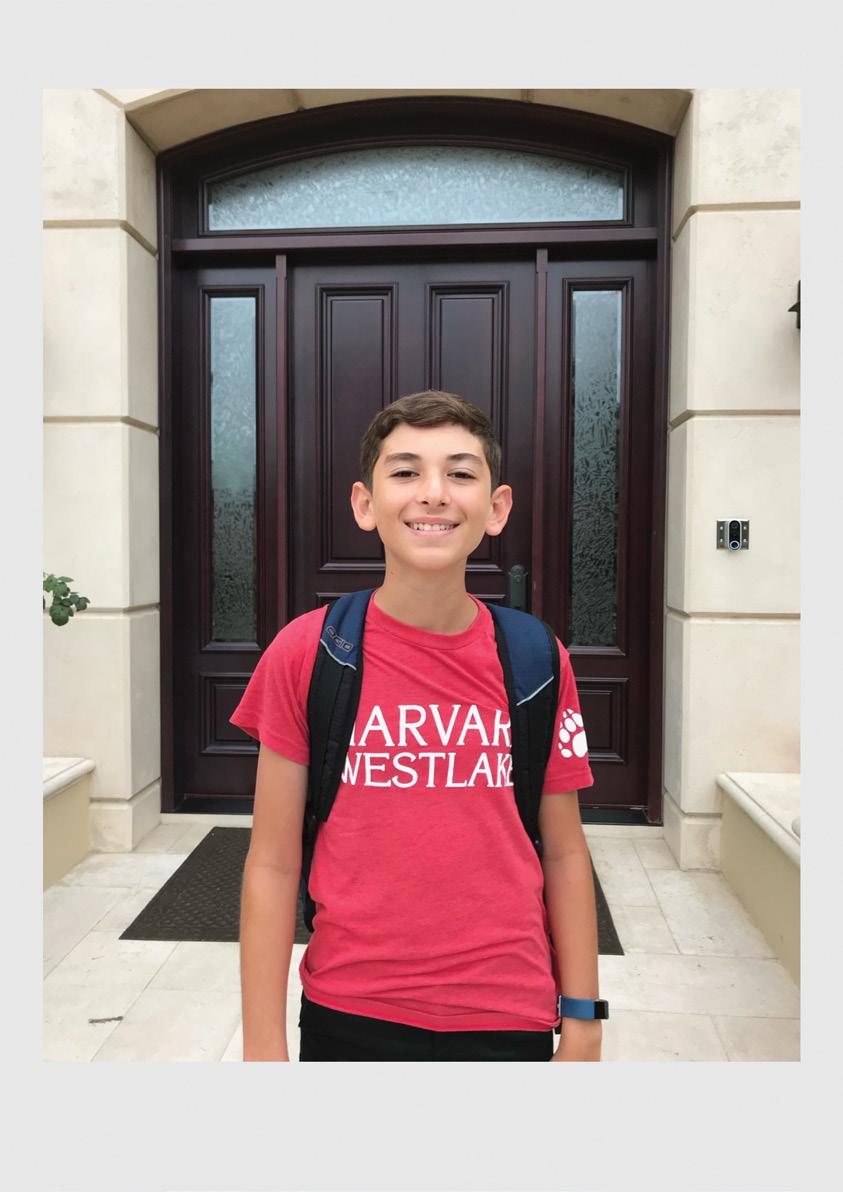
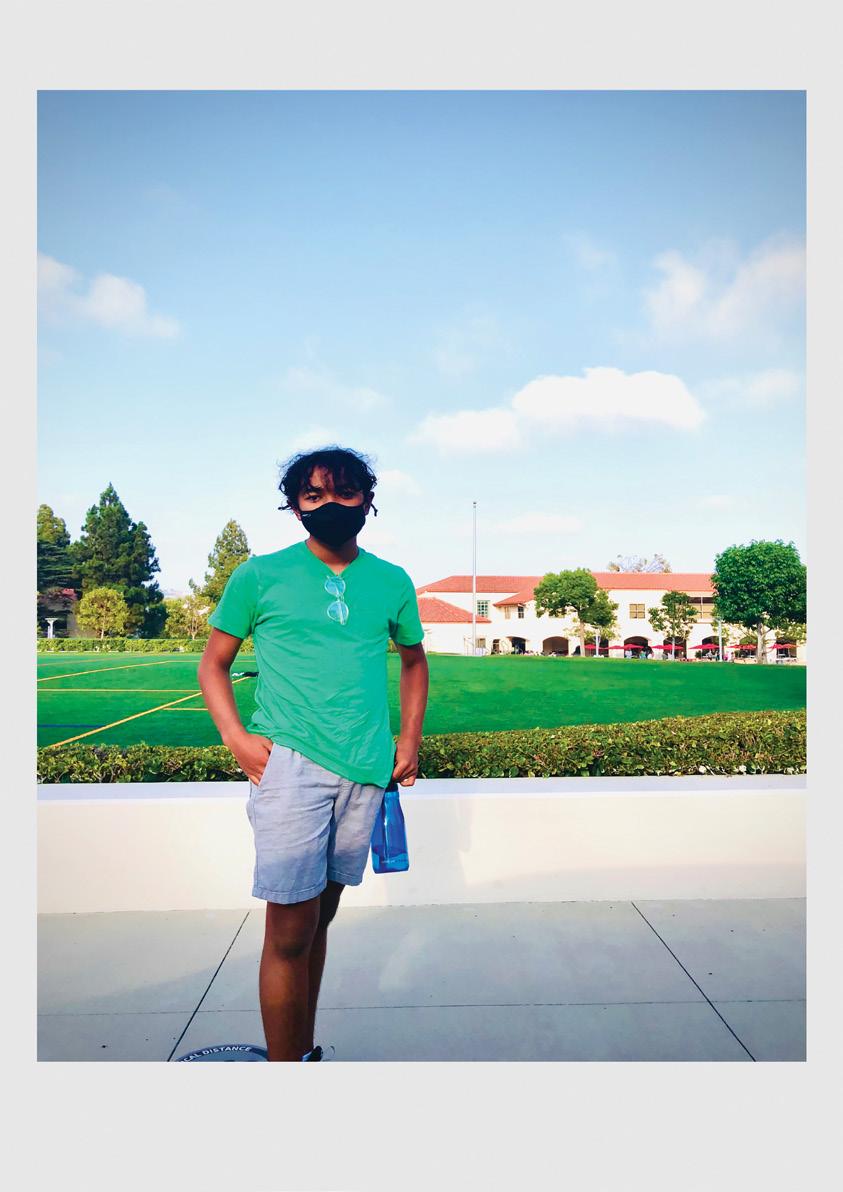
Gonzalez said a student will be a better candidate if their application and interview demonstrate that they are dedicated to learning, and coming from a feeder school does not favor an acceptance.
“What makes a good student for the school?” Gonzalez said. “I think number one, they have to be nice because we want nice people on campus. Number two, they have to really like school. Our students like being at school. eir idea of school isn’t just drudgery and classes, but it’s enlightening and engaging. ey have to want to be at school and want to
spend a lot of hours at school. And then nally, I think all of our students work hard. ere’s a baseline of work that they have to do.”
Like Gonzalez, Cuseo said the school takes into account the personality of applicants, and that this consideration has become a priority in recent years.
“What I love is that we are paying more attention now to wanting nice students,” Cuseo said. “I think we would be more likely now to look at a kid with perfect stats, and if they didn’t come across as a nice, open-minded and inclusive person, we don’t need that.”
The COVID-19 pandemic has also resulted in the school’s Admission O ce switching to an ISEE test-optional policy, just as many colleges have made the SAT and ACT optional. ough the school has opened its campuses for standardized testing, Gonzalez said the admissions department is not certain if ISEE scores will be mandatory for next year.
“We’re developing data regarding student performance and the depth of our applicant pool with and without ISEE test scores,” Gonzalez said. “ ere’s a lot to be discussed and debated, like if an SAT score is a good way to sum up a student. If we do go back to mandatory ISEE scores, we will read them, as we always have. It’s one slip of paper in a very large stack of papers. ere really is no score that will guarantee admission or no score that would guarantee a lack of an o er.”
Gonzalez said the Admission O ce is also working to emphasize the importance of the school’s diversity, equity and inclusion (DEI) policies to prospective families.
“DEI is front and center of our admission message,” Gonzalez said. “At every admissions event, we talk about what’s important to us. We discuss diversity and inclusion and we talk about the
community that we build, some times in classrooms, in a nity groups, in clubs and in sports. Especially, we discuss how we’re able to build a pretty cohesive community out of a fairly large independent school.”
Lily Stambouli ’24, who previously attended Mirman School, said while coming from a large feeder school provided a sense of security when joining a new community, it also limited her outreach.

“I went [to Harvard-Westlake] with my two best friends, along with about 12 other students from my elementary school,” Stambouli said. “I think it was a good experience because I was able to have support while I was [adjusting to] this new environment. However, since I already had my close friends, I wasn’t that good at expanding my social circle, and as everyone else was making [new] friends, I was behind in that. But I ended up making some really great friends towards the end of seventh grade as I branched out from my Mirman friends.”
Stambouli said even though she came from a feeder school, she does not feel as though she had a significant social advantage compared to students who came from smaller schools with fewer students.
“I didn’t really feel ahead compared to kids who were the only students from their old schools,” Stambouli said. “Everyone was coming into a new environment, [and even] if you’re coming with 10 other people from your school, [going] from a grade with around 40 kids to a
grade of 200 is a big jump. Everyone wanted to make friends in seventh grade, so I don’t think people were close-minded to the idea of accepting people even if they didn’t go to a feeder school.”
Unlike Stambouli, Nathalie Paniagua ’23 was the only student to come from her previous school. Paniagua said the Fast Start program organized by the Admission O ce and the various opportunities to get involved at the school has allowed her to make friends.
“[College and high school admissions] are almost the exact same process,” Paniagua said. “You just really engage with the schools, and I think that that is basically the same process that I’ve been going through since the end of my junior year for colleges.”
Features B5 hwchronicle.com/features 8, 2023
“ It’s a privileged position to be selective, and I think it’s important to the future of our school.”
3/16/2018 Printed with permission of Eric Vartany Printed with permission of Harvard-W estlake School Printed with permission of Micah Parr • Continued on hwchronicle.com
Rick Commons President
“Nepo-approved nepo-baby academy”
— New York Magazine’s “Where Should You Send Your Nepo Baby to High School?”
Students evaluate the culture of nepotism at school in view of Vulture’s December 2022 “The Year of the Nepo Baby” series.
By Averie Perrin
Bronwyn Vance ’24 stared at the TV screen as she watched the Golden Globes, anxiously waiting to hear the winner for Best Supporting Actress in a Motion Picture. When she heard that Angela Bassett (Bronwyn ’24, Slater ’24), her mom, had won her second Golden Globe for her role in “Black Panther: Wakanda Forever,” Vance screamed with joy. Bassett made history by winning the first Golden Globe for a Marvel Studios film.
Vance said she and her family were elated by her mom’s historic win.
“I’m really proud of her, and our whole family is so proud of her,” Vance said. “[For] a Black woman to win the award for Marvel was pretty amazing. Her performance was just so powerful.”
Bassett won the Critics’ Choice Award for Best Supporting Actress for “Wakanda Forever,” and her role in the film earned her a nomination for an Academy Award this year. Bassett’s husband, Courtney Vance, is also an award-winning stage, film and television actor.
Vance said her parents’ successful careers and talent inspire her but also set a very high standard for her and her brother.
‘You’re a whitewash because your parents are rich.’ With things like that, I don’t want people to think that I’m not black, or I’m not black enough, [or that] I’m not part of the community enough just because of my parents.”
Despite people’s notions of privilege in the lives of nepo babies, Vance said her parents’ demanding jobs can take away from their family relationship.
“Since their jobs and their lives are so busy, they weren’t and have not been around very much in my childhood,” Vance said. “Even in high school, I grew up mostly with a nanny for most of my life, just because my parents weren’t really able to be there because they were working so much and had to travel so much.”
In addition to school connections to the film industry, some students are related to influential figures in the sports world. Christian Horry ’24, the son of seven-time NBA Championship winner Robert Horry, said people often treat him differently once they realize who his dad is. Horry said he worries that students’ celebrity intrigue will lead him into shallow relationships.
“I was called a ‘nepo baby’ last week, which is fine, I am a nepo baby, but I’m not really in the spotlight. ”

“I’m so proud of them, but [their success] also instills a precedent for both me and my brother to also achieve a lot in our future,” Vance said. “It’s kind of hard because I want to achieve as much as they have and I don’t want to let them down, in a sense, because they’ve done so much. ”
Bronwyn Vance ’24
“I don’t go around telling people who [my dad] is, so usually, when I’ve already established a friendship with somebody, and then they find out, they pretty much treat me the same, but for those who already know, it’s just like they kind of have an incentive to become friends with me, so that will kind of be the basis of the friendship,” Horry said.
In December 2022, Vulture released “The Year of the Nepo Baby,” a series of articles describing the presence of family connections within the Entertainment industry. The article identified popular schools for children of these well-known people, one of which was Harvard-Westlake. A photo of the middle school campus was featured as the cover image for the article titled “Where Should You Send Your Nepo Baby to High School?”
Lily Collins, Ben Platt and Jake and Maggie Gyllenhaal are just four of the alleged nepo babies who earned their diplomas from the school and are now making strides in Hollywood.
After this article came out, Vance said people accused her of being a ‘nepo baby,’ and though she understands why she was, she believes the label does not take away from her other struggles in life.
“I was called a ‘nepo baby’ last week, which is fine, and I understand that I’m privileged, and like, I am a ‘nepo baby,’ but I’m not really in the spotlight,” Vance said. “If you see me on the street, most people won’t be like, ‘Oh, my gosh, let me take a picture of you.’ I do have a lot of privilege and a lot of status in life, and it’s great, but it’s not like, ‘oh, I’m famous because my parents are.’ I still have to make a life for myself outside of my parents.”
Vance said some people have shallow and biased opinions of her because of her family.
“Sometimes, people don’t really value a friendship or people sometimes see me as just a ‘nepo baby,’” Vance said. “People also [say], ‘Oh you’re rich, so that takes away from your Black experience.’ Or, ‘You’re rich,’ or
that really came with [having an athlete parent] was that he would be gone a lot because of work and would have to travel a lot,” Horry said. “Sometimes it’d be just me and my mom, but other than that, now that work has started to slow down, I’ve really been able to be with him. It’s been great. I’ve been able to go to NBA games, go to NBA All Star games and do things that I normally wouldn’t be able to do.”
While Horry said he recognizes the benefits of his dad’s status, Angie Guetta ’25, the daughter of French DJ and music producer David Guetta, said her dad’s career brings her unwanted attention.
“I think a lot of people are attracted by [my dad’s fame] and hence treat me differently,” Guetta said. “I try to surround myself, at least in my close friends, with people that don’t really pay attention to my dad’s popularity and are friends with me for who I am as a person.”
Guetta said she does not see herself joining the entertainment industry in the future because she wants to make her own name for herself.
“I don’t picture myself working in that world, firstly because of seeing how much work my dad puts in,” Guetta said. “I think it’s essential to be incredibly passionate, even kind of fanatical [with] any job in that industry. Whether [you are a] singer, actor or producer, it demands a strong ardency and perseverance. Also, it’s difficult in my opinion to be part of the music world for a living, because I would always be compared to my dad and his achievements, and one of my main ambitions for the future is to be successful on my own and not under my parent’s shadow.”
Horry said there are unfortunate costs of being the son of a celebrity, but he also noted the benefits of having a parent who is renowned for the activity he enjoys as a student. Horry, who plays on the Varsity boys basketball team, said his dad is his mentor for basketball and gives him valuable feedback.
“If I play badly one time, I’ll just immediately go and talk to my dad,” Horry said. “He’s usually at every single one of my games, so he’ll also give me advice while I’m on the court. I just look at him, and he will signal something, like ‘do defense’ or something about a jump shot, or something that he sees on the floor. He’ll communicate it to me. So the best thing is that with my dad being as good of a basketball player as he was, [he is] able to relay the information to me and make me better as a basketball player. It’s really special.”
Horry said even though his father is considered by many to be a legend of the sport, he does not feel much pressure from his dad to excel in basketball.
“My dad doesn’t really put a lot of pressure on me,” Horry said. “He just wants me to be the best player I can be, whether that’s to become better than him, worse than him or the same player he was. He’s not really about pressure.”
Robert Horry was recently ejected from a basketball game against St. Francis that his son was playing in for yelling at the referees, according to a video obtained by TMZ Sports.
Horry said his dad also tended to be busy during his childhood, but he has recently been able to connect more with his father.
“Growing up, the only problems
Noa Blackman ’25 said she read the Vulture Article and was interested by the mention of the school.
“I saw that they specifically said when people went to Harvard-Westlake and Crossroads [School],” Blackman said. “I found out that a bunch of people that I didn’t know went here and also thought it was cool that they specifically mentioned our school. I feel like we all already knew that people have certain ties to the industry, but I didn’t realize how connected it was to our community.”
Blackman said students with wellknown or famous parents are treated differently than regular students.
“I definitely think [these students] have different experiences, because obviously, when you have that name, that makes a difference,” Blackman said. “I was just talking to my friend Alexander Puck ’25 [Wolfgang Puck’s son]. He told me his dad got asked to cater for the Harvard-Westlake cafeteria, so it definitely makes a difference, but Harvard-Westlake is kind of accustomed to it in some ways, and it doesn’t make a difference with individual teachers.”
English teacher Jeremy Michaelson said he was surprised by the large presence of the entertainment industry at the school when he unknowingly criticized the work of one of his student’s parents.
“One year, I was teaching a book, and I mentioned in class how the film version wasn’t very good,” Michaelson said. “At that point, a kid in class got a sly smile on her face. I could tell something was up. ‘My mom produced that movie,’ she said. I was dumbstruck. Fortunately, my student took pity on me. ‘Don’t worry about it, Mr. Michaelson,’ she said, ‘My mom knows it’s not a good movie.’”
Feb. 8, 2023 B6 Features The Chronicle PRINTED WITH PERMISSION OF JOE DARROW AND FALLON DERN
By Ella Yadegar
As Clara Berg ’25 walked through campus during the lunch period, she noticed a lesbian couple holding hands at a Quad table. Berg’s eyes darted between the couple and her classmates, some of which oddly stared at the couple with judgmental faces. Though Berg did not think anything abnormal of the relationship, she concluded that the pair stood out to her friends because the couple was not straight.
Berg, who identifies as a member of the LGBTQ community, said she feels students at the school generally view same-sex relationships in a more negative way than they view straight relationships.
“If we can have straight couples basically shoving their mouths together on the Quad, we should be able to let gay people hold hands,” Berg said. “When two people of the same sex are holding hands or displaying public affection, people either get grossed out or think it’s platonic. Usually, [their reactions] are getting grossed out or confused. People don’t know how to accept seeing queer couples in public, so they either make assumptions, react by saying ‘yuck’ or they think, ‘oh, they’re just friends.’”
Co-leader of the school’s Gender and Sexuality Awareness (GSA) club, Audrey Engman ’23, who feels comfortable showing public displays of affection (PDA) on campus with her girlfriend, said she worries students might see her relationship as illegitimate compared to that of a straight couple.

“As someone who is in a [gay] relationship, I feel like a lot of the time, PDA is interpreted more as just friends hanging out or being physically affectionate,” Engman said.

Engman said in her time at the school she has developed a deep understanding of the student body’s outlook on the LGBTQ community.
“Generally, the student population is pretty good about being accepting of LGBTQ culture, at the very least when it comes to being gay,” Engman said.
In previous years, the school’s Diversity, Equity and Inclusion (DEI) Team implemented programs like “Courageous Conversations” to facilitate social justice dialogue, including conversations about sexuality and gender. Berg said she feels that the school’s administration has been supportive of the LGBTQ community to the best of its ability.
“We have this ‘Safe Space’ protocol where the teachers are trained to deal with kids who are having problems,” Berg said. “They went to a workshop, and they learned how to help queer kids out with feeling included by providing places to hang out. I think that’s pretty cool to see.”
Berg said she feels the best solution to eliminate all prejudices on campus toward the LGBTQ community is by educating students more.
“There’s no cure to any of these things, but I think the best solution would be education and for students to sit down and talk to someone who’s queer because they are normal people,” Berg said. “I, as a lesbian would be happy to talk to anybody who had questions because I want people to feel comfortable and know what’s going on.”
Engman said though the culture at the school is generally open-minded, individual incidents emphasize that there is still room for the student body to grow more accepting of students with different gender identities and sexualities.
“I have never felt unsafe on campus,” Engman said. “Everyone has been super supportive teachers or students or otherwise,” Engman said. “However, there are instances of homophobia, especially on sports teams where it isn’t really addressed, that I think the administration could do a better job of addressing.” Engman’s GSA co-leader, Kieran Chung ’23, said it is imperative that the school acknowledges homophobic incidents on campus to educate the student body and provide a safer environment for LGBTQ students.
“I understand that it can be a difficult situation to navigate, but in terms of infractions with faculty and staff, I think a good direction to move in toward the future is setting up ways in which these incidents can be addressed,” Chung said. “But in terms of infractions with faculty and staff, I think a good direction to move in toward the future is setting up ways in which these incidents can be addressed.”
Chung said that not acknowledging certain prejudices on campus might make students less inclined to self-identify as part of the LGBTQ community.
“I feel comfortable leading this affinity group on campus, but I feel like as a person who is very visible in the LGBTQ community here, I might have a different experience than, maybe, a sophomore or just people in general who wouldn’t feel at ease being themselves in this environment on campus,” Chung said.
The school announced it is expanding DEI programs in the 20222023 school year. Head of DEI Janine Jones said the school has and will continue to implement policies helping all marginalized groups, including the LGBTQ community, to ensure that all students feel they belong at the school.

“If there’s one single student that feels like Harvard-Westlake is not a safe space because of their identity, our work is not done,” Jones said. “While the data at an aggregate level tells us that the majority of people who self-identify as members of the LGBTQ community on our campus report that they feel supported at Harvard-Westlake, I also know that there are situations and instances where individuals don’t feel safe in a particular classroom or in a particular space. Whether or not this campus is an entirely safe space for the LGBTQ community is a yes and a no.”
The school conducts an annual DEI survey for faculty and staff to analyze how race and social issues affect campus life and academics. Jones said the DEI team will collect data regarding the comfort levels of LGBTQ community members on campus to further inform equity initiatives.
“We’re monitoring closely for those faculty and staff members who identify as members of the LGBTQ community,” Jones said. “We will disaggregate the data, so that we can see if our members of the LGBTQ community are having a disproportionately worse or better experience as faculty members here or staff members here on campus. We’re going to try and make it an annual sur vey for students as well.”
Haley Huang, a former student at the school, trans ferred to Cross roads School before freshman year. Huang said though she did not experience ex plicit homopho bia during her time in middle school, she still experienced the effects of prejudice.
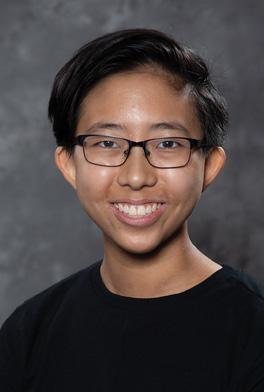
“There are definitely things that people said that are kind of backhand ed,” Huang said. “At that age, seventh
grade and eighth grade, there’s a lot of ignorance surrounding LGBTQ people.”
Based on her experiences at both schools, Huang said the people she surrounded herself with defined school cultures.
“At both schools, I was able to find people who were very supportive, but the overarching culture at Crossroads is a lot more accepting,” Huang said. “[LGBTQ] relationships are a lot more normalized here. I feel like people go to Crossroads for the culture, but people go to Harvard-Westlake for the academics.”
Huang said students’ perspectives on LGBTQ relationships can change based on how many students attend each school and how interconnected the student body is.
“Harvard-Westlake is so much bigger than Crossroads,” Huang said. “Here, most people kind of know you and know everyone’s standing in a relationship. I feel like LGBTQ relationships at Crossroads are a lot more respected. Even within ‘guy culture,’ I have friends that are guys that take my relationship seriously, which I don’t think I had a lot of at Harvard-Westlake.”
Gus Mercado-Quinn ’25, who identifies as gay, said he refrains from oversimplifying the student body’s view of the LGBTQ community.
“There are definitely some people who view queer relationships differently,” Mercado-Quinn said. “However, I’m sure if that if there was a publicly queer couple on campus, it wouldn’t be an issue for the vast amount of Harvard-Westlake students.”
Mercado-Quinn said he has found an overwhelmingly supportive community at the upper school campus so far.
“People don’t really bother me about my sexuality,” Mercado Quinn said. “I just live my life.”
The school community discusses LGBTQ culture on campus and new diversity, equity and inclusion initiatives for 2023.
ILLUSTRATIONS BY EVA PARK
“
“If we can have straight couples basically shoving their mouths together on the Quad, we should be able to let gay people hold hands,”
hwchronicle.com/features Features B7 Feb. 8, 2023
Clara Berg ‘25
L. Wood Kieran Chung ’22
Going the Extra Mile
Community members discuss the e ects of commute times on school life and how they relate to students’ socio-economic statuses.
By Iona Lee
It is 5:45 in the morning, and Bella Adishian’s ’24 alarm rings through her pitch-black room. She quickly throws on her clothes, brushes her teeth, eats breakfast and leaves the house by 6:15 a.m. Adishian said her bus ride from Manhattan Beach takes her an hour and 20 minutes in the morning — and as long as two hours back in the afternoon. She’s not alone: According to a Chronicle Poll, 10% of students have commute times above an hour. Because of her long drive, Adishian said she is forced to maximize her time.
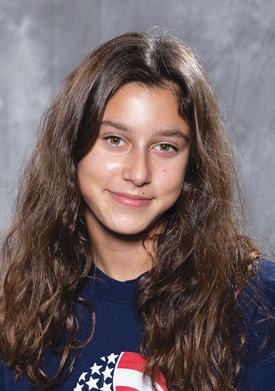
“I try to utilize my free block and lunch and conference times to get my homework done, so I can have more time later in the night to do other things and get ahead,” Adishian said. “By having a strict schedule every day from having to wake up early, I think I’ve become better at managing my time and a more e ective studier. en, I have to try and go to bed early and do it all over again.”
Adishian said although she experienced di culties adjusting to the school’s academic rigor and her longer commute after previously attending a local public school, she wanted to surround herself with an environment of like-minded people.
“I had the option to go to a public school that was 10 minutes away from my house,” Adishian said. “I lacked certain experience, which made it more difcult to succeed at Harvard-Westlake, but I de nitely saw myself growing over the last few years by becoming a more e cient
and well rounded person. Despite having a lot of individuals that really do excel in academics, Manhattan Beach has a stereotypical beach and relaxed kind of vibe, putting school maybe as a second priority. I still value my community, but there aren’t many schools like ours, which is why I chose here.”
Adishian said she uses the long drive as an opportunity to sleep more.

“I get up at 3 a.m. to get ready, and about a quarter to 4 o’clock, I’ll leave the house,” Kochar said. “ en, it will take me about 40 minutes to get here. e reason I come early is to avoid tra c and get work done here in the morning. I’m usually here by a quarter to 5 and 5 o’clock every morning. My job is to make co ee in the morning. I de nitely need it.”
Kochar said he often works later hours to avoid rush hour tra c on his way home.
“When I’m here with students after school, I will usually stay and work here and leave at 7, when the tra c goes down,” Kochar said. “ ere have denitely been times when I’ve gone home and slept for three or four hours and then come back to school. at would be about 14 to 15 hours at school, so I denitely am sympathetic to students with long commute times.”
For Alex Lee ’24, sleep is extremely important yet scarce. Lee lives in Koreatown –– an hour’s drive from school with tra c ––and said he tries to maximize the amount of sleep he gets on late start days by Ubering to school instead of taking the bus.
“I just bite the bullet and get an Uber in order to actually sleep in and reap the bene ts of school starting later,” Lee said. It is a little bit expensive, and I feel fortunate to be able to do this.”





Unlike Lee, Chance Krenzer ’25 lives within walking distance to school. e Chronicle Poll revealed that 52% of students live less than 30 minutes away. 12 students fall into the same group as Krezner and have a commute of less than 10 minutes. Krezner said when he does not drive to school, he rides his bike.
“If I want to bike to school, I usually wake up 15 minutes earlier,” Krenzer said. “Sometimes, it is just easier, so I don’t need to have a whole production of waking up my parents and asking them to sit next to me while I drive. It’s refreshing to start my day like this and super easy too.”
Lee said he does not drive because it is not nancially viable for his family.
ough he occasionally Ubers to school on late start days, he said he still doesn’t feel the same amount of privilege as his peers who are able to drive.
“I don’t feel that bad when I use Uber because I would feel more privileged if my parents were able to get me a car and consistently fuel it with gas,” Lee said. “I think a lot of kids at school have nice cars with parents that are able to shell out a bunch of money for them. My mom is unable to get me a car, so I don’t think I feel that same amount of privilege as other people at school. Obviously, I am extremely fortunate, especially compared to my friends who go to public school that bike everywhere, but not as much compared to students at Harvard-Westlake.”
Harvard-Westlake, sure, there might be a di erence between a Bel-Air house and a nice house in Burbank or Calabasas, but it doesn’t really matter. I don’t think there’s a genuine enough nancial di erence between those two groups in society that it’s worth forming groups over.”
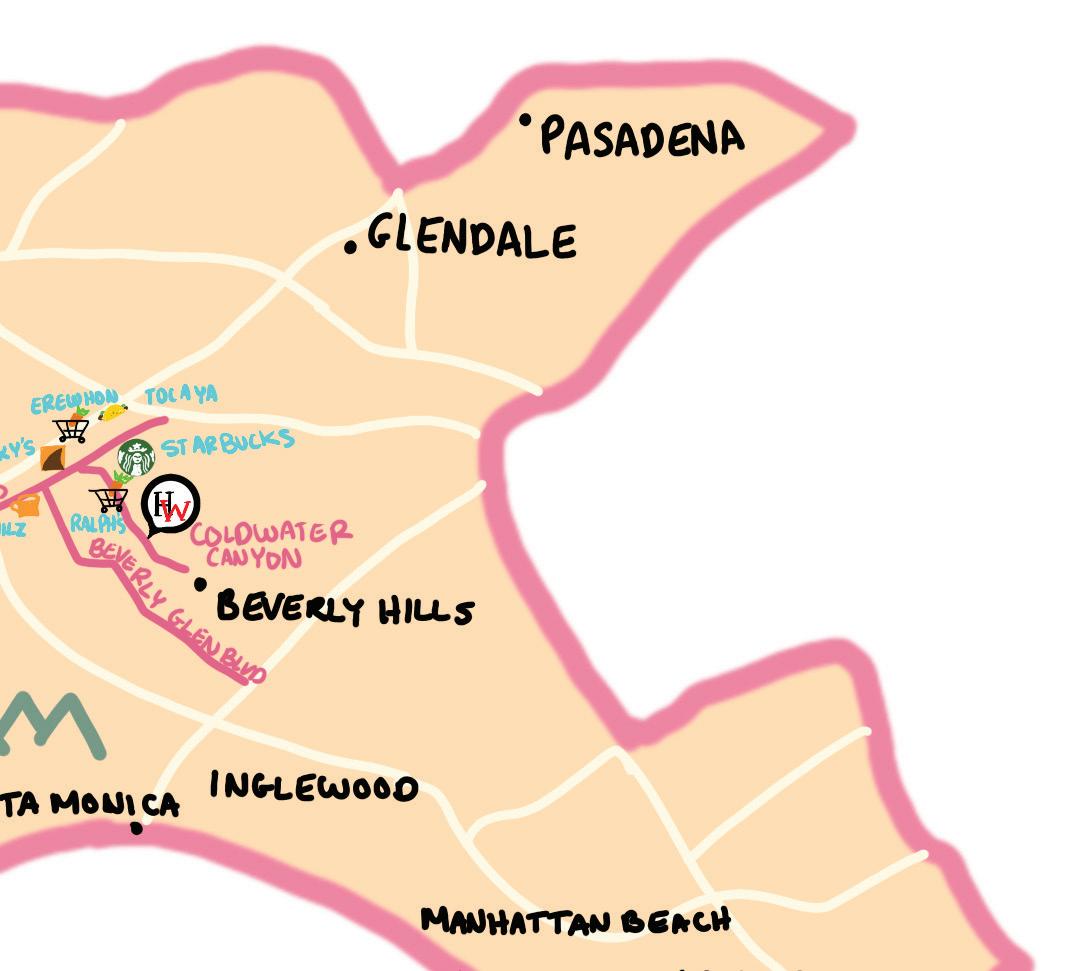
Head of Financial Aid and Interim Head of Admissions Greg Gonzalez said the amount of aid given to each family is customizable to their nancial situation, which accounts for transportation costs.
I would rather deal with the commute than leave the school. I love this place.”
“We look at the general cost of living,” Gonzalez said. “Families also individually report their monthly expenses, part of which is transportation in general. It’s considered by what a family submits in their application. We don’t have a dedicated table for commute times or distances and it’s not like there’s a special gas consideration. However, there is a cost of living consideration, which families individually report and we make grants in accordance with those. Ultimately, people go through this because of what a special place Harvard-Westlake is.”
Regardless of the geographic di erences between his classmates, Lee said that the school’s social structure is not as de ned by class or wealth as his previous school was.
“I’ve been to public schools all my life before this, and it’s very clear to see the economic disparities and how they divide up friend groups,” Lee said. “At


Gonzalez said the majority of students receiving nancial aid integrate well and feel welcome in the school community despite coming from a variety of areas with long drives.
“We’ve had students help us at open houses and nancial aid online awareness nights, who have openly discussed their status on nancial aid and report that they feel welcome and supported,” Gonzalez said. “A fth of our students are on aid. If they don’t feel welcome, I hope that they work with somebody in the community to help them but in general, I feel like people don’t view it as a negative characteristic about somebody.”
10 minutes. Krezner said when he does up friend groups,” Lee said. “At they feel welcome and supported,” Gonzalez said. “A fth of our students are on aid. If they don’t feel welcome, I hope that they work with somebody in the community to help them but in general, I feel like people don’t view it as a negative characteristic about somebody.”
Gonzalez said nancial aid expands geographic representation at school as people come from many neigborhoods, making the application both more accessible and competitive.

their own busi-







“When I head to school, I either do work on the bus, or I’ll sleep to get those extra hours,” Adishian said. “Sleeping on the bus, especially at that hour, is actually quite normalized because everyone is either too tired to care or is just minding ness. No one is really judging you.”
Math Teacher
Kanwaljit Kochar also lives far, commuting from the La Habra, a city in Orange County. Kochar said his average drive to school is about two hours. To avoid tra c, he
is about two hours. To avoid tra c, he said he has a strict morning routine.
“Financial aid allows us to broaden our applicant pool and the geographic area that we serve,” Gonzalez said. “I wish we had enough aid to accept every qualified student who applies for aid in admission. [Financial aid] is a more competitive pool. Just like regular admissions limits the amount of spots, nancial aid is also limited.”
Gonzalez said nancial aid expands geographic representation at school as people come from many neigborhoods, making the application both more acces“Financial aid allows us to broaden our applicant pool and the geographic area that we serve,” Gonzalez said. “I wish we had enough aid to accept every qualified student who applies for aid in admission. [Financial aid] is a more competitive pool. Just like regular admissions limits the amount of spots, nancial aid is also limited.”
Kochar said he endures the long hours he spends driving from his home to school because his job makes the diculty worth it.
Kochar said he endures the long hours he spends driving from his home to school because his job makes the diculty worth it.
“Once I started working here, I just could not imagine working anywhere else,” Kochar said. “I would rather deal with the commute than leave. I love this place.”
“Once I started working here, I just could not imagine working anywhere else,” Kochar said. “I would rather deal with the commute than leave. I






































Feb. 8, 2023 B8 Features The Chronicle ILLUSTRATIONS BY ALEXA LIU
l. wood
Bella Adishian ’24
“
Kanwaljit Kochar Mathematics Teacher
Arts & Entertainment
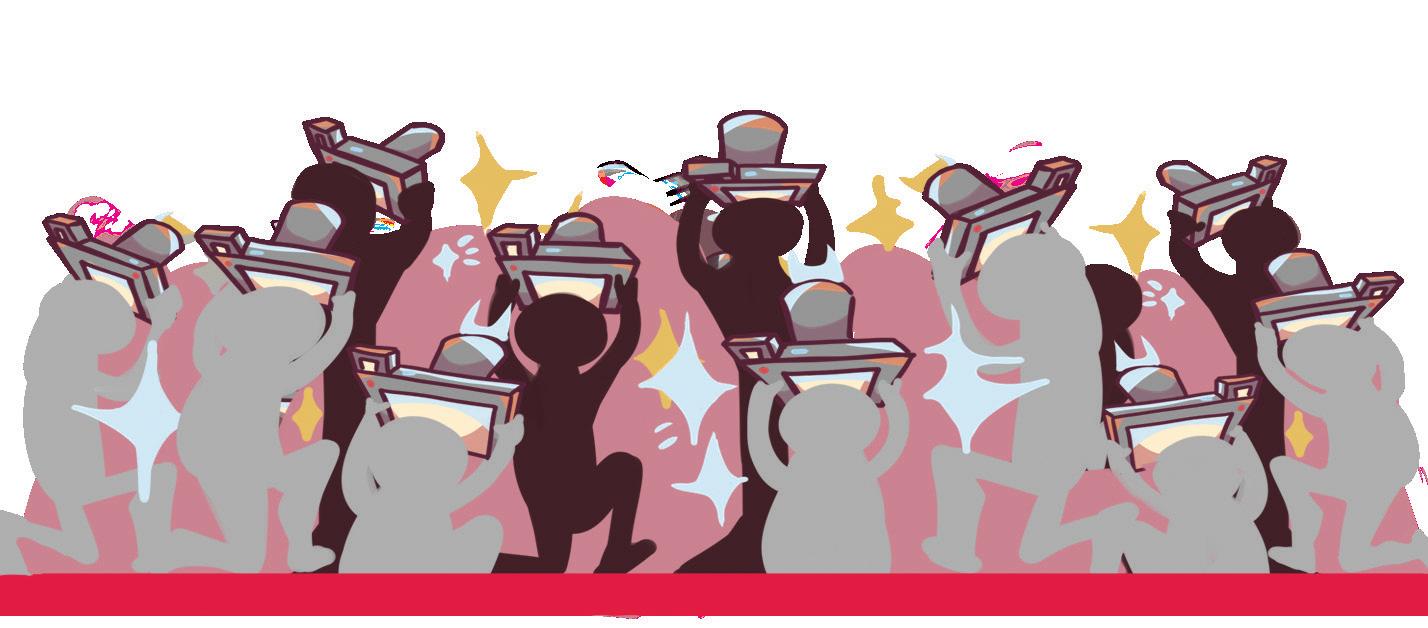
A NOT-SO-MINOR ISSUE
By Kriste An
Looking back on some of her favorite childhood memories, Grace Coleman ’24 said she remembers watching the 1968 rendition of “Romeo and Juliet.” She said she recounts being attracted to its soft lighting, romantic music and attention to detail, including its decision to cast actors similar in age to the characters in the original version. Because of this, Coleman said she was surprised to hear that its two lead actors, Leonard Whiting and Olivia Hussey, had sued Paramount Studios for exploiting and distributing nude images of them in the film as minors Dec. 30, 2022.
“The announcement caught me off-guard,” Coleman said.
“I was on Instagram when I saw these posts claiming that the actors of the movie had sued the production studio for child abuse. It hurt, knowing that a movie that I loved since I was a child had these dark undertones that I did not know of, and it is also difficult to fathom what the actors must have gone through, being a minor at the time the movie was shot.”
rector Franco Zeffirelli assured the actors that there would not be nude scenes in the movie and that the actors would be allowed to put on flesh-colored undergar
ments in filming specific scenes. However, according to the claim, Zeffirellli later told the actors — 15 and 16 at the time — that this would no longer be possible, forcing them to film the scene without undergarments. In the end, the film released the nude scenes, including a scene depicting Whiting’s buttocks and Hussey’s bare breasts.
This particular example fits into a broader pattern of minor sexualization in the media that includes substance and alcohol abuse and provocative clothing, according to the Heritage Foundation. Kai Do ’24 said she has observed this trend in the HBO series “Euphoria.”
“Minor sexualization is common in a lot of movies surrounding high school characters,” Do said. “One of the biggest examples of this is ‘Euphoria’ and its older, similar show ‘Skins.’ Though directors often argue that their depictions of high school students are their attempts at being authentic or true to the high school life, most of it is unrealistic and an excuse to over-sexualize minors.”
“Euphoria” is known for its
difficult to watch, he engages in the series nonetheless.
“I watch the show in spite of these things,” Beckerman said. “A lot of the explicit scenes [in the show] are gruesome and hard to watch because the actors are supposed to be minors. The show’s writers can argue that these scenes are needed for character development, but sometimes, these scenes are unnecessary.”
Do said she finds the abundance of minor sexualization in the media disturbing.
“The sexualization of minors is a concerning problem throughout the media considering how normal and prevalent it is,” Do said. “Even if the actors in these roles are legal adults, this sort of representation in the media normalizes the sexualization of teenagers.”

Do said directors’ decisions to sexualize minors in the media can lead to unforeseen consequences , perverting teenagers’ perceptions of themselves.

“The sexualization of minors impacts the mental health of teenagers, encouraging them to form unrealistic standards for themselves,” Do said. “How
The sexualization of minors in the media can be linked to low self-esteem, eating disorders and depression. Inaccurate depictions of minors in the media can also result in cognitive and emotional consequences that reduce confidence levels and impact teenagers’ abilities to maintain a positive self-image, according to the American Psychological Association.

Jasmine Sorgen ’25 said she has experienced the repercussions of attempting to compare herself to teenagers in the media.
“I have found in the past that when expectations do not line up with what has been stipulated in the media, whether that be in terms of appearance, relationships or more, it can feel strange,” Sorgen said. “How minors are depicted in the media is a semblance of them: the tidbits that adults have decided regarding adolescents and have generated in plots and characters. It is often ingenuine and off-putting.”
Sorgen said the sexualization of minors online can also be linked to dangerous behaviors among students.
“How teenagers are depicted
For example, huge rager parties and the abundance of substances and sex at a premature age are due to how things are presented in the media.”
Upper School World Languages Teacher Amandine Nelaton said the sexualization of minors online is a growing trend. She said it is a prevalent issue in French media too, as exemplified in the movie “Mignonnes.”
“Minor sexualization has become rampant and a norm in our societies,” Nelaton said. “It is in advertisements, music videos, shows, movies and video games. I heard about ‘Mignonnes’ on the news because I watch and read [about] the Francophone media. I did not want to watch it, though, because I knew it would trigger me.”
Nelaton said she fears that the sexualization of minors online endangers children in the current generation and future ones.
“It makes me scared for this generation and future ones to come,” Nelaton said. “I am perplexed as to how the world has reached a point that the sexualization of minors is considered normal, acceptable and expected. I am also puzzled at the fact that there seems to be no regulations in place to [prevent] this. Adults are supposed to protect children,
• Continued on hwchronicle.com
The Chronicle • Feb. 8, 2023
Students and teachers discuss the existence of minor sexualization in the media and its impact on teenagers’ mental health.
ILLUSTRATIONS BY EVA PARK
AND THE AWARD
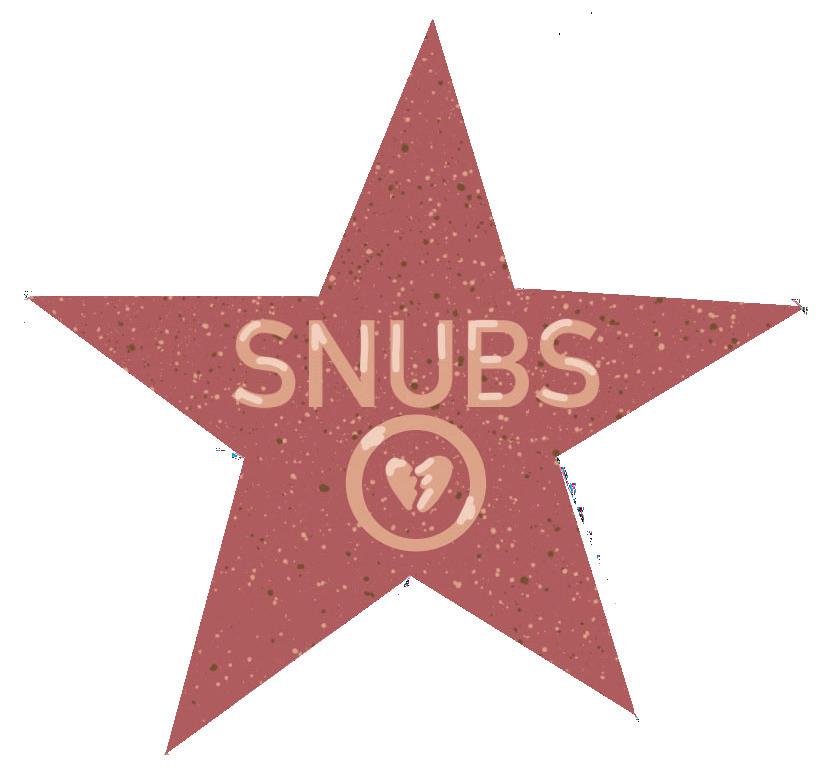
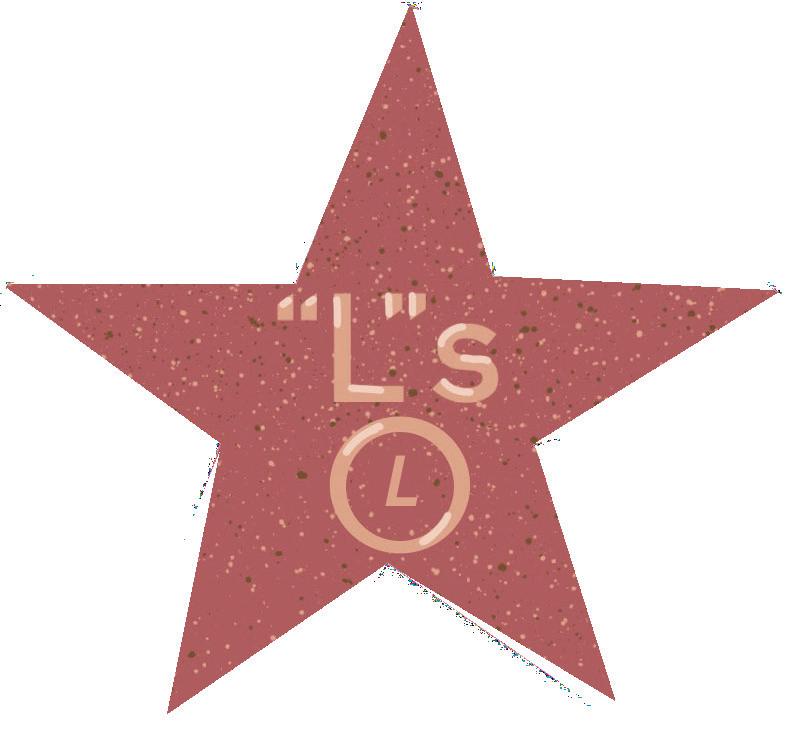

GOES TO...
the 2023 oscar Nominees
RRR

 By Kate Goldberg
By Kate Goldberg
RRR, which follows the friendship that develops between two revolutionaries during their fight against British colonialism in India, has a maximalist and over-thetop style that is unique and stunning. RRR is over three hours long, so it would be reasonable to expect a slowpaced movie or one that drags for a while in the middle. However, RRR stays constantly exciting and surprising, leaving you wondering what insane action scene, musical number or tearful confession will come next. Each individual shot and story beat manages to provoke different emotions, cementing the film as one of the most intriguing and “edge of your seat” movies of the year. It has some of the most creative action I’ve ever seen, but it still manages to keep an incredibly moving and heartfelt story at its core. It tells a tale of brotherhood, betrayal, love and revolution, which is only complimented by the whimsical and brilliant sequences throughout. For any fan of action movies, I cannot recommend RRR enough.
RRR received only a single Oscar nomination in the best original song category for for its song “Naatu Naatu.”The song is great, but it’s not nearly the only Oscar-worthy part of the film. I can’t think of a single award that it is eligible for that it doesn’t deserve a nomination for (if not a win). Visual effects? Amazing. Hair, makeup, and costumes? Spectacular. The leading performances? S. S. Rajamouli’s direction? The cinematography? Nearly every single aspect of the film is phenomenal. I cannot possibly commend the movie enough or even begin to list every part of it that I love because there are just too many. Go see it; it’s on Netflix right now and RRReally worth checking out.
Top Gun: Maverick By
Alden Detmer
As the highest-grossing movie of the year at the domestic box office, “Top Gun: Maverick” is a gravity-defying action film that quickly goes to Mach 10. While the 1986 “Top Gun” was a cheery and playful film, the sequel raises the stakes with a more intense and dramatic tone. Don’t be fooled, though: “Maverick” is a more mature twist on similar character personalities. Only this time, there’s a real mission.
Captain Pete “Maverick” Mitchell (Tom Cruise) is looking for some excitement — and a little bit of love — as a fighter pilot in the Navy. After a lengthy time as an admiral, he has three weeks to teach six new pilots for a daring new mission. The eclectic team of Rooster (Miles Teller), Hangman (Glen Powell), Phoenix (Monica Barbaro), Bob (Lewis Pullman), Payback (Jay Ellis) and Fanboy (Danny Ramirez) take to the skies in immersive action scenes.
The bold low-altitude flights (filmed inside real F/A18s), 1-on-1 combat and even experimental Mach 10 flight in the film stand out on the big screen. “Top Gun” composer Harold Faltermeyer also returned to score, along with Hans Zimmer and Lorne Balfe. The catchy soundtrack, which scored an Oscars nomination for Best Sound, and vivid jet noises add an element of realism.
As the Academy of Motion Picture Arts and Sciences looks to increase its slumping Oscars ratings, “Top Gun: Maverick” may be what they need. Although “Maverick” is an exception to the unspoken rule of limiting blockbuster films at the distinguished awards ceremony, with over six nominations, it is going to land Tom Cruise’s first Oscar win.
Tár


 By Lucas Cohen-D’Arbeloff
By Lucas Cohen-D’Arbeloff
The issue with Todd Field’s “Tár” is not its performances — Cate Blanchett and the supporting cast are undeniably talented — but instead its exasperating drive to intrigue us with a meaningless story. The film seems formulated to subvert expectations and bewilder audiences rather than engage them.
“Tár” follows the fictional character Lydia Tár (Blanchett), an American conductor leading the Berlin Philharmonic, from the peak of her career to her downfall after facing accusations of sexual predation. The opening scene is an interview with Tár at The New Yorker Festival, and from then on, it feels as though the audience is expected to be in awe of her, compelled by her conducting resume and Emmy, Grammy, Oscar, Tony (EGOT) status. But the film never allows us to appreciate her musicianship beyond these superficial markers of greatness. It leaves the audience behind in never showing us how Tár gained this status in the first place, so I couldn’t bring myself to care. Clocking in at almost three hours long, “Tár” becomes excruciating, certainly not best picture material.
The film sets out to explore many themes, from sexuality to race and cancel culture but fails to say anything substantive about them. It is so committedly noncommittal on these issues that nothing is gained from their inclusion. There are interesting moments here and there, such as Blanchett’s heated interaction with a pangender student at a masterclass, but their value is diluted by the numerous scenes of Blanchett just jogging around Berlin.
Rotten Tomatoes will tell you “Tár” is complete, unbridled genius. But that is exactly the film’s problem: It exists only to indulge its creator, please critics and win Oscars, making its audience an afterthought. Academy members, I beg you: Please don’t reward “Tár” this March.
Nope
By Hannah Shahidi
In Jordan Peele’s latest sci-fi and horror film, “Nope,” viewers follow the story of OJ Haywood (Daniel Kaluuya) and his sister Emerald Haywood (Keke Palmer) on their ranch in rural California. During the film, the Haywood siblings encounter strange phenomena at their house: The power goes out, ominous clouds loom over the sky and powerful storms leave their ranch in shambles. The two are forced to defend themselves against the extraterrestrial threats endangering their family home. The movie has a suspenseful mood, leaning into the paranormal and disorienting side of the horror genre.
Just like many of Peele’s other movies, “Nope” is a chilling, well-crafted horror film that leaves audiences unsettled and on the edge of their seats. However, the film didn’t receive any Oscar nominations this year, despite its impressive cinematography, glowing reviews from critics and high box office sales.
When “Nope” was first released in July of 2022 as a follow-up to “Get Out” in 2017 and “Us” in 2019, the audience reviews were overwhelmingly positive. The movie was even the 26th highest-grossing film of 2022 worldwide, which is understandable given the mind-blowing special effects and great performances from Kaluuya, Palmer, Kieth David, Barbie Ferreira and other cast members. None of these qualities of the movie were recognized by this year’s Oscar nominations.
Regardless of “Nope” being snubbed in the 2022 Oscar nominations, the film delivers its promise of dark, intriguing and at times satirical themes. It is a must-watch.
Everything, Everywhere, All at Once
By Zoe Goor
In “Everything, Everywhere, All at Once,” a bagel means everything, an auditor becomes a villain and two women with hot dog fingers play the piano with their feet.
The film follows Evelyn Wang (Michelle Yeoh), an average laundromat owner struggling to make ends meet. Things soon veer into the science fiction realm when Wang is informed that she must learn to jump between universes to fight and save the world(s).
The movie is a triumph – all at once thrilling, heartbreaking and stunning.
The energy level is perpetually high, with Wang almost constantly transitioning between different parts of the multiverse. In one world, she is a famous actress; in another, she is a lifelike doll; in a third, she works spinning signs on a street corner; and in a fourth, she is a rock with googly eyes.
While the movie is cinematically breathtaking, the most beautiful aspect of the film is Wang’s journey to accept her daughter’s identity and and repair their relationship.
As Wang explores the various paths her life could take, she realizes that she is happy with the choices she has made throughout it.
Although Wang’s character develops unusual superpowers, her character remains relatable and the dilemmas that she faces are amplified versions of everyday challenges that many viewers would recognize.
Wang’s rediscovery of her love for members of her family during her odyssey across space and time is testament to the film’s central theme: Love conquers evil.
Blonde
By Sara Segil
In Andrew Dominik’s Oscar-nominated biopic “Blonde,” the tragedy of Marilyn Monroe’s story is twisted into exploitation. The movie characterizes Monroe only by her pain over a slow three hours, culminating in her death at age 36.
“Blonde” is based on the 2000 novel by Joyce Carol Oates and follows the life of Monroe from her start as Norma Jeane with an unstable mother to her rapid rise to fame and struggle. However, the film skips over her highly publicized affair with John F. Kennedy, slowly playing out her other relationships.
While Ana de Armas does a commendable job portraying Monroe’s transformation, it is not enough to redeem the constant exploitation of Monroe’s true story and merit her an Oscar nomination. The film claims to be a biopic, but in reality, it fictionalizes the reality of Monroe’s life. With a length of almost three hours, the film unfortunately does not give her story the proper depth it deserves. Instead of using profound moments to create an emotional story, the film utilizes them to distort Monroe’s daily life and create a spectacle.
A theme with male-directed movies about Monroe is that they portray her as a collection of tragedies and make them shape her into what Hollywood’s male gaze and nostalgia deem the perfect woman. However, because these films are both written and directed from a male perspective, they manipulate her abuse and make her a sex object.
Showing that even true stories can be manipulated into fiction, “Blonde” treats Monroe as a pin-up doll rather than the person she truly was.
Feb. 8, 2023 C2 Arts & Entertainment The Chronicle
The good, the great and the ugly from
ILLUSTRATIONS BY AMELIA CHIARELLI AND FALLON DERN
Scholastic art


Students share original photographs, paintings and sculptures that received recognition in the Scholastic Art and Writing Awards.











PRINTED WITH PERMISSION OF TANYA ANAND PRINTED WITH PERMISSION OF DIEGO GODOY PRINTED WITH PERMISSION OF MINA LAVAPIES PRINTED WITH PERMISSION OF TANYA ANAND PRINTED WITH PERMISSION OF ASHLEY HAHN PRINTED WITH PERMISSION OF ANDRES ALAS PRINTED WITH PERMISSION OF ASHLEY HAHN PRINTED WITH PERMISSION OF IAN KIM PRINTED WITH PERMISSION OF KEIRA HALEY PRINTED WITH PERMISSION OF SASHA GADALOV PRINTED WITH PERMISSION OF CLAIRE WU PRINTED WITH PERMISSION OF AVERY AZAD PRINTED WITH PERMISSION OF KAITLIN CARAS hwchronicle.com/a&e Arts & Entertainment C3 Feb. 8, 2023
By Georgia Goldberg
Directions: Check off each item you’ve done. Caution! This is not a bucket list. Completion of all items on this test will likely result in death. Have you ever...
◻Sweat uncontrollably through your clothes at Convocation?
◻Cried in the math office?
Suddenly fallen ill right before a test?
◻Desperately tried to get points back on a test?
◻Slept three or fewer hours on a school night?
◻Subsequently bragged about your lack of sleep the next day?
◻Spent an entire no-homework weekend doing homework?
◻Hit someone else’s car in the parking lot?
◻Started wheezing walking up the stairs to the third floor of Seaver?
◻Freaked out when your ID doesn’t scan in the cafeteria?

◻Been annoyed by someone from another school complaining about work?
◻Been told by a school counselor to go to a mental hospital?
◻Replied all to an all-school email?
◻Been Honor-Boarded?
◻Written an article about the Honor Board and made yourself an enemy of Prefect Council?
◻Tripped in front of people on the quad?
◻Been yelled at for not showing your green screen to the security guards in the morning?
◻Overheard someone brag about their SAT or ACT score?
◻Had a “deep” conversation with Dr. V on the quad?
◻Spread rumors about teachers’ romantic entanglements?
◻Stalked a teacher on a social media platform?
◻Been extremely uncomfortable during Peer Support silence?
◻Gotten Ricky C?
◻Had a celebrity run-in at Erewhon or Joan’s?
◻Made someone feel bad about not getting into college yet?
◻Made me, specifically, feel bad about not getting into college yet?
◻Made everyone on the quad uncomfortable with your PDA?
◻Gazed romantically into your teacher’s eyes?
◻Compared the school to prison?
◻Miserably pursued excellence?
◻Been harassed by a Chronicle staffer for a quote?
◻Said something along the lines of, “Ew Chronicle”?
Big Red Preview: The Mingst Milk Mile
By Fallon Dern
Some may say a picture is worth 1000 words, but the image of a fear-stricken Gus Mingst ’23 holding a flier of himself photoshopped onto a runner with a carton of milk in his hand can be summed up in just four words: Mingst lost Fantasy Football. Traditionally, league winners are rewarded with cash prizes, or, in The Chronicle Senior League, the invaluable reward of picking which junior will be your personal taskrabbit. This year, there were not enough juniors to spare, so I settled on printing out a photo of Assistant News Editor Davis Marks ’24 and chewing on it when I feel stressed.
Mingst’s league, though, had a unique structure. The members of the league agreed upon entry that the winner would receive nothing. The loser, on the other hand, would be legally bound to a uniquely cruel and unusual punishment. The seven men signed a contract stating whichever one of them lost would chug a half-gallon of milk and run four laps (a mile) around the track. Come conference time Thursday, Jan. 26, Mingst was left with the

bleak reality of his Fantasy-Football-failings and well as a belly full of dairy.
“At the beginning this wasn’t too serious, but the idea that, a couple months later, [Mingst] would have to run a milk mile in front of this many people…” The Ko twins said, faces contorting in perfect unison as their telepathy recalibrated itself.
The event, organized by Mingst’s Fantasy Football league, was attended by over 400 students eager to watch their classmate jog and occasionally vomit. Eight cartons of milk were placed on a cafeteria tray, lined in uniform rows until, SNATCH! The crowd’s size had garnered the attention of Attendance Officer Gabriel Preciado, who, upon his intervention, picked up the milk tray and asked the crucial question nobody had considered: “Was this safe?”
However, the administrative interference only drew rage from the audience, with Head Fanatic Rohan Mehta ’23 leading cheers of, “Let him run!” and “Drink that milk!” Mehta, Mingst’s Car Club Co-leader and Center of Early Education (CEE) elementary school classmate, told Big
Red he felt an obligation to step in and support his friend.
“He’s a very dear friend of mine, almost like a brother, you know?” Mehta said. “So anything I can do to boost his spirits as he takes this trek, this journey, I want to do.”
While Mehta rallied the audience, another CEE graduate parted the seas of enraged spectators and stood tall, facing Preciado donning a cardigan and a glint of conviction in his eye. The Jazz Explorer pianist, who supported Mingst on bass, now backed him on the track. Arriving to wield his legisla tive power against legislation itself, Head Prefect Si mon Lee ’23 had touched down in Dairy Town. Mingst’s entourage, now including documentarian Joshua Cheng ’23, graphic design er Henry Ullendorff ’23 and myself, the Julian Andreone ’22 of dairy-adjacent ath-
letics, swiveled our heads between the Rohan-rallied audience and the Preciado-Prefect discussion like meerkats watching a ping pong match, until two pale, glistening hands broke my focus. It was Leo Saperstein ’23, my fellow Big Red Editor in Chief. “This!” Saperstein waved excitedly to the audience, “Put this all in Big Red!”
And so, with the fate of the Milk Mile as uncertain as Big Red publishing a single issue, I saw an opportunity.
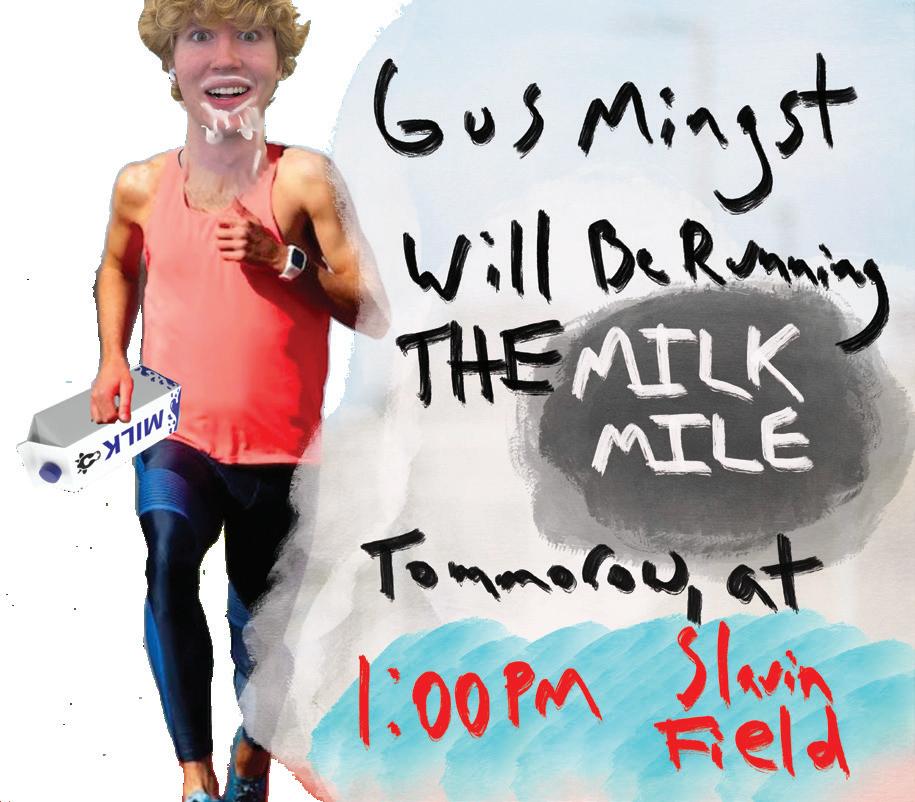
Prince Harry to replace Rick Commons
By Eden Conner
Prince Harry will replace President Richard B. Commons effective immediately, according to an all-school email sent Jan. 23. The ginger, who made millions streaming his move out of his parents basement, will now make the hour-long commute from Montecito to the Coldwater freeway exit—and a second hourlong commute from the exit to the upper school campus. Harry says he plans to make minimal adjustments to school life, hoping to make the transition as seamless as possible. However, he will be the first and only
faculty member allowed to join a Peer Support group, as he needs a safe space to unload all the beef with William that he just couldn’t trust Oprah Winfrey with. Winfrey is said to have broken Big C. Harry says the group’s games of running charades will give him a chance to display the athleticism he developed during his time serving in the British Army. Commons’ shoes will not be easy to fill, but Harry says he has the utmost confidence in his abilities to maintain the institution’s current status. To compete with Sierra Canyon Basketball’s documentary, Harry will included school-related content in his con-
tract with Netflix. The streamer is slated to debut “Keeping up with Kutler: a Directed Study Docu-series.” Harry also shared his willingness to donate 10% of Archwell Foundation earnings to expanding the school parking lot — a decision prompting several lawsuits from @hw.parking. The remainder of the funds will be used to snag that elusive first place spot on niche.com’s high school ranking list.
Commons was, of course, not fired from his long-held position but rather sent across the pond by special request of the royal family. He will take over the majority of Harry’s global philanthropic
work, spreading the message of the joyful pursuit of educational excellence worldwide. Sources say Commons also wanted a break from walking the three flights of stairs to get to his second-floor Seaver office.
Many have questioned the Prince’s intentions behind taking the position of School President, and their primary suspicion is that Harry and Meghan hope to secure a spot for their children at Harvard-Westlake, pending the creation of a school rugby team. While the enrollment seems inevitable, what remains to be seen is who the children will bring to grandparents day.
New sports offered by HW Athletics
By Zoe Goor and Hannah Shahidi
Take a look at the websites of Phillips Academy — Andover, Phillips Academy — Exeter or any other school that begins with “Phillips” and ends with the name of a town in the Northeast. You’ll see an array of exciting, nay, invigorating activities both athletic, as well as non-athletic for those of us who dabble in the athletics of the mind. If the school doesn’t want to lose its coveted first place — sorry, make that second place — spot on niche.com, it needs to step up its extracurricular offerings or risk losing 43% of its student body, according to very real Chronicle statistical ana-
lysts. Here are our expert suggestions, as members of the school’s Speech and Debate program, on how the school can improve its athletic program.
Curling
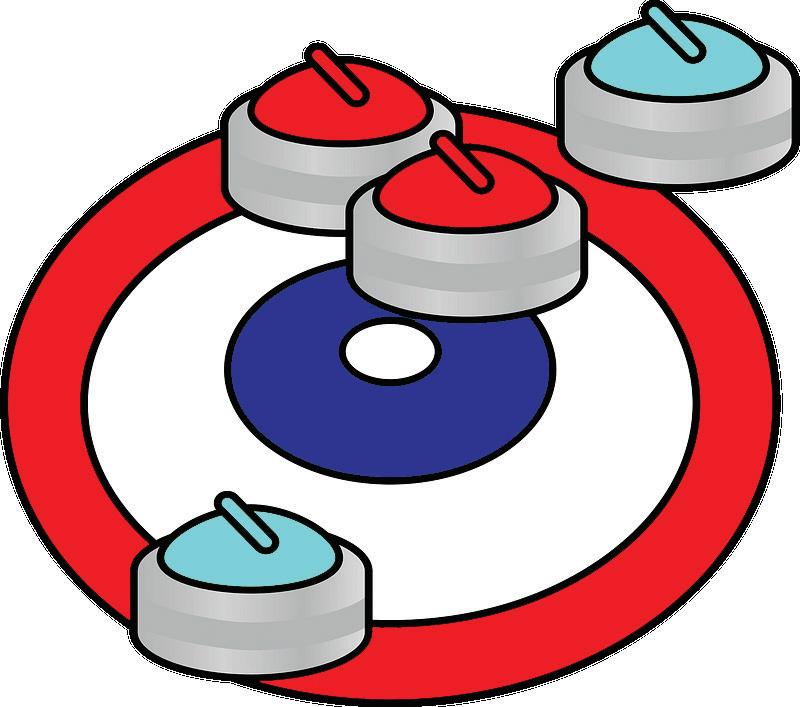
We’re not talking about all the capabilities of the Dyson Airwrap. We’re talking about the most scintillating sport, the sport that stars in everyone’s favorite quadrennial sporting event: the Winter Olympics. Curling is an athletic pursuit that requires just a small broom and jumbo-sized pucks — imagine air hockey, and…that’s all that we were able to gauge about curling from our two internet searches.
Bobsledding
You may be confused by what
this sport is, and so were we. We initially thought it was an ill-advised pop culture reference to Bob Ross’s famous portrayal of a sled. However, it actually involves a racecar that glides over the ice. Still confused? You’re not alone. A Chronicle poll (yes, yet another –– we are very active Google Forms users) indicated that 12% of the student population knows what the sport is and 0.3% did not get that knowledge from “Cool Runnings.”
Crew You may be asking yourself, “Wherever will these students take to the seas?” Well, look no further than our very own Studio City. The LA River, right in our backyard, may be seen these days as the city’s drainage ditch, but just close your eyes for a second. Listen to the screams of drowned River Park protesters, take in the scent of the cafeteria’s signature chicken dumplings and pic-
ture Harvard-Westlake students splashing around in the polluted water, contracting Giardia. All of the above are, of course, necessary to the culture of the rowing program. Let’s also acknowledge the elephant in the room: crew looks great on those college apps.
Milking
While most people wouldn’t consider milking a sport, it’s basically the same thing as weight training — it targets your biceps, triceps and mind-ceps. This is a great idea for two reasons:
(a) milk fosters school pride (as demonstrated by the milk mile) and
(b) milking cows is a great secondary source of income for the school. There can never be too much money available to purchase sweatsuits for our incredibly successful Division 8 football team. Who are the customers for Harvard-Westlake branded milk? Erewhon customers (also known as the student body).
Satire The Chronicle • Feb. 8, 2023
Scan here to take the full test and get your score
PRINTED WITH PERMISSION OF HENRY ULLENDORFF
Cardiac Concern
By Chloe Park and Caroline Plunkett
When Buffalo Bills’ Strong Safety Damar Hamlin suffered cardiac arrest in the first quarter of a game on Jan. 2, it sent shockwaves through the sports community. After a hit from Bengal’s receiver Tee Higgins momentarily stopped the 24 year old’s heart, fans in the stands and at home watched in horror as Hamlin collapsed. As reported by ABC, Hamlin spent a week at The University of Cincinnati Medical Center before being transferred to Buffalo General and discharged on Jan. 22.

Head of Sports Medicine Dunford Rodill said Damar Hamlin’s collapse has prompted discussion about the school’s safety precautions regarding cardiac injuries for athletes. He said the athletics department takes cardiac issues seriously and has a set protocol in case of an emergency during practices and games.
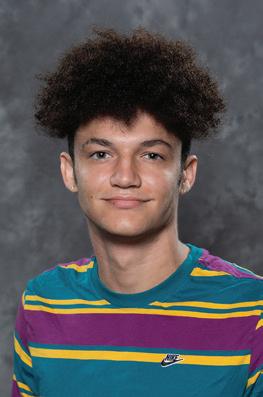
“One of our worst nightmares is for a cardiac issue to happen during a game,” Rodill said. “Af ter this event, we started think ing about what we would do in a situation like that. Fortunately, here at Harvard-Westlake, we do have an emergency action plan that is set in place for any emer gency situations that might arise during a game or practice. We also make sure that we have the proper equipment in place for whatever situa tions that may arise.”
Rodill said precau tions for athletes’ cardiac safety are taken even before a student joins the team, including examining family history and having students make appointments with cardiologists.
“Everyone has to have a preparticipation exam before they even play a sport at HarvardWestlake,” Rodill said. “A part of the screening is a cardiac soft screen. So, [doctors] look at fam ily history and if there’s anything in their history that might predis pose them to a cardiac issue, then they get sent to the cardiologist.”
Rodill said the school evalu ates a student’s cardiac report carefully if they are flagged to have potential cardiac issues so that the student can take appro priate measures.
“We’ve actually had some cases where, before a student even played, we would have a report from our Community Health Office, that someone is red flagged to have a cardiac issue,” Rodill said. “Then, we look at notes from their cardiologist and whether or not they’re cleared to participate. Anytime there’s a red flag like that, we always do our best to check in with the athlete to make sure that they’ve done the necessary steps before they even step foot into their sport.”
Rodill said checking football equipment is properly fitted is also important, especially due to the physical nature of the sport.
“At the beginning of the year, we always make sure that the equipment is properly fitted,” Rodill said. “Our equipment manager does a really good job with that, meaning checking that helmets are the proper size, making sure that the shoulder pad
ment] is checked continuously to make sure that players are in the right protective equipment so that they can decrease the risk of [sustaining an] injury.”
Sudden cardiac arrest is the leading cause of death among student athletes, and according to defibtech.com, administering immediate CPR and using AEDs can double or triple someone’s chance of survival. Also, having athletic trainers present during practices and games significantly increases survival chances from cardiac arrest.
Rodill said athletic trainers at the school are trained to treat cardiac related injuries specifically.
“As far as heart issues, we make sure we have an AED and we’re all CPR certified,” Rodill said. “So, in an instance where a cardiac arrest happens, we are trained for that scenario.”
Although Hamlin’s collapse was cardiac related, Rodill said that the event has led the Sports Medicine Department to increase preparedness for all types of injuries.
“After this event it’s main
emergency action plan,” Rodill said. “Some of the things we’ve talked about here as a staff are just practicing different scenarios, whether it’s dealing with a broken leg, a cervical injury, or practicing spine boarding, applying CPR, AED pads, and more. That’s something that is going to be really important for us, just to keep making sure that we are doing our job.”
Rodill said the entire sports medicine department has practiced for all situations so that they can be as prepared as they can possibly be.
“Just like the football players practice, that’s their sport, we also have to do a really good job with practicing for these scenarios so that when they do happen, we are prepared for it rather than scrambling trying to figure out what to do,” Rodill said.
As well as the
light on the anxieties many athletes feel about the dangers of football. Although the season is over, Hamlin’s injury has affected some of the members of the school’s football team.
Varsity Wide Receiver Boaz Maydew ’24 said hearing of Hamlin’s collapse was alarming to him.
“It was pretty scary,” Maydew said. “I mean [injury] is part of the game but it was definitely scary to see a player get hurt so seriously.”
Maydew said the risks of the game is on his mind on and off the field. He said after experiencing a mild injury during the off-season and hearing of Hamlin’s injury, he is more cognizant of the dangers of football despite the school’s precautions at every single game.
“Injury is part of every sport, especially football, which is something I know since I was injured this season,” Maydew said. “”But hearing of Hamlin’s collapse was still pretty shocking and made me more conscious of taking measures to be safe.”
Varsity Offensive Tackle Michael Schneider ’24 also said he was concerned after hearing of Damar Hamlin’s collapse.
“When I am out on the field, I always have a bit of fear running through my head that I could get seriously injured and experience permanent consequences,” Schneider said. “It’s a bit scary hearing about Damar Hamlin since he is a professional player in the NFL—if he’s collapsing on the field and facing serious health risks, what could that mean for high school
Although many football programs have been criticized for their carelessness with the safety of their players, Maydew says the athletics department takes the dangers of football seriously.
“At every game, there are three trainers who deal with sprained ankles and stuff like that, but for any head injuries there is a whole protocol in place,” Maydew said. “They are really good about [taking safety] precautions.”
Sports The Chronicle • Feb. 8, 2022
The school community discusses worry surrounding NFL player Damar Hamlin’s cardiac arrest.
L.Wood Boaz Maydew ’24
“When I am out on the field, I always have a bit of fear running through my head that I could get seriously injured.”
illustration by sophia evans
Michael Schneider ’24
Baseball prepares for season
By Ella Yadegar
The school hosted a media day for Mission League baseball and softball teams in Ahmanson Lecture Hall on Feb. 1. During the event, press reporters interviewed coaches and players about team developments during the offseasons and any plans for the up and coming seasons.
The 2023 baseball Mission League season will begin Feb. 28 and end April 27. Eight league teams will play three games every week, not including any out-ofleague competitions.
In the 2022 season, the baseball team tied with Notre Dame for first place in the Mission League before losing in the CIF Southern Section Division I quarterfinals to JSerra High School.
Going into this season, the team was ranked second in Southern California in the Los Angeles Times' rankings.
Baseball Program Head Jared Halpert said he has high hopes that the team can compete at a high level.
“The Wolverines will have a senior class of 12, with 21 rostered athletes,” Halpert said. “We’re really excited to see this team come together here in the fall and winter, healthy and eager to compete in what I think is the best league in the state of California.”
Center fielder Will Gasparino ’22 announced his commitment to The University of Texas at Austin in September 2021. He said even as a potential MLB draft prospect, he will focus on his play instead of the scouts watching.
“But I've always kind of thought about [the game], not really worrying who's watching me,”Gasparino said. “Whether it's at the cages alone, or with forty scouts, I kind of just play the same way and go out and compete.”
The team will face Foothill at the Prep Baseball Report (PBR) Preseason Invitational on Feb. 11.
Boys basketball wins Mission League Title, included in CIF-SS Open Division Playoffs
By Eden Conner
The boys basketball team heads into California Interscholastic Federation Southern Section (CIF-SS) open division playoffs with an overall record of 28-1 and undefeated league record of 8-0 after beating Notre Dame High School 75-71 in the Mission League Championship . The team’s run so far is one of the most successful in the program’s history.
The competition in the CIF southern section open division is unlike what the team has faced during the regular season. In reflecting on the team's success, Forward Brady Dunlap ’23 said the squad is motivated to take home the CIF Open Division title after losing to Corona Centennial in last year's CIF final.
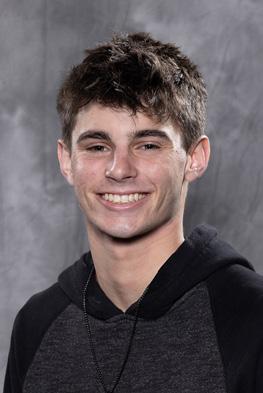
“Our team chemistry was very good during the regular season,”
Dunlap said. “We played hard and really bounced back since the loss and played with a different kind of fire. [Corona Centennial] crushed us in the championship game, so just bouncing back from that proves our resilience.”
Guard Trent Perry ’24 said he attributes much of the team's success to the close bond they have built over the year and the passion they approach each game with.
“We’re brothers on and off the court,” Perry said. “We are with each other a lot at school and we don’t just talk on the court. I feel like each person on the team wants to be there. We have great perseverance in us to just want to get the win. In the postseason, nothing should change. At the
Boys soccer wins historic league title
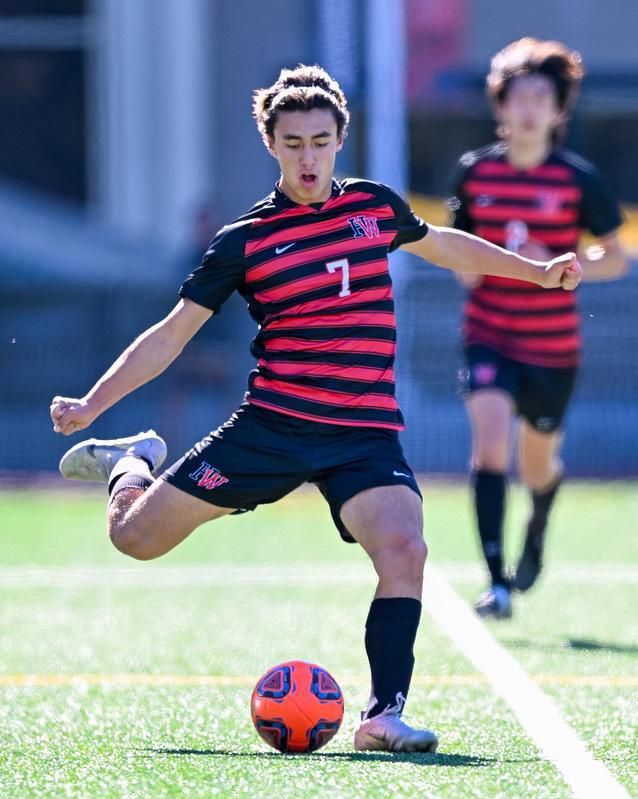 By Christopher Mo
By Christopher Mo
The boys soccer team finished the regular season undefeated, winning their first Mission League title since 1998. The team clinched the championship with a 2-0 victory against Chaminade on Jan. 30, then beat league rival Loyola 2-0 on senior night Feb. 1.
Center Attacking Midfielder Tyler Ullrich ’24 said despite the team's successful season so far, they look forward to strong performances in the playoffs.
“Although I am very happy about winning Mission League and beating our rival Loyola, our team still has a lot to prove in CIF.” Ullrich said.
Last season, the team finished with an overall record of 10-75 and fell short in their second match of the CIF Southern Section playoffs against Lynwood High School. This year, the team ended the regular season in first place with a league record of 12-01 while holding an overall record of 19-0-1.
Boys Soccer Program Head Michael Erush said that the team’s de-
termination to succeed has driven them to work hard both on and off the field.
“This season's success comes from the commitment from the group in the last 2-3 years,” Erush said. “The boys really wanted to be successful and we discussed the process of what it would take to be successful. Sports performance, training environments and the way they approach each game has been one of many reasons they have been successful.”
Erush also said the team's competitive mentality has sustained them throughout the long season.
“The team has a relentless attitude on and off the field,” Erush said. “They love to compete and challenge themselves with different personal and team goals. This year we have a great backline by only giving up 4 goals in 20 games and scoring over 50 goals. It’s a well-balanced team and I want to see the boys succeed and compete for championships every year.”
Defender JT Federman ’24 said the team's expectations going into playoffs have not changed since the start of the season.
“With our undefeated record still intact, we know we have a target on our back, but we use this as motivation to continue winning,” Federman said. “We set high goals at the beginning of the season and hold high standards as a strong program, and those goals and standards will not change no matter our record. Now as we get ready for CIF, we all understand that each game is win or go home, so it’s important that we remain focused and confident going into each game we play.”
Federman also said the team built a strong chemistry that has been a major success factor throughout the season.
“The main key to the success our team has had this year can be attributed to the sense of 'family' that we have built within our program,” Federman said. "Everybody from the freshmans to the seniors are extremely close with each other, and we are all really enjoying this season while working hard each day to continue to succeed.”
The team will begin its CIF -SS Division 4 playoffs Feb. 9 against Buena High School.
end of the day, it’s a game that is really important, so we have to go out and act like we’ve been there before.”
Both Perry and Dunlap have contributed to the squad’s offensive success, consistently averaging high doubledigit points. Dunlap said in tight games like the Mission League semifinal against St. Francis, overcoming deficits is less about individual play-making and more on the effort from the whole group.
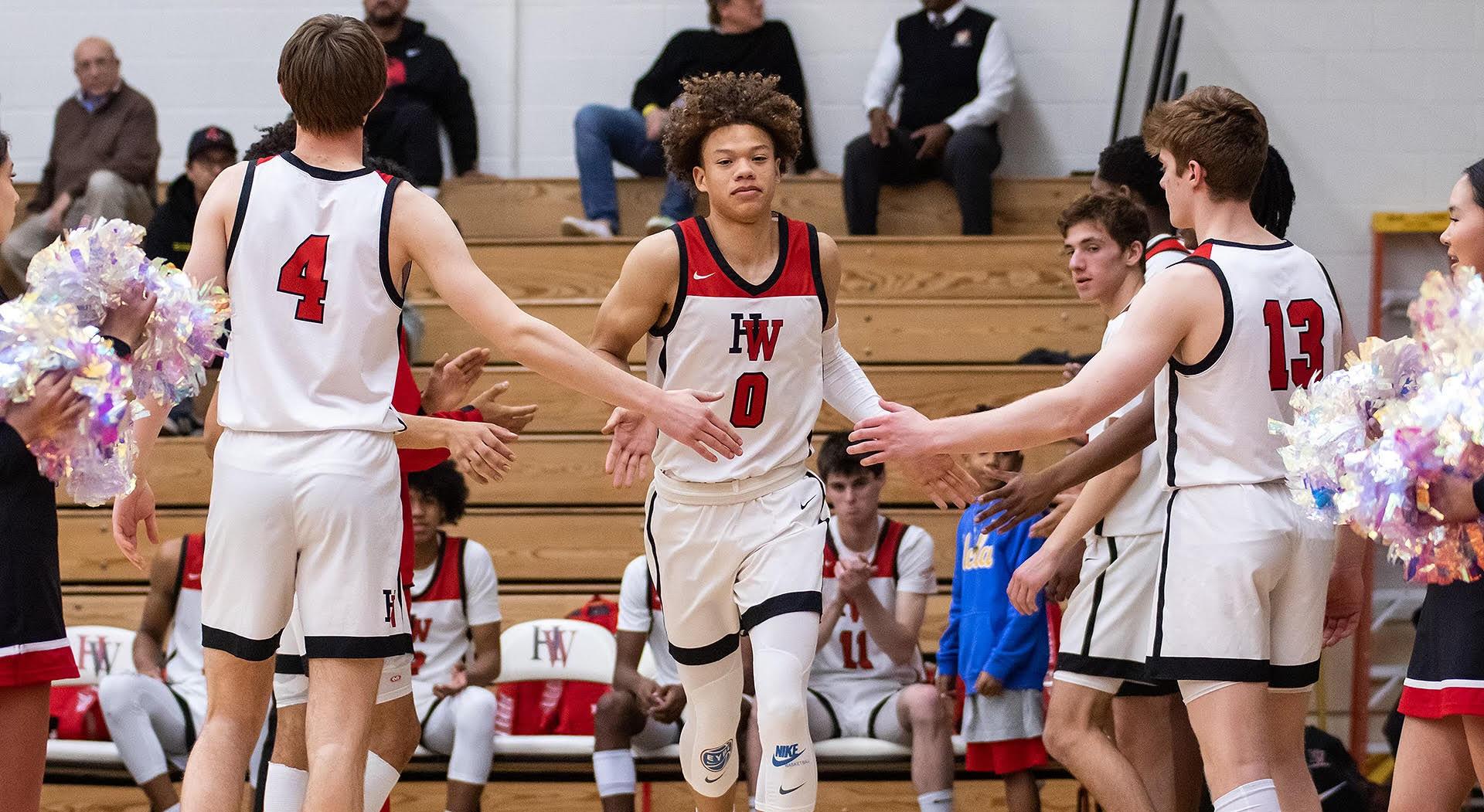
“[All our success stems from] our leadership,” Dunlap said. “Trent, Jacob, and myself just try to galvanize the group. When we know we’re not playing necessarily well, we just have to come together more as a team. We did that especially in the
fourth quarter [against St. Francis], but we have to start communicating as a team sooner in games.”
Forward Nik Khamenia ’25 said the team needs to replicate the same level of intensity they showed against St. Francis on Feb. 1. Khamenia the team will be focused and confident even in its first round match-up.
“Going into the Open Division, we will see a lot of teams that were just as tough as St. Francis,” Khamenia said. “The togetherness is [what makes us effective], I would say for this team. Everybody likes each other, we are all friends, and we all have the same goals for this team.”
The team will begin its CIF Southern Section playoffs on Feb. 10 and its CIF State playoffs on March 1 with hopes of making another finals appearance.
Feb. 8, 2023 D2 Sports The Chronicle
PRINTED WITH PERMISSION OF DARLENE BIBLE
IN THE SPOTLIGHT: Guard Trent Perry '24 is announced as a member of the starting lineup and makes his way through his teammates. The squad continued their undefeated Mission League campaign with a 73-50 victory against Chaminade High School on senior night.
EYE ON THE PRIZE: Josh Barnavon '24 prepares for a cross to a teammate during the team's 3-0 victory against Alemany High School.
PRINTED WITH PERMISSION OF SALIL METHA
L. Wood Brady Dunlap ’23
Wrestling prepares for playoff competitions
By Nathan Wang
After three consecutive losses to Alemany High School, Chaminade and Crespi, the wrestling team looks to bounce back just in time for the playoffs.
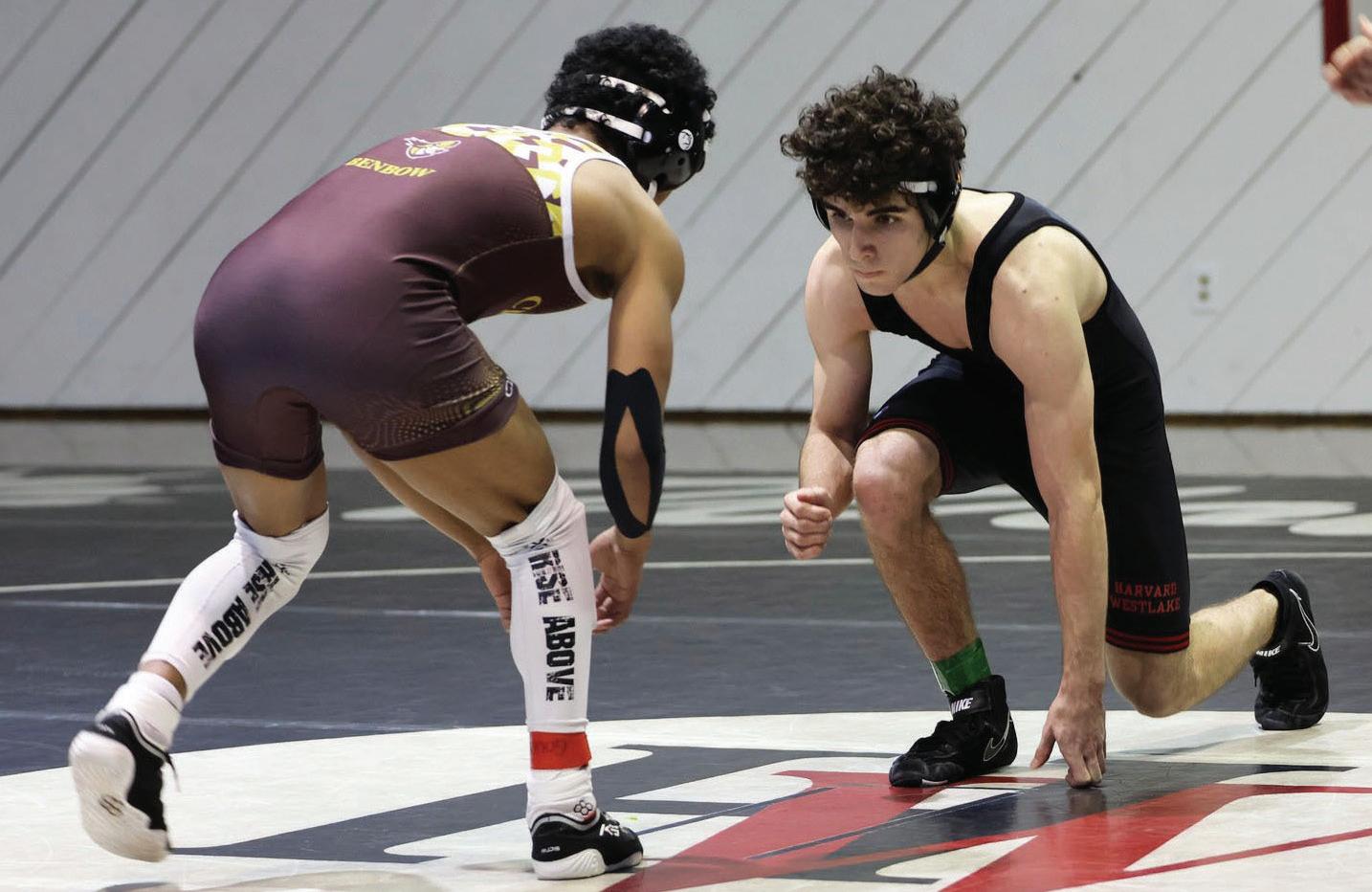
Wrestling playoffs include three tournaments in chronological order: CIF Individuals, CIF Masters and CIF CA State. To qualify for CIF Individuals, wrestlers must place in the top three of their respective weight class in the Mission League Individual Finals on Feb. 4. From there, wrestlers have to place in the eighth position or better in each CIF tournament to advance.
Wrestling Program Head Junior Amazan said the team has struggled to send wrestlers to compete in all 14 of the different weight classes which resulted in multiple forfeits.
“In all our other league matches we were only able to fill 5-8 of the 14 weight classes going into the match,” Amazan said. “Wrestling is a tough sport and will take time to fill our varsity roster and guys who are up to the task.”
Amazan said the Chaminade loss in particular was predictable due to the fact that they have a larger program.
“Chaminade is a great team with high-level talent,” Amazan said. “They are becoming a premiere name in CIF Southern Section wrestling. We lost to them because most of our guys are firstor second-year wrestlers.”
Amazan said maintaining the team’s mindset is extremely important to be successful in the remaining tournaments of the year.
“We are in the lab,” Amazan said. “We are adding some new things and refining some of our positions. Everyday we’re getting better and more importantly, building confidence. Everything from this point is high stakes. [The player’s] mindset will play an important part [in whether or not they succeed].”
Amazan said the wrestling team’s journey of self-improvement is demanding, but, in the end, is worth the high level of effort.
“Wrestling is a tough sport and will show you a lot about yourself both on and off the mat,” Amazan said. “These young men that have made the choice to step on the mat have been challenged and have given their blood, sweat and tears to get to where they are without results on the surface. But, like a bamboo tree that spends years
building its roots, we are ready to break the surface.”
Team Captain Isaac Wiener ’23 said that in preparation for playoffs and league finals, the team is using practice time to refine techniques through friendly wrestling matches.
“The team [now] focuses a lot on doing live wrestling during practice rather than just drilling, and trying to get each wrestler ready individually for the competition,” Wiener said.
Wrestler Cutter East ’24 said the losses continue to motivate the team to improve as they continue moving forward.
Girls basketball prepares for playoffs
By Paul Kurgan
The girls basketball team defeated Notre Dame 60-38 Jan. 27 at UCLA’s Pauley Pavilion. The team is 2-1 since and 18-10 overall going into the CIF playoffs.
After a 13-13 score at the end of the first quarter against Notre Dame, forward Jordyn Call ’23 said the entire team increased their level of play. They led after the second quarter by a margin of two, the third by eight, and the fourth by nine. Call said the win was truly a team effort.
“Our [game against] Notre Dame at UCLA was so much fun,” Call said. “Everyone on the team contributed to that win whether it was key rebounds, assists, defensive plays, important buckets. “Everyone did what they
needed to do that day and it really showed in the stats.”
Following the teams showing at Pauley Pavilion, the team beat Marlborough 56-52 and lost to Chaminade 63-50, finishing third overall in Mission League. Call said she is confident the team can be successful in the playoffs.
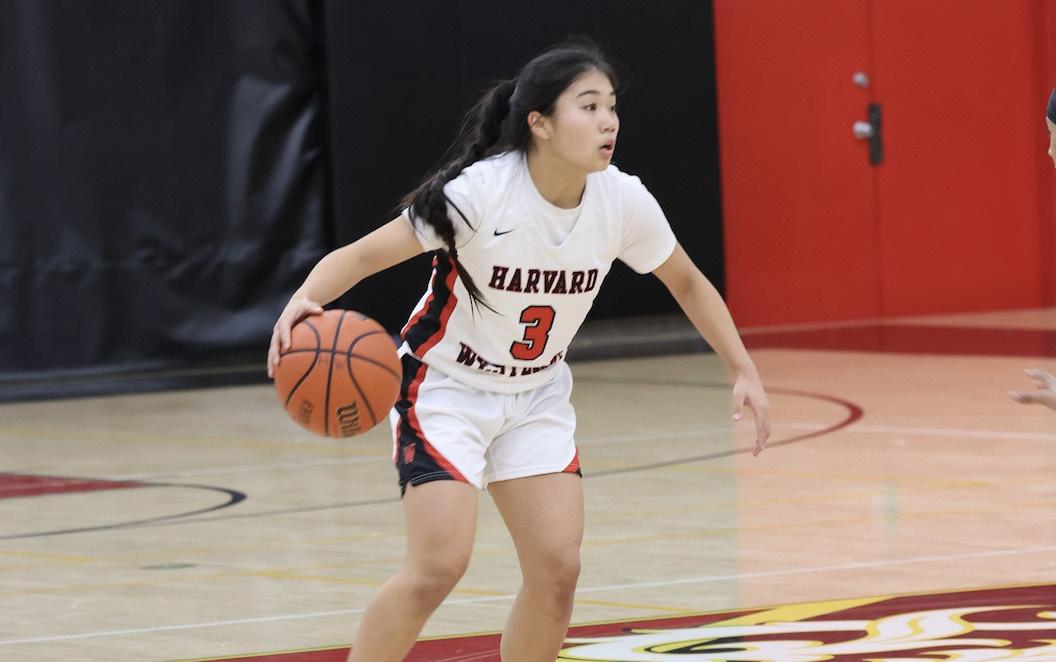
“We need to continue being aggressive and coming out strong and taking control of the game rather than playing catch up,” Call said. “When our team comes ready to play, there isn’t a team in our division that can beat us.”
Forward Bella Spencer ‘25 said that with playoffs approaching, the teams showing at UCLA’s Pauley Pavilion gave the team a taste of what D1 basketball may feel like in their futures.
“Playing in Pauley Pavilion was
easily one of the coolest experiences ever for me,” Spencer said. “The loud environment and cheering crowd only further hyped us up and got us more excited to play harder and come out with a win. My dream has always been to play in college and growing up in a Bruin household having the opportunity to play in Pauley was incredible and a dream come true for me.”
The team plays its first CIF playoff game on Feb. 9. Spencer said whatever happens in the tournament, her team has exceeded expectations and has had an amazing season.
“I am so extremely proud of our team,” Spencer said. “Nobody would have thought or believed we could make it as far as we have.”
“We are very optimistic about our future in wrestling as individuals and as a team,” East said. “Each loss was more or less a product of our lack of depth in our roster. Even at such a disadvantage, the wrestlers we do have put up great fights and end up winning many of the matches.”
East said the Mission League Individual Final is a great chance for every wrestler on the team to showcase their individual progress from the season.
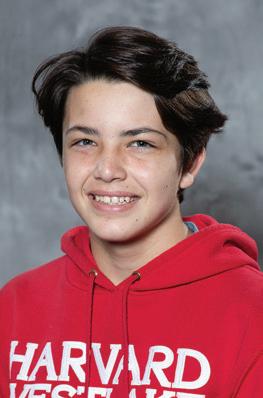
“The Mission League Individuals is truly our time to shine without relying on a filled-out roster,” East said. “Each individual wrestler
now gets the opportunity to prove themselves on the mat.”
East said his primary goal for the remainder of the season is to put all of the training that he has done to use and perform as well as he possibly can during the upcoming playoffs.
“My goal for the rest of the season is really just to wrestle my best by using the culmination of everything that I have learned and all of the work I have put in up to this point,” East said. “If I use everything I’ve got, I’m hoping I can make it far into the season and [am] happy with the improvements I’ve made in my career as a wrestler.”
Girls soccer team wins Mission League title
By Jackson Mayer
The girls soccer team won their final game of the season against Chaminade 2-1 on Feb. 2, winning the Mission League title. The team finished the regular season with a league record of 8-1-1 and an overall record of 11-5-3.
Captain and Defender Dani Lynch ’23 said the game against Chaminade will prove to be helpful in preparing the team for the upcoming playoffs.
“I think the game [against Chaminade] is one we can learn from and use as an opportunity to prepare and strengthen where necessary for our next opponent,” Lynch said. “Chaminade was very physical and a great test for us before our CIF [playoff] run.”
Lynch said the team will approach the playoffs with the same high level of intensity that they showed in games through the season.
“We are treating the playoffs with the same mindset as we have for every game this year,” Lynch said. “We want to play well, with intensity and to achieve a successful outcome.”
the Mission League,” Ozturk said. “It positively affects our team’s morale going into the playoffs, as we were still figuring out how the team worked together at the start of the season. We are definitely on an upward trajectory [going into the postseason], and we are preparing for the playoffs by addressing team strengths and weaknesses.”
Winger Jaida Pryor ’25 said the higher level of league competition this year made the team’s Mission League championship win even more impressive.
“It feels great to have won Mission League, especially because we added two new really good teams in our league,” Pryor said. “In comparison to last season, we did have more tough games, but as a team we have continued to improve throughout the season.”
“In comparison to last season, we did have more tough games, but as a team, we have continued to improve throughout the season. ”
Jaida Pryor ’24
Pryor said despite the team’s achievement, they still need to continue to train hard in order to see the playoff success that they aspire to achieve.
The team won each of their past five games, four of them shutouts. Midfielder Gemma Ozturk ’25 said the team’s recent success and Mission League championship will help support their confidence as they compete in the postseason.
“It feels amazing to have won
“Although it is great to have won league. Wwe still have a lot to work on we have some plays that we need to focus and execute better as we start playoffs soon,” Pryor said. “We will be watching more film on our team, looking at things we can do better offensively and defensively, and of course still practicing and lifting.
“We want to make it as far as we can in the playoffs.”
Feb. 8 2023 Sports D3
hwchronicle.com/sports
L. Wood Cutter East ’24
CALLING THE SHOTS: Point Guard Jamie Yue ’24 looks to a teammate for a pass as she tries to get past a defender. The girls basketball team is currently 5-5 in league and 18-10 overall as it heads into CIF playoffs.
PRINTED WITH PERMISSION OF DARLENE BIBLE
ON THE MAT: Alec Avedissian ’25 faces off against an opponent in a wrestling match versus Crespi Carmelite High School on Jan. 31, 2023, the team’s fourth match of the season and final one before Mission League Finals.
PRINTED WITH PERMISSION OF DARLENE BIBLE
WOLVERINESONLY
COLIN KNEAFSEY

There is nothing as exhilarating as the rush of intense focus and energy that consumes me as my mind races to scan a chessboard for a new move; it’s a sensation I’ve been constantly chasing ever since my first encounter with a chessboard. Years ago, my older brother sat me down and explained the game: how different pieces move, various competitive strategies, and techniques necessary to win. I was fascinated by how a game with endless possibilities stemmed from such a simple, organized board. The opportunity to control the ambitions of each piece and work them all into one coordinated attack excited me.
In that first match against my brother, I made my initial four moves quickly, without any thought or reason. My brother immediately checkmated me and told me that he would never play me in chess again, a vow he’s kept up to this day. While he was satisfied after that game, I became eager to prove myself. I was excited by the fast-paced, calculated nature of the game, and intrigued by the fact that I could easily lose in just three moves if they weren’t planned correctly. Chess was a different game than the typical Monopoly or checkers game, one that required complex levels of strategy, problem-solving, and creativity. Adding to my determination was the embarrassment I felt for losing so abruptly; I resolved that I would never lose another chess match without putting up a fight.
Driven by this self-imposed objective, I dove into online research, exploring the basic objectives of the game, and eventually intently studying more complicated openings and theories. My interest in chess peaked during the summer leading up to my freshman year. At this time, my eldest brother (not the one I had first played) had been playing chess frequently with his friends, and after noticing my extensive study of the game, challenged me to a match. We played for hours, resetting the board after each match, driven by our rivalry and unwavering in our determination to improve. Each game was closer than the last, and by the time we finally concluded our marathon I was undeniably hooked on chess. That same night I created a chess.com account, did as many puzzles as possible, tried to perfect an opening or two, and lost every game I played.
My early failures with online chess were frus-
trating, but I could sense that I was making strides in my abilities. Over time, I learned openings for both the white and black pieces and the basic endgames.
Once freshman year started, chess transformed into a bit of an escape. If I was ever overwhelmed, upset, or anxious, I began learning a new line to an opening or I would thrust myself into completing numerous online puzzles, allowing myself to become lost in chess. I wasn’t particularly concerned with increasing my rating or swiftly defeating my online opponents, I just played whenever I craved a release from the monotony of daily activities. Lockdown, however, counterintuitively diminished my passion for chess; while spending significant amounts of time at home, I played chess here and there, but not as consistently as before.
However, halfway through sophomore year, in the midst of online school, I received an email from Prefect Council announcing that the school was holding a chess tournament. I was excited by the opportunity to participate, but I was worried about my level of competitiveness, since I had not played consistently in some time. I was hesitant to join the tournament, but after hearing several of my friends talking about it, I decided to sign up.
My performance in the tournament was average, and I was ultimately outplayed by Jake Wiczyk '23. His technique was much more refined at the time and ultimately led to his victory. I was extremely frustrated that despite having played a lot of chess, my gameplay could be dismantled so quickly. My defeat sparked a renewed motivation to hone my chess skills. I was back to spending many hours of my free time studying theory and playing games, and for the next two years, I consistently played online, with my friends, and occasionally with my eldest brother.
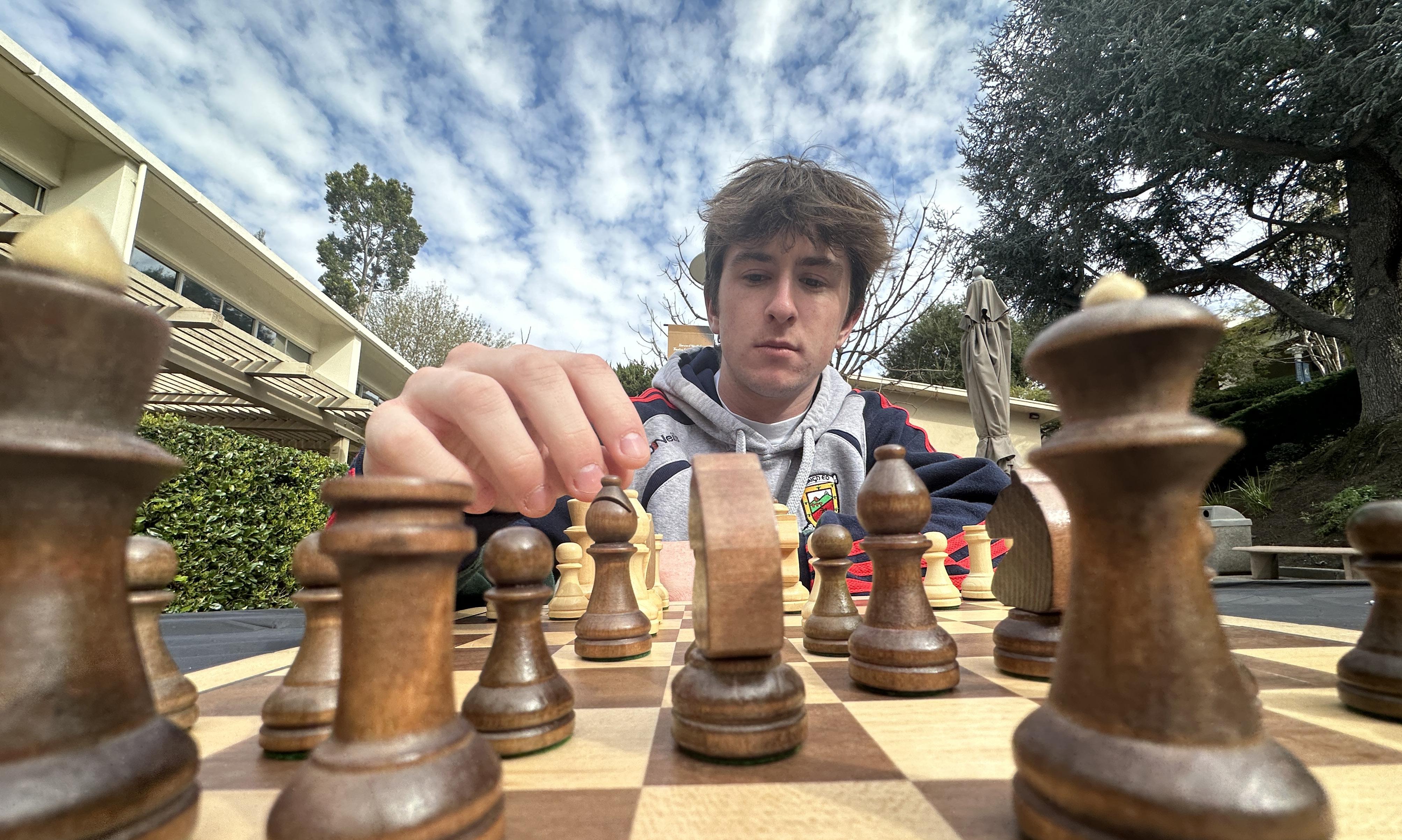
Chess was no longer a game I felt belonged only to me. I felt included in a broader community as I continued to play more frequently with friends, or even with strangers online. Discussing theory with friends and playing them consistently, and sharpening the different lines I played, led to a significant improvement in my skill level and dramatically increased the proportion of games I was winning. Having a casual outlet to talk through different moves with my good friends
helped me to better remember new ideas I was studying. During the summer of my sophomore year, as my interest in chess continued to grow, I finally began to focus on my rating. As I began to win more consistently, my rating began to climb.
Throughout my junior year, I expanded the circle of people I knew who played chess. I was amazed by the number of individuals—including classmates, teachers and even parents—I was meeting with whom I shared this common passion. I was disappointed that a school tournament had not been organized during high school career, but heading into this school year, I had confidence that senior prefect Rowan Jen '23 would get the job done.
When I first witnessed the row of chess boards set up across the quad, I realized the tournament would be a much bigger deal than the previous one. I had never played matches on the board with time control, and the audience was a fun addition to gameplay that I had never experienced before. In the opening rounds, I played relatively well, except for one queen blunder, which frankly could not have been a more miscalculated move. When the final bracket was released, I was thrilled to have made the tournament and confident that I could succeed as long as I didn’t make any simple mistakes. My first match went smoothly, but the second was much closer. The championship match was particularly exciting because I was once again matched up with Jake, who I had not played since he wiped the floor with me in the last tournament. The large audience spectating made it difficult to focus and until the late middle game, I was struggling to see a way to win. Jake was heavily pressuring my right side and a pawn on the h7 square was killing any hopes of my king's escape. After one or two stalling check moves I somehow forked his rook and his king, ending all hopes of an attack and soon after winning the match.
Ever since the tournament, more people I never knew played chess reached out to me, and I’ve now played matches against numerous new opponents. Ultimately, at the end of all this, I feel incredibly lucky to have participated in an event that encouraged fun and competitive games, inspiring a lot of students to continue refining their chess skills or even attempting to pick up the game.
Feb. 8, 2023 D4 Sports The Chronicle
PAUL KURGAN/CHRONICLE
BY








 PRINTED WITH PERMISSION OF OLIVIA SUDDLESON
PRINTED WITH PERMISSION OF OLIVIA SUDDLESON





 By Olivia Phillips
By Olivia Phillips










 By Everett Lakey
By Everett Lakey












 By Alden Detmer
By Alden Detmer





























































 By Lucas Cohen-D’Arbeloff
By Lucas Cohen-D’Arbeloff




















 By Christopher Mo
By Christopher Mo





